Waste Management, Biogas Potential and Challenges in Accra, Ghana
VerifiedAdded on 2023/06/13
|61
|18285
|209
Report
AI Summary
This report provides a comprehensive analysis of waste management challenges in Accra, Ghana, focusing on the potential for biogas production as a sustainable energy source. It highlights the problems stemming from rapid urbanization, inadequate waste collection, and ineffective sewage treatment. The study explores the lack of resources, weak institutional capacity, and negative public attitudes that hinder effective waste management. It further discusses the rationale for biogas as a clean energy alternative, addressing issues related to indoor air pollution from traditional fuel sources. The report investigates various themes related to stakeholder communication, obligations, and the purpose of waste management activities, ultimately offering recommendations for improved education, infrastructure, and policy implementation to promote sustainable waste management practices in Accra.
Contribute Materials
Your contribution can guide someone’s learning journey. Share your
documents today.
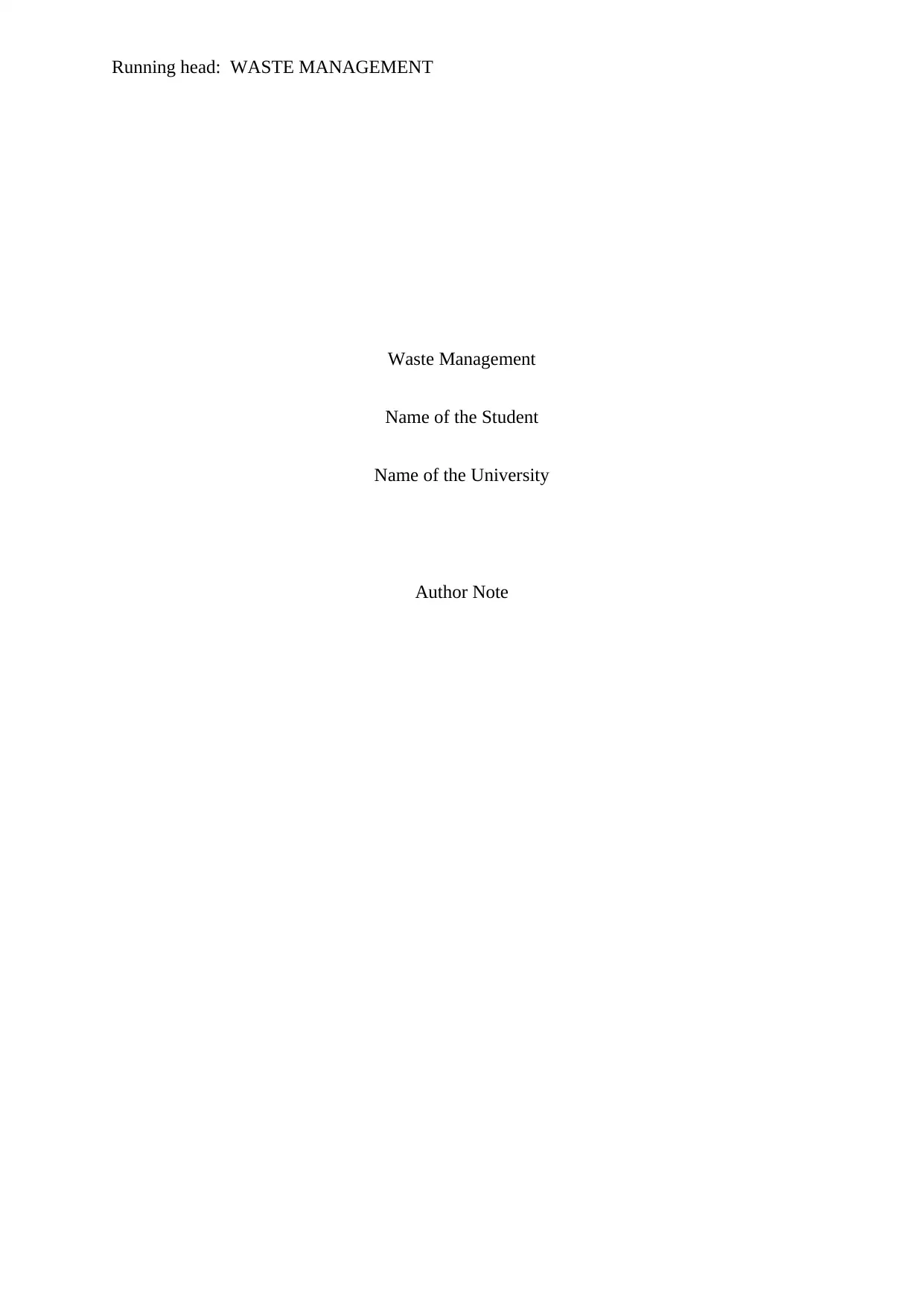
Running head: WASTE MANAGEMENT
Waste Management
Name of the Student
Name of the University
Author Note
Waste Management
Name of the Student
Name of the University
Author Note
Secure Best Marks with AI Grader
Need help grading? Try our AI Grader for instant feedback on your assignments.
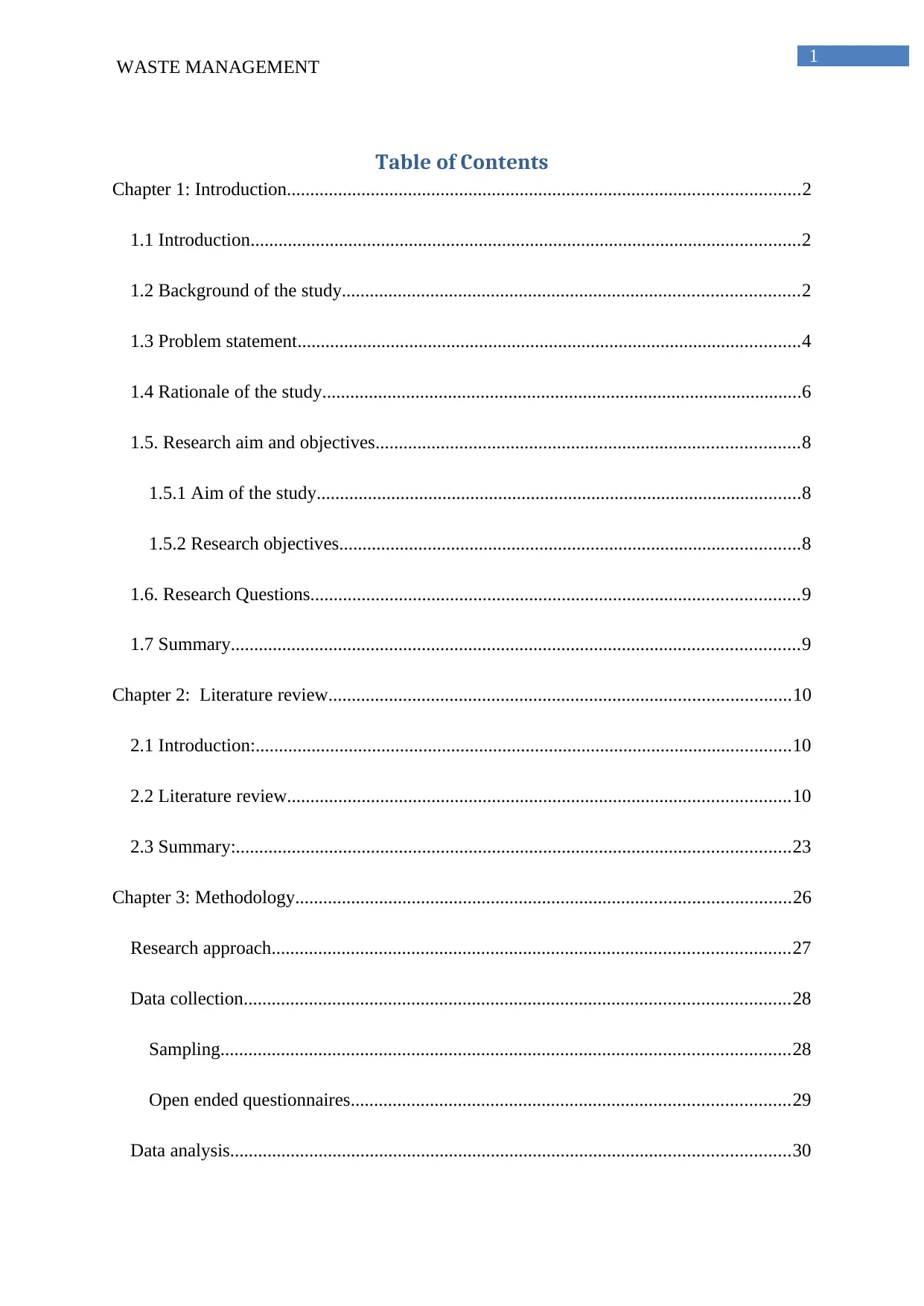
1
WASTE MANAGEMENT
Table of Contents
Chapter 1: Introduction..............................................................................................................2
1.1 Introduction......................................................................................................................2
1.2 Background of the study..................................................................................................2
1.3 Problem statement............................................................................................................4
1.4 Rationale of the study.......................................................................................................6
1.5. Research aim and objectives...........................................................................................8
1.5.1 Aim of the study........................................................................................................8
1.5.2 Research objectives...................................................................................................8
1.6. Research Questions.........................................................................................................9
1.7 Summary..........................................................................................................................9
Chapter 2: Literature review...................................................................................................10
2.1 Introduction:...................................................................................................................10
2.2 Literature review............................................................................................................10
2.3 Summary:.......................................................................................................................23
Chapter 3: Methodology..........................................................................................................26
Research approach...............................................................................................................27
Data collection.....................................................................................................................28
Sampling..........................................................................................................................28
Open ended questionnaires..............................................................................................29
Data analysis........................................................................................................................30
WASTE MANAGEMENT
Table of Contents
Chapter 1: Introduction..............................................................................................................2
1.1 Introduction......................................................................................................................2
1.2 Background of the study..................................................................................................2
1.3 Problem statement............................................................................................................4
1.4 Rationale of the study.......................................................................................................6
1.5. Research aim and objectives...........................................................................................8
1.5.1 Aim of the study........................................................................................................8
1.5.2 Research objectives...................................................................................................8
1.6. Research Questions.........................................................................................................9
1.7 Summary..........................................................................................................................9
Chapter 2: Literature review...................................................................................................10
2.1 Introduction:...................................................................................................................10
2.2 Literature review............................................................................................................10
2.3 Summary:.......................................................................................................................23
Chapter 3: Methodology..........................................................................................................26
Research approach...............................................................................................................27
Data collection.....................................................................................................................28
Sampling..........................................................................................................................28
Open ended questionnaires..............................................................................................29
Data analysis........................................................................................................................30
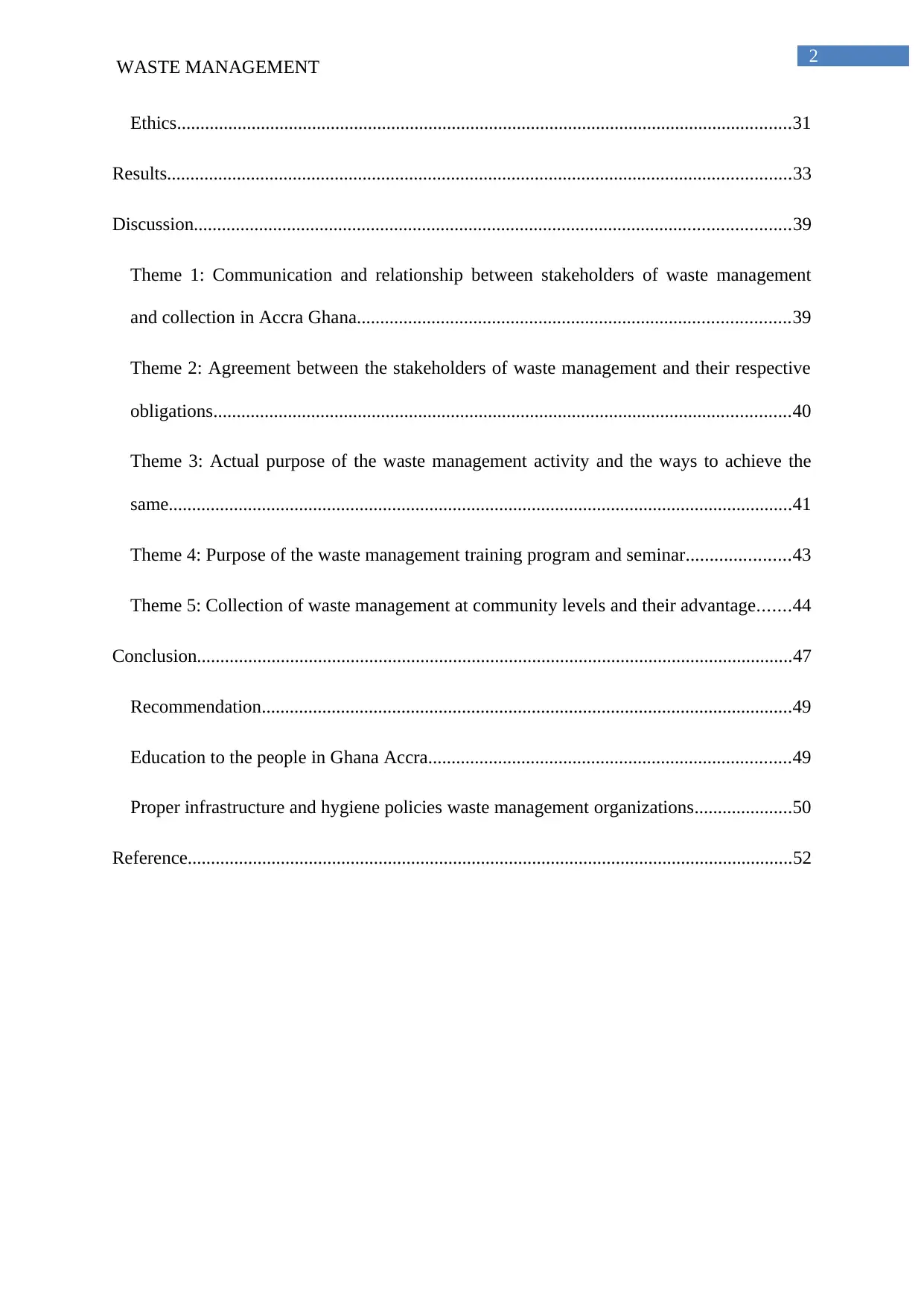
2
WASTE MANAGEMENT
Ethics....................................................................................................................................31
Results......................................................................................................................................33
Discussion................................................................................................................................39
Theme 1: Communication and relationship between stakeholders of waste management
and collection in Accra Ghana.............................................................................................39
Theme 2: Agreement between the stakeholders of waste management and their respective
obligations............................................................................................................................40
Theme 3: Actual purpose of the waste management activity and the ways to achieve the
same......................................................................................................................................41
Theme 4: Purpose of the waste management training program and seminar......................43
Theme 5: Collection of waste management at community levels and their advantage.......44
Conclusion................................................................................................................................47
Recommendation..................................................................................................................49
Education to the people in Ghana Accra..............................................................................49
Proper infrastructure and hygiene policies waste management organizations.....................50
Reference..................................................................................................................................52
WASTE MANAGEMENT
Ethics....................................................................................................................................31
Results......................................................................................................................................33
Discussion................................................................................................................................39
Theme 1: Communication and relationship between stakeholders of waste management
and collection in Accra Ghana.............................................................................................39
Theme 2: Agreement between the stakeholders of waste management and their respective
obligations............................................................................................................................40
Theme 3: Actual purpose of the waste management activity and the ways to achieve the
same......................................................................................................................................41
Theme 4: Purpose of the waste management training program and seminar......................43
Theme 5: Collection of waste management at community levels and their advantage.......44
Conclusion................................................................................................................................47
Recommendation..................................................................................................................49
Education to the people in Ghana Accra..............................................................................49
Proper infrastructure and hygiene policies waste management organizations.....................50
Reference..................................................................................................................................52
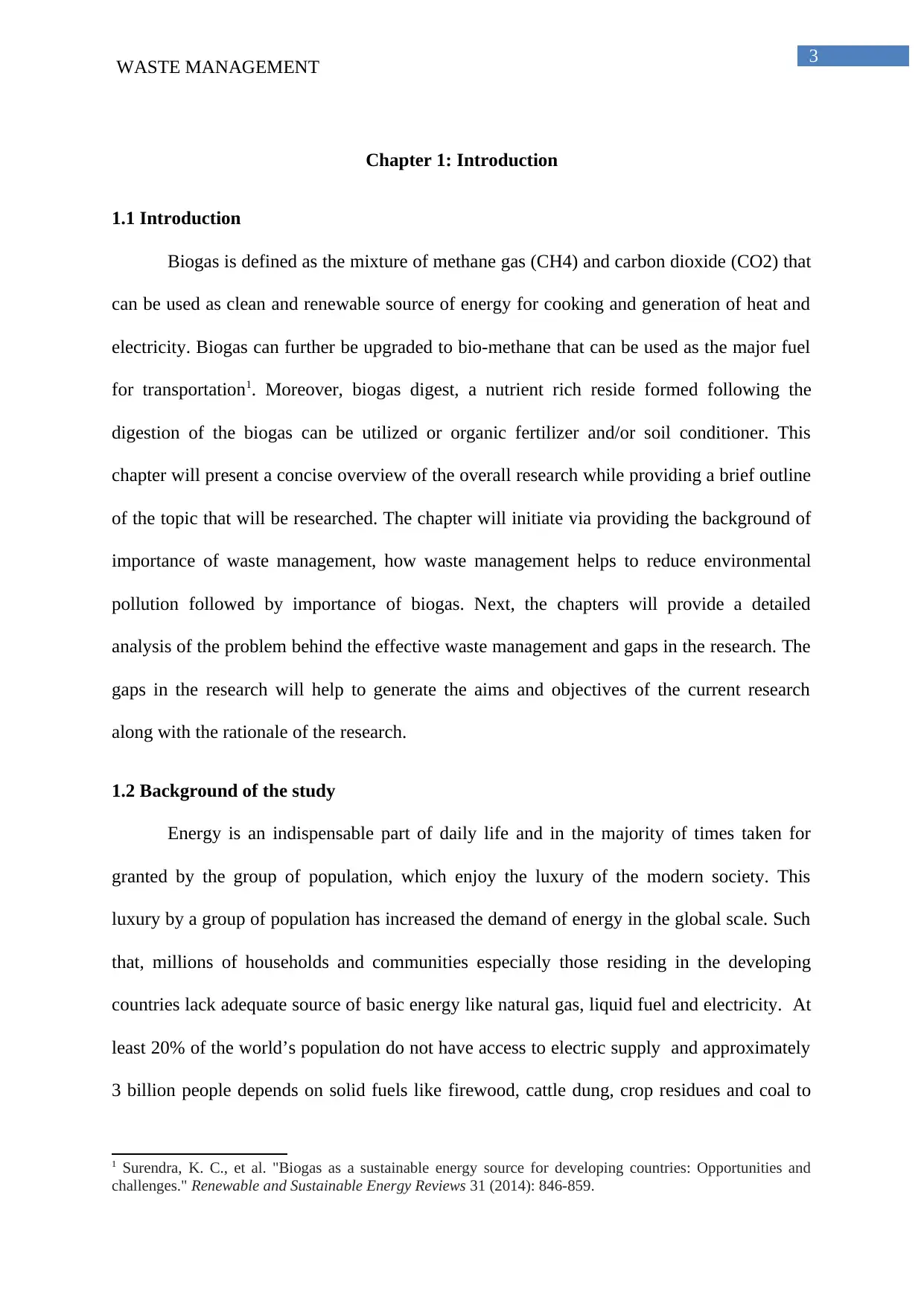
3
WASTE MANAGEMENT
Chapter 1: Introduction
1.1 Introduction
Biogas is defined as the mixture of methane gas (CH4) and carbon dioxide (CO2) that
can be used as clean and renewable source of energy for cooking and generation of heat and
electricity. Biogas can further be upgraded to bio-methane that can be used as the major fuel
for transportation1. Moreover, biogas digest, a nutrient rich reside formed following the
digestion of the biogas can be utilized or organic fertilizer and/or soil conditioner. This
chapter will present a concise overview of the overall research while providing a brief outline
of the topic that will be researched. The chapter will initiate via providing the background of
importance of waste management, how waste management helps to reduce environmental
pollution followed by importance of biogas. Next, the chapters will provide a detailed
analysis of the problem behind the effective waste management and gaps in the research. The
gaps in the research will help to generate the aims and objectives of the current research
along with the rationale of the research.
1.2 Background of the study
Energy is an indispensable part of daily life and in the majority of times taken for
granted by the group of population, which enjoy the luxury of the modern society. This
luxury by a group of population has increased the demand of energy in the global scale. Such
that, millions of households and communities especially those residing in the developing
countries lack adequate source of basic energy like natural gas, liquid fuel and electricity. At
least 20% of the world’s population do not have access to electric supply and approximately
3 billion people depends on solid fuels like firewood, cattle dung, crop residues and coal to
1 Surendra, K. C., et al. "Biogas as a sustainable energy source for developing countries: Opportunities and
challenges." Renewable and Sustainable Energy Reviews 31 (2014): 846-859.
WASTE MANAGEMENT
Chapter 1: Introduction
1.1 Introduction
Biogas is defined as the mixture of methane gas (CH4) and carbon dioxide (CO2) that
can be used as clean and renewable source of energy for cooking and generation of heat and
electricity. Biogas can further be upgraded to bio-methane that can be used as the major fuel
for transportation1. Moreover, biogas digest, a nutrient rich reside formed following the
digestion of the biogas can be utilized or organic fertilizer and/or soil conditioner. This
chapter will present a concise overview of the overall research while providing a brief outline
of the topic that will be researched. The chapter will initiate via providing the background of
importance of waste management, how waste management helps to reduce environmental
pollution followed by importance of biogas. Next, the chapters will provide a detailed
analysis of the problem behind the effective waste management and gaps in the research. The
gaps in the research will help to generate the aims and objectives of the current research
along with the rationale of the research.
1.2 Background of the study
Energy is an indispensable part of daily life and in the majority of times taken for
granted by the group of population, which enjoy the luxury of the modern society. This
luxury by a group of population has increased the demand of energy in the global scale. Such
that, millions of households and communities especially those residing in the developing
countries lack adequate source of basic energy like natural gas, liquid fuel and electricity. At
least 20% of the world’s population do not have access to electric supply and approximately
3 billion people depends on solid fuels like firewood, cattle dung, crop residues and coal to
1 Surendra, K. C., et al. "Biogas as a sustainable energy source for developing countries: Opportunities and
challenges." Renewable and Sustainable Energy Reviews 31 (2014): 846-859.
Secure Best Marks with AI Grader
Need help grading? Try our AI Grader for instant feedback on your assignments.
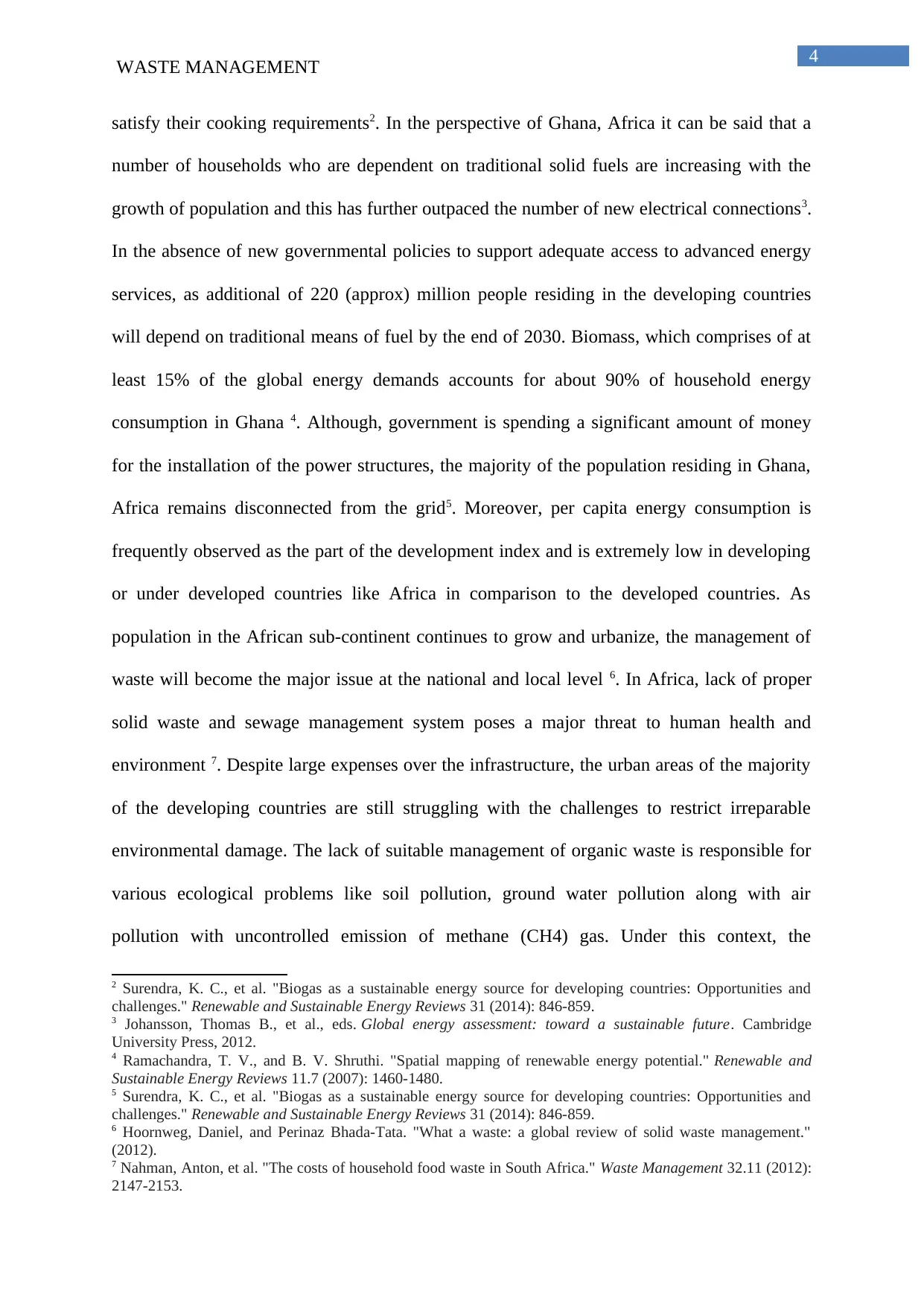
4
WASTE MANAGEMENT
satisfy their cooking requirements2. In the perspective of Ghana, Africa it can be said that a
number of households who are dependent on traditional solid fuels are increasing with the
growth of population and this has further outpaced the number of new electrical connections3.
In the absence of new governmental policies to support adequate access to advanced energy
services, as additional of 220 (approx) million people residing in the developing countries
will depend on traditional means of fuel by the end of 2030. Biomass, which comprises of at
least 15% of the global energy demands accounts for about 90% of household energy
consumption in Ghana 4. Although, government is spending a significant amount of money
for the installation of the power structures, the majority of the population residing in Ghana,
Africa remains disconnected from the grid5. Moreover, per capita energy consumption is
frequently observed as the part of the development index and is extremely low in developing
or under developed countries like Africa in comparison to the developed countries. As
population in the African sub-continent continues to grow and urbanize, the management of
waste will become the major issue at the national and local level 6. In Africa, lack of proper
solid waste and sewage management system poses a major threat to human health and
environment 7. Despite large expenses over the infrastructure, the urban areas of the majority
of the developing countries are still struggling with the challenges to restrict irreparable
environmental damage. The lack of suitable management of organic waste is responsible for
various ecological problems like soil pollution, ground water pollution along with air
pollution with uncontrolled emission of methane (CH4) gas. Under this context, the
2 Surendra, K. C., et al. "Biogas as a sustainable energy source for developing countries: Opportunities and
challenges." Renewable and Sustainable Energy Reviews 31 (2014): 846-859.
3 Johansson, Thomas B., et al., eds. Global energy assessment: toward a sustainable future. Cambridge
University Press, 2012.
4 Ramachandra, T. V., and B. V. Shruthi. "Spatial mapping of renewable energy potential." Renewable and
Sustainable Energy Reviews 11.7 (2007): 1460-1480.
5 Surendra, K. C., et al. "Biogas as a sustainable energy source for developing countries: Opportunities and
challenges." Renewable and Sustainable Energy Reviews 31 (2014): 846-859.
6 Hoornweg, Daniel, and Perinaz Bhada-Tata. "What a waste: a global review of solid waste management."
(2012).
7 Nahman, Anton, et al. "The costs of household food waste in South Africa." Waste Management 32.11 (2012):
2147-2153.
WASTE MANAGEMENT
satisfy their cooking requirements2. In the perspective of Ghana, Africa it can be said that a
number of households who are dependent on traditional solid fuels are increasing with the
growth of population and this has further outpaced the number of new electrical connections3.
In the absence of new governmental policies to support adequate access to advanced energy
services, as additional of 220 (approx) million people residing in the developing countries
will depend on traditional means of fuel by the end of 2030. Biomass, which comprises of at
least 15% of the global energy demands accounts for about 90% of household energy
consumption in Ghana 4. Although, government is spending a significant amount of money
for the installation of the power structures, the majority of the population residing in Ghana,
Africa remains disconnected from the grid5. Moreover, per capita energy consumption is
frequently observed as the part of the development index and is extremely low in developing
or under developed countries like Africa in comparison to the developed countries. As
population in the African sub-continent continues to grow and urbanize, the management of
waste will become the major issue at the national and local level 6. In Africa, lack of proper
solid waste and sewage management system poses a major threat to human health and
environment 7. Despite large expenses over the infrastructure, the urban areas of the majority
of the developing countries are still struggling with the challenges to restrict irreparable
environmental damage. The lack of suitable management of organic waste is responsible for
various ecological problems like soil pollution, ground water pollution along with air
pollution with uncontrolled emission of methane (CH4) gas. Under this context, the
2 Surendra, K. C., et al. "Biogas as a sustainable energy source for developing countries: Opportunities and
challenges." Renewable and Sustainable Energy Reviews 31 (2014): 846-859.
3 Johansson, Thomas B., et al., eds. Global energy assessment: toward a sustainable future. Cambridge
University Press, 2012.
4 Ramachandra, T. V., and B. V. Shruthi. "Spatial mapping of renewable energy potential." Renewable and
Sustainable Energy Reviews 11.7 (2007): 1460-1480.
5 Surendra, K. C., et al. "Biogas as a sustainable energy source for developing countries: Opportunities and
challenges." Renewable and Sustainable Energy Reviews 31 (2014): 846-859.
6 Hoornweg, Daniel, and Perinaz Bhada-Tata. "What a waste: a global review of solid waste management."
(2012).
7 Nahman, Anton, et al. "The costs of household food waste in South Africa." Waste Management 32.11 (2012):
2147-2153.
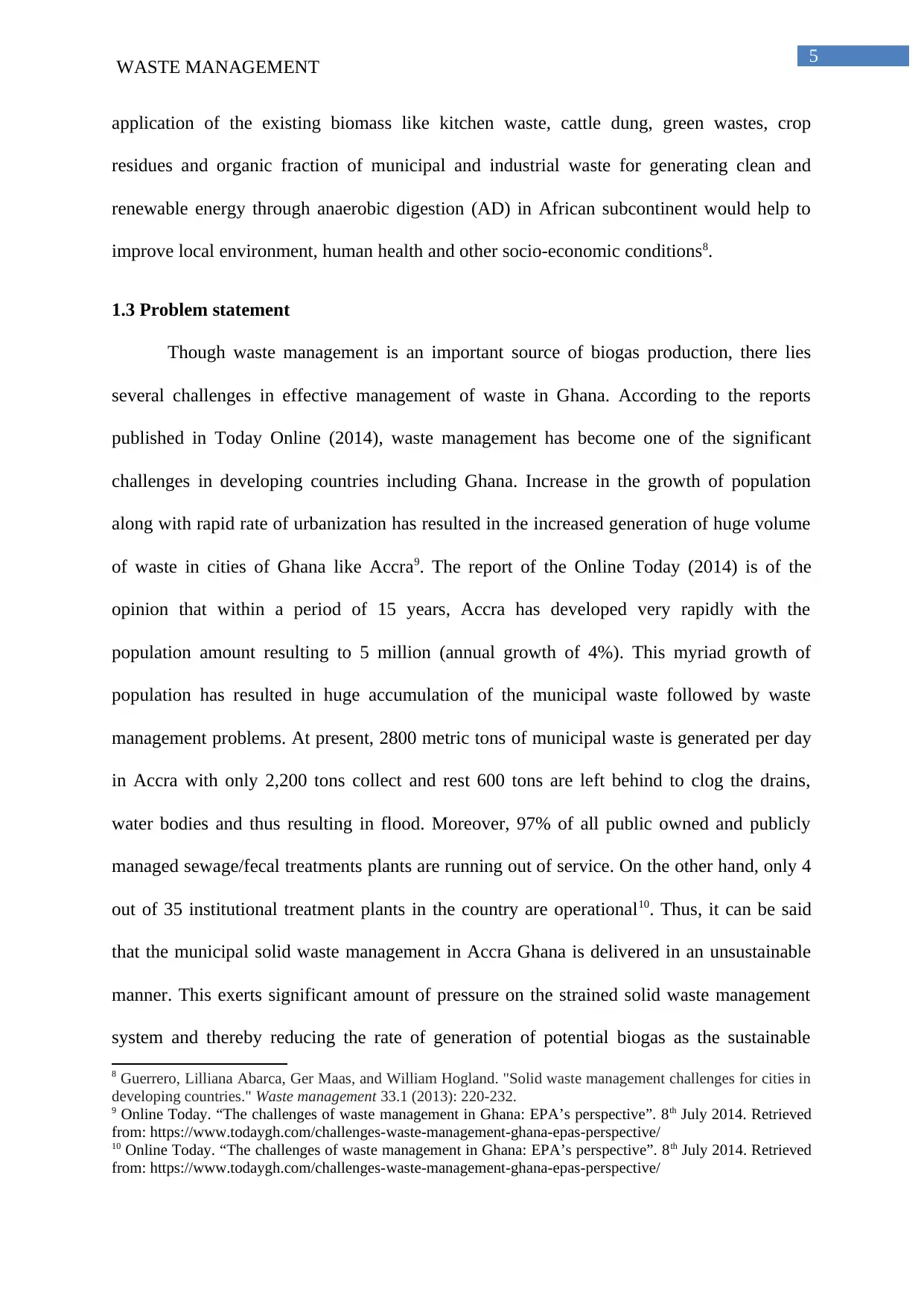
5
WASTE MANAGEMENT
application of the existing biomass like kitchen waste, cattle dung, green wastes, crop
residues and organic fraction of municipal and industrial waste for generating clean and
renewable energy through anaerobic digestion (AD) in African subcontinent would help to
improve local environment, human health and other socio-economic conditions8.
1.3 Problem statement
Though waste management is an important source of biogas production, there lies
several challenges in effective management of waste in Ghana. According to the reports
published in Today Online (2014), waste management has become one of the significant
challenges in developing countries including Ghana. Increase in the growth of population
along with rapid rate of urbanization has resulted in the increased generation of huge volume
of waste in cities of Ghana like Accra9. The report of the Online Today (2014) is of the
opinion that within a period of 15 years, Accra has developed very rapidly with the
population amount resulting to 5 million (annual growth of 4%). This myriad growth of
population has resulted in huge accumulation of the municipal waste followed by waste
management problems. At present, 2800 metric tons of municipal waste is generated per day
in Accra with only 2,200 tons collect and rest 600 tons are left behind to clog the drains,
water bodies and thus resulting in flood. Moreover, 97% of all public owned and publicly
managed sewage/fecal treatments plants are running out of service. On the other hand, only 4
out of 35 institutional treatment plants in the country are operational10. Thus, it can be said
that the municipal solid waste management in Accra Ghana is delivered in an unsustainable
manner. This exerts significant amount of pressure on the strained solid waste management
system and thereby reducing the rate of generation of potential biogas as the sustainable
8 Guerrero, Lilliana Abarca, Ger Maas, and William Hogland. "Solid waste management challenges for cities in
developing countries." Waste management 33.1 (2013): 220-232.
9 Online Today. “The challenges of waste management in Ghana: EPA’s perspective”. 8th July 2014. Retrieved
from: https://www.todaygh.com/challenges-waste-management-ghana-epas-perspective/
10 Online Today. “The challenges of waste management in Ghana: EPA’s perspective”. 8th July 2014. Retrieved
from: https://www.todaygh.com/challenges-waste-management-ghana-epas-perspective/
WASTE MANAGEMENT
application of the existing biomass like kitchen waste, cattle dung, green wastes, crop
residues and organic fraction of municipal and industrial waste for generating clean and
renewable energy through anaerobic digestion (AD) in African subcontinent would help to
improve local environment, human health and other socio-economic conditions8.
1.3 Problem statement
Though waste management is an important source of biogas production, there lies
several challenges in effective management of waste in Ghana. According to the reports
published in Today Online (2014), waste management has become one of the significant
challenges in developing countries including Ghana. Increase in the growth of population
along with rapid rate of urbanization has resulted in the increased generation of huge volume
of waste in cities of Ghana like Accra9. The report of the Online Today (2014) is of the
opinion that within a period of 15 years, Accra has developed very rapidly with the
population amount resulting to 5 million (annual growth of 4%). This myriad growth of
population has resulted in huge accumulation of the municipal waste followed by waste
management problems. At present, 2800 metric tons of municipal waste is generated per day
in Accra with only 2,200 tons collect and rest 600 tons are left behind to clog the drains,
water bodies and thus resulting in flood. Moreover, 97% of all public owned and publicly
managed sewage/fecal treatments plants are running out of service. On the other hand, only 4
out of 35 institutional treatment plants in the country are operational10. Thus, it can be said
that the municipal solid waste management in Accra Ghana is delivered in an unsustainable
manner. This exerts significant amount of pressure on the strained solid waste management
system and thereby reducing the rate of generation of potential biogas as the sustainable
8 Guerrero, Lilliana Abarca, Ger Maas, and William Hogland. "Solid waste management challenges for cities in
developing countries." Waste management 33.1 (2013): 220-232.
9 Online Today. “The challenges of waste management in Ghana: EPA’s perspective”. 8th July 2014. Retrieved
from: https://www.todaygh.com/challenges-waste-management-ghana-epas-perspective/
10 Online Today. “The challenges of waste management in Ghana: EPA’s perspective”. 8th July 2014. Retrieved
from: https://www.todaygh.com/challenges-waste-management-ghana-epas-perspective/
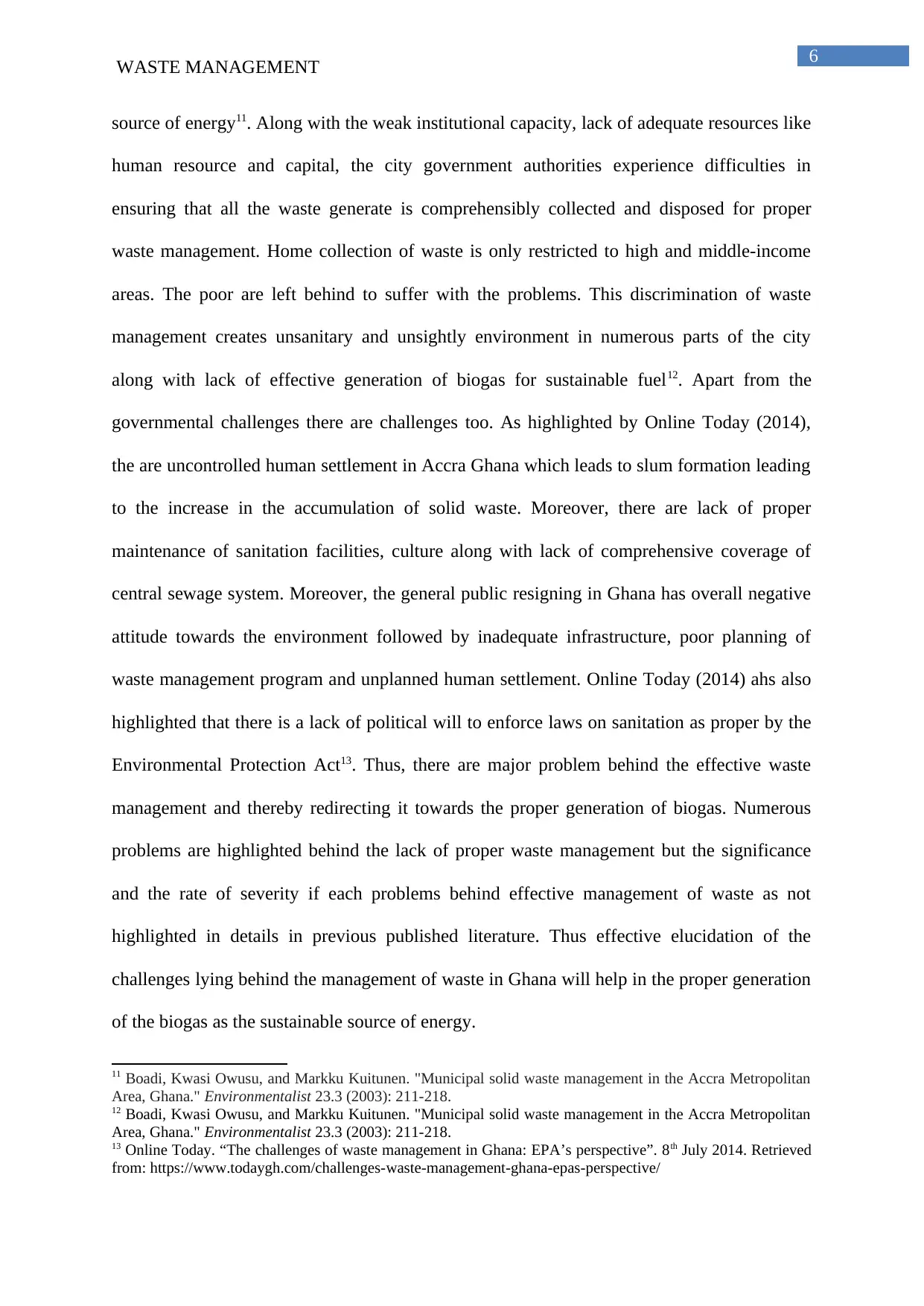
6
WASTE MANAGEMENT
source of energy11. Along with the weak institutional capacity, lack of adequate resources like
human resource and capital, the city government authorities experience difficulties in
ensuring that all the waste generate is comprehensibly collected and disposed for proper
waste management. Home collection of waste is only restricted to high and middle-income
areas. The poor are left behind to suffer with the problems. This discrimination of waste
management creates unsanitary and unsightly environment in numerous parts of the city
along with lack of effective generation of biogas for sustainable fuel12. Apart from the
governmental challenges there are challenges too. As highlighted by Online Today (2014),
the are uncontrolled human settlement in Accra Ghana which leads to slum formation leading
to the increase in the accumulation of solid waste. Moreover, there are lack of proper
maintenance of sanitation facilities, culture along with lack of comprehensive coverage of
central sewage system. Moreover, the general public resigning in Ghana has overall negative
attitude towards the environment followed by inadequate infrastructure, poor planning of
waste management program and unplanned human settlement. Online Today (2014) ahs also
highlighted that there is a lack of political will to enforce laws on sanitation as proper by the
Environmental Protection Act13. Thus, there are major problem behind the effective waste
management and thereby redirecting it towards the proper generation of biogas. Numerous
problems are highlighted behind the lack of proper waste management but the significance
and the rate of severity if each problems behind effective management of waste as not
highlighted in details in previous published literature. Thus effective elucidation of the
challenges lying behind the management of waste in Ghana will help in the proper generation
of the biogas as the sustainable source of energy.
11 Boadi, Kwasi Owusu, and Markku Kuitunen. "Municipal solid waste management in the Accra Metropolitan
Area, Ghana." Environmentalist 23.3 (2003): 211-218.
12 Boadi, Kwasi Owusu, and Markku Kuitunen. "Municipal solid waste management in the Accra Metropolitan
Area, Ghana." Environmentalist 23.3 (2003): 211-218.
13 Online Today. “The challenges of waste management in Ghana: EPA’s perspective”. 8th July 2014. Retrieved
from: https://www.todaygh.com/challenges-waste-management-ghana-epas-perspective/
WASTE MANAGEMENT
source of energy11. Along with the weak institutional capacity, lack of adequate resources like
human resource and capital, the city government authorities experience difficulties in
ensuring that all the waste generate is comprehensibly collected and disposed for proper
waste management. Home collection of waste is only restricted to high and middle-income
areas. The poor are left behind to suffer with the problems. This discrimination of waste
management creates unsanitary and unsightly environment in numerous parts of the city
along with lack of effective generation of biogas for sustainable fuel12. Apart from the
governmental challenges there are challenges too. As highlighted by Online Today (2014),
the are uncontrolled human settlement in Accra Ghana which leads to slum formation leading
to the increase in the accumulation of solid waste. Moreover, there are lack of proper
maintenance of sanitation facilities, culture along with lack of comprehensive coverage of
central sewage system. Moreover, the general public resigning in Ghana has overall negative
attitude towards the environment followed by inadequate infrastructure, poor planning of
waste management program and unplanned human settlement. Online Today (2014) ahs also
highlighted that there is a lack of political will to enforce laws on sanitation as proper by the
Environmental Protection Act13. Thus, there are major problem behind the effective waste
management and thereby redirecting it towards the proper generation of biogas. Numerous
problems are highlighted behind the lack of proper waste management but the significance
and the rate of severity if each problems behind effective management of waste as not
highlighted in details in previous published literature. Thus effective elucidation of the
challenges lying behind the management of waste in Ghana will help in the proper generation
of the biogas as the sustainable source of energy.
11 Boadi, Kwasi Owusu, and Markku Kuitunen. "Municipal solid waste management in the Accra Metropolitan
Area, Ghana." Environmentalist 23.3 (2003): 211-218.
12 Boadi, Kwasi Owusu, and Markku Kuitunen. "Municipal solid waste management in the Accra Metropolitan
Area, Ghana." Environmentalist 23.3 (2003): 211-218.
13 Online Today. “The challenges of waste management in Ghana: EPA’s perspective”. 8th July 2014. Retrieved
from: https://www.todaygh.com/challenges-waste-management-ghana-epas-perspective/
Paraphrase This Document
Need a fresh take? Get an instant paraphrase of this document with our AI Paraphraser
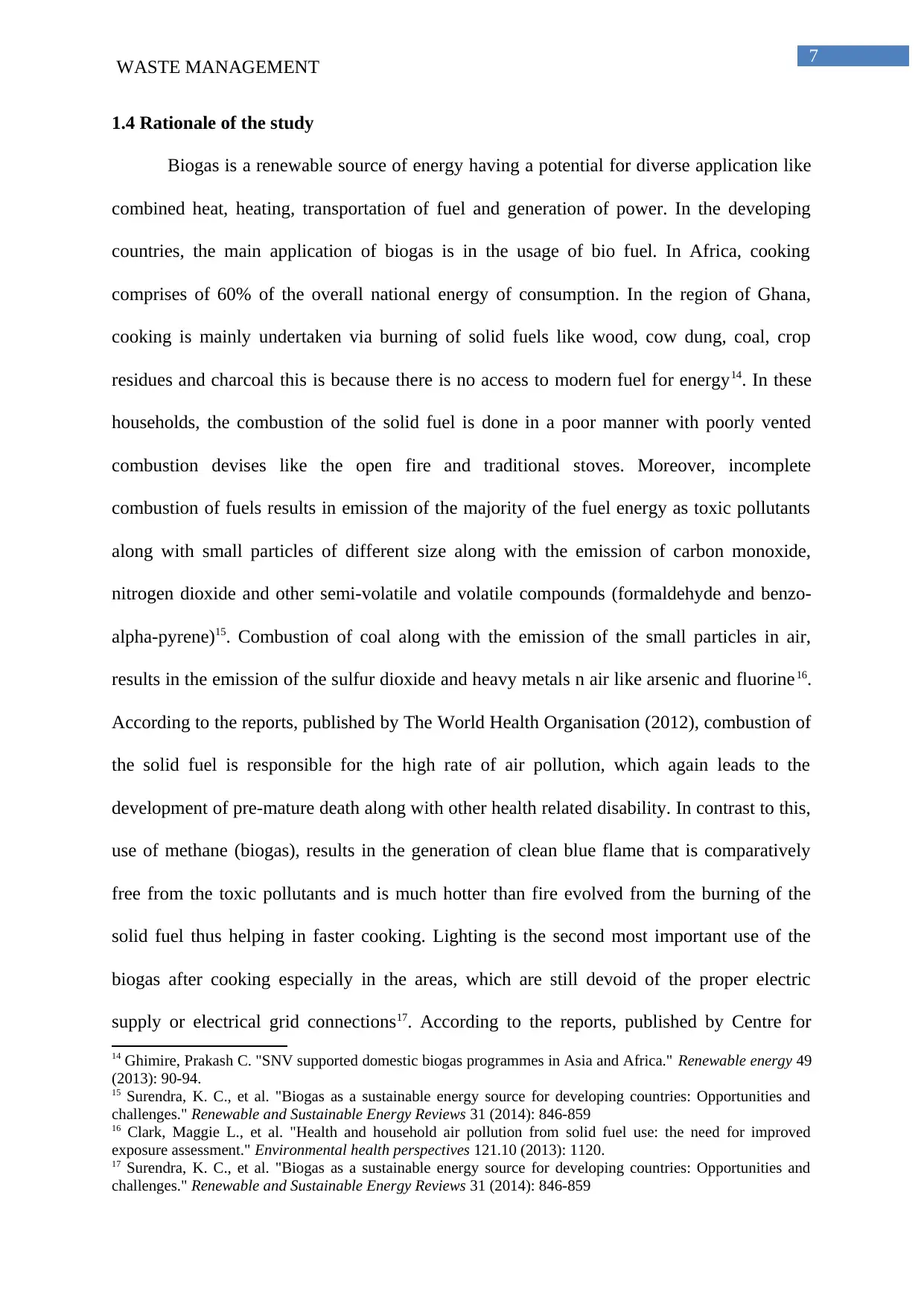
7
WASTE MANAGEMENT
1.4 Rationale of the study
Biogas is a renewable source of energy having a potential for diverse application like
combined heat, heating, transportation of fuel and generation of power. In the developing
countries, the main application of biogas is in the usage of bio fuel. In Africa, cooking
comprises of 60% of the overall national energy of consumption. In the region of Ghana,
cooking is mainly undertaken via burning of solid fuels like wood, cow dung, coal, crop
residues and charcoal this is because there is no access to modern fuel for energy14. In these
households, the combustion of the solid fuel is done in a poor manner with poorly vented
combustion devises like the open fire and traditional stoves. Moreover, incomplete
combustion of fuels results in emission of the majority of the fuel energy as toxic pollutants
along with small particles of different size along with the emission of carbon monoxide,
nitrogen dioxide and other semi-volatile and volatile compounds (formaldehyde and benzo-
alpha-pyrene)15. Combustion of coal along with the emission of the small particles in air,
results in the emission of the sulfur dioxide and heavy metals n air like arsenic and fluorine16.
According to the reports, published by The World Health Organisation (2012), combustion of
the solid fuel is responsible for the high rate of air pollution, which again leads to the
development of pre-mature death along with other health related disability. In contrast to this,
use of methane (biogas), results in the generation of clean blue flame that is comparatively
free from the toxic pollutants and is much hotter than fire evolved from the burning of the
solid fuel thus helping in faster cooking. Lighting is the second most important use of the
biogas after cooking especially in the areas, which are still devoid of the proper electric
supply or electrical grid connections17. According to the reports, published by Centre for
14 Ghimire, Prakash C. "SNV supported domestic biogas programmes in Asia and Africa." Renewable energy 49
(2013): 90-94.
15 Surendra, K. C., et al. "Biogas as a sustainable energy source for developing countries: Opportunities and
challenges." Renewable and Sustainable Energy Reviews 31 (2014): 846-859
16 Clark, Maggie L., et al. "Health and household air pollution from solid fuel use: the need for improved
exposure assessment." Environmental health perspectives 121.10 (2013): 1120.
17 Surendra, K. C., et al. "Biogas as a sustainable energy source for developing countries: Opportunities and
challenges." Renewable and Sustainable Energy Reviews 31 (2014): 846-859
WASTE MANAGEMENT
1.4 Rationale of the study
Biogas is a renewable source of energy having a potential for diverse application like
combined heat, heating, transportation of fuel and generation of power. In the developing
countries, the main application of biogas is in the usage of bio fuel. In Africa, cooking
comprises of 60% of the overall national energy of consumption. In the region of Ghana,
cooking is mainly undertaken via burning of solid fuels like wood, cow dung, coal, crop
residues and charcoal this is because there is no access to modern fuel for energy14. In these
households, the combustion of the solid fuel is done in a poor manner with poorly vented
combustion devises like the open fire and traditional stoves. Moreover, incomplete
combustion of fuels results in emission of the majority of the fuel energy as toxic pollutants
along with small particles of different size along with the emission of carbon monoxide,
nitrogen dioxide and other semi-volatile and volatile compounds (formaldehyde and benzo-
alpha-pyrene)15. Combustion of coal along with the emission of the small particles in air,
results in the emission of the sulfur dioxide and heavy metals n air like arsenic and fluorine16.
According to the reports, published by The World Health Organisation (2012), combustion of
the solid fuel is responsible for the high rate of air pollution, which again leads to the
development of pre-mature death along with other health related disability. In contrast to this,
use of methane (biogas), results in the generation of clean blue flame that is comparatively
free from the toxic pollutants and is much hotter than fire evolved from the burning of the
solid fuel thus helping in faster cooking. Lighting is the second most important use of the
biogas after cooking especially in the areas, which are still devoid of the proper electric
supply or electrical grid connections17. According to the reports, published by Centre for
14 Ghimire, Prakash C. "SNV supported domestic biogas programmes in Asia and Africa." Renewable energy 49
(2013): 90-94.
15 Surendra, K. C., et al. "Biogas as a sustainable energy source for developing countries: Opportunities and
challenges." Renewable and Sustainable Energy Reviews 31 (2014): 846-859
16 Clark, Maggie L., et al. "Health and household air pollution from solid fuel use: the need for improved
exposure assessment." Environmental health perspectives 121.10 (2013): 1120.
17 Surendra, K. C., et al. "Biogas as a sustainable energy source for developing countries: Opportunities and
challenges." Renewable and Sustainable Energy Reviews 31 (2014): 846-859
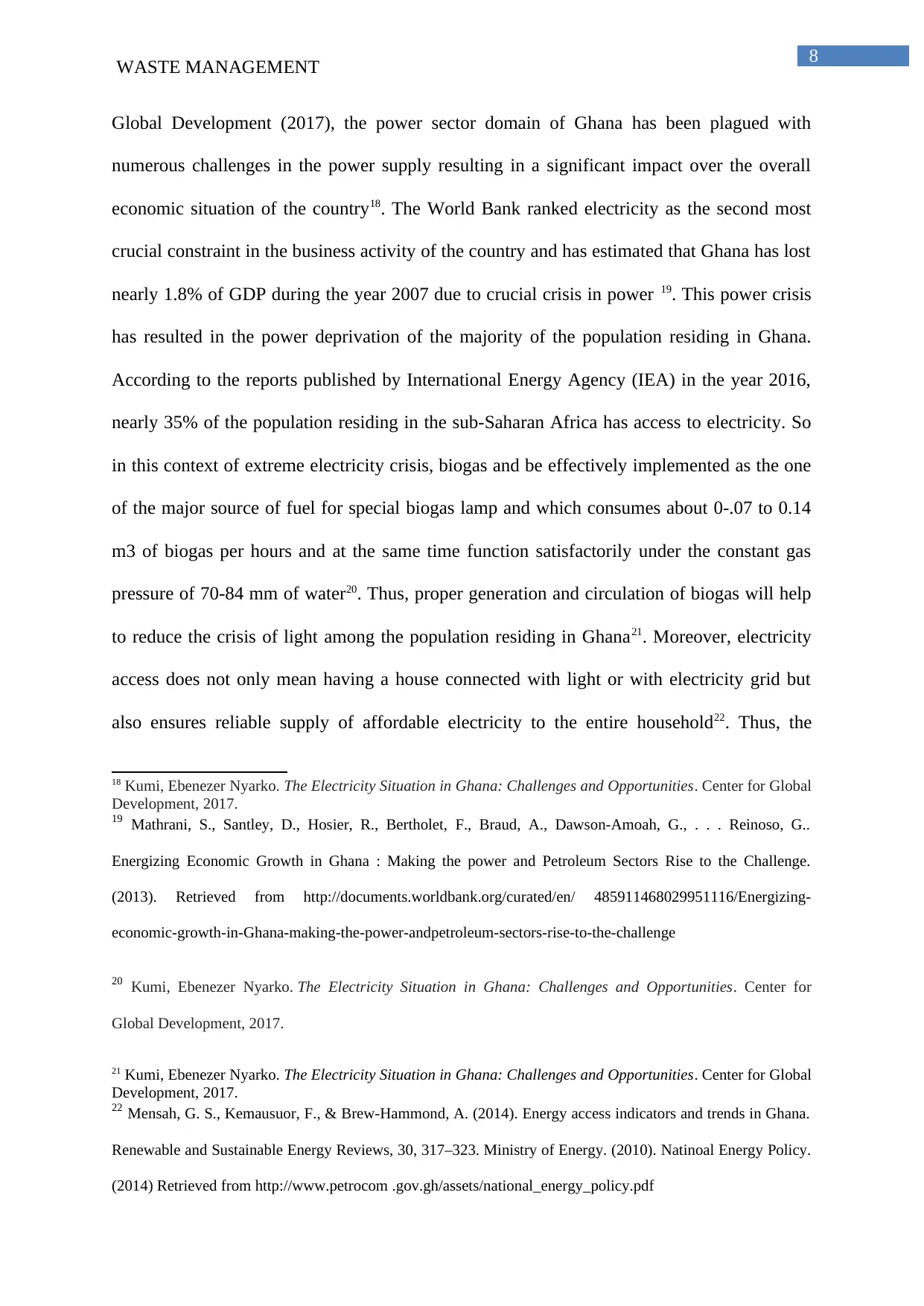
8
WASTE MANAGEMENT
Global Development (2017), the power sector domain of Ghana has been plagued with
numerous challenges in the power supply resulting in a significant impact over the overall
economic situation of the country18. The World Bank ranked electricity as the second most
crucial constraint in the business activity of the country and has estimated that Ghana has lost
nearly 1.8% of GDP during the year 2007 due to crucial crisis in power 19. This power crisis
has resulted in the power deprivation of the majority of the population residing in Ghana.
According to the reports published by International Energy Agency (IEA) in the year 2016,
nearly 35% of the population residing in the sub-Saharan Africa has access to electricity. So
in this context of extreme electricity crisis, biogas and be effectively implemented as the one
of the major source of fuel for special biogas lamp and which consumes about 0-.07 to 0.14
m3 of biogas per hours and at the same time function satisfactorily under the constant gas
pressure of 70-84 mm of water20. Thus, proper generation and circulation of biogas will help
to reduce the crisis of light among the population residing in Ghana21. Moreover, electricity
access does not only mean having a house connected with light or with electricity grid but
also ensures reliable supply of affordable electricity to the entire household22. Thus, the
18 Kumi, Ebenezer Nyarko. The Electricity Situation in Ghana: Challenges and Opportunities. Center for Global
Development, 2017.
19 Mathrani, S., Santley, D., Hosier, R., Bertholet, F., Braud, A., Dawson-Amoah, G., . . . Reinoso, G..
Energizing Economic Growth in Ghana : Making the power and Petroleum Sectors Rise to the Challenge.
(2013). Retrieved from http://documents.worldbank.org/curated/en/ 485911468029951116/Energizing-
economic-growth-in-Ghana-making-the-power-andpetroleum-sectors-rise-to-the-challenge
20 Kumi, Ebenezer Nyarko. The Electricity Situation in Ghana: Challenges and Opportunities. Center for
Global Development, 2017.
21 Kumi, Ebenezer Nyarko. The Electricity Situation in Ghana: Challenges and Opportunities. Center for Global
Development, 2017.
22 Mensah, G. S., Kemausuor, F., & Brew-Hammond, A. (2014). Energy access indicators and trends in Ghana.
Renewable and Sustainable Energy Reviews, 30, 317–323. Ministry of Energy. (2010). Natinoal Energy Policy.
(2014) Retrieved from http://www.petrocom .gov.gh/assets/national_energy_policy.pdf
WASTE MANAGEMENT
Global Development (2017), the power sector domain of Ghana has been plagued with
numerous challenges in the power supply resulting in a significant impact over the overall
economic situation of the country18. The World Bank ranked electricity as the second most
crucial constraint in the business activity of the country and has estimated that Ghana has lost
nearly 1.8% of GDP during the year 2007 due to crucial crisis in power 19. This power crisis
has resulted in the power deprivation of the majority of the population residing in Ghana.
According to the reports published by International Energy Agency (IEA) in the year 2016,
nearly 35% of the population residing in the sub-Saharan Africa has access to electricity. So
in this context of extreme electricity crisis, biogas and be effectively implemented as the one
of the major source of fuel for special biogas lamp and which consumes about 0-.07 to 0.14
m3 of biogas per hours and at the same time function satisfactorily under the constant gas
pressure of 70-84 mm of water20. Thus, proper generation and circulation of biogas will help
to reduce the crisis of light among the population residing in Ghana21. Moreover, electricity
access does not only mean having a house connected with light or with electricity grid but
also ensures reliable supply of affordable electricity to the entire household22. Thus, the
18 Kumi, Ebenezer Nyarko. The Electricity Situation in Ghana: Challenges and Opportunities. Center for Global
Development, 2017.
19 Mathrani, S., Santley, D., Hosier, R., Bertholet, F., Braud, A., Dawson-Amoah, G., . . . Reinoso, G..
Energizing Economic Growth in Ghana : Making the power and Petroleum Sectors Rise to the Challenge.
(2013). Retrieved from http://documents.worldbank.org/curated/en/ 485911468029951116/Energizing-
economic-growth-in-Ghana-making-the-power-andpetroleum-sectors-rise-to-the-challenge
20 Kumi, Ebenezer Nyarko. The Electricity Situation in Ghana: Challenges and Opportunities. Center for
Global Development, 2017.
21 Kumi, Ebenezer Nyarko. The Electricity Situation in Ghana: Challenges and Opportunities. Center for Global
Development, 2017.
22 Mensah, G. S., Kemausuor, F., & Brew-Hammond, A. (2014). Energy access indicators and trends in Ghana.
Renewable and Sustainable Energy Reviews, 30, 317–323. Ministry of Energy. (2010). Natinoal Energy Policy.
(2014) Retrieved from http://www.petrocom .gov.gh/assets/national_energy_policy.pdf
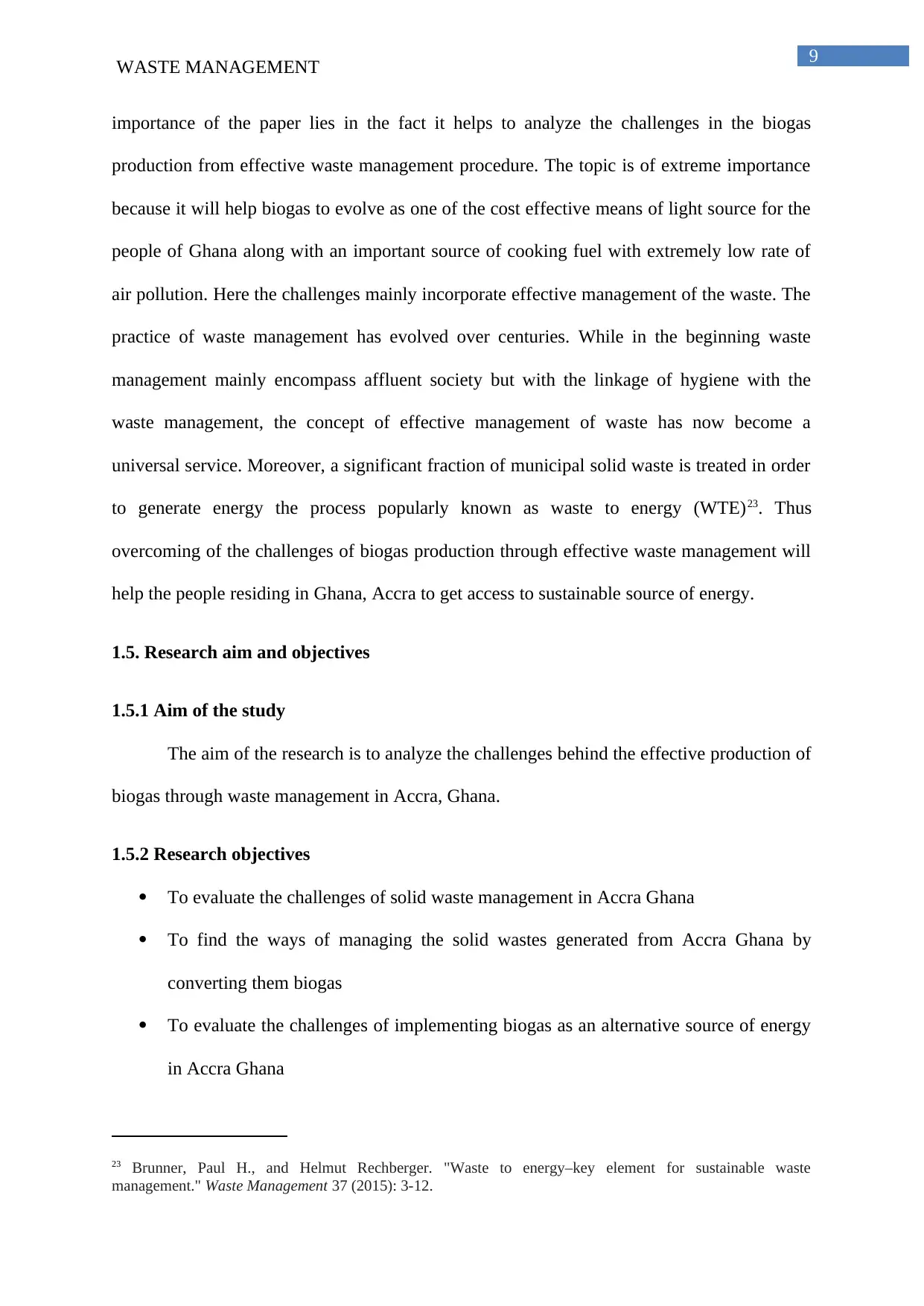
9
WASTE MANAGEMENT
importance of the paper lies in the fact it helps to analyze the challenges in the biogas
production from effective waste management procedure. The topic is of extreme importance
because it will help biogas to evolve as one of the cost effective means of light source for the
people of Ghana along with an important source of cooking fuel with extremely low rate of
air pollution. Here the challenges mainly incorporate effective management of the waste. The
practice of waste management has evolved over centuries. While in the beginning waste
management mainly encompass affluent society but with the linkage of hygiene with the
waste management, the concept of effective management of waste has now become a
universal service. Moreover, a significant fraction of municipal solid waste is treated in order
to generate energy the process popularly known as waste to energy (WTE)23. Thus
overcoming of the challenges of biogas production through effective waste management will
help the people residing in Ghana, Accra to get access to sustainable source of energy.
1.5. Research aim and objectives
1.5.1 Aim of the study
The aim of the research is to analyze the challenges behind the effective production of
biogas through waste management in Accra, Ghana.
1.5.2 Research objectives
To evaluate the challenges of solid waste management in Accra Ghana
To find the ways of managing the solid wastes generated from Accra Ghana by
converting them biogas
To evaluate the challenges of implementing biogas as an alternative source of energy
in Accra Ghana
23 Brunner, Paul H., and Helmut Rechberger. "Waste to energy–key element for sustainable waste
management." Waste Management 37 (2015): 3-12.
WASTE MANAGEMENT
importance of the paper lies in the fact it helps to analyze the challenges in the biogas
production from effective waste management procedure. The topic is of extreme importance
because it will help biogas to evolve as one of the cost effective means of light source for the
people of Ghana along with an important source of cooking fuel with extremely low rate of
air pollution. Here the challenges mainly incorporate effective management of the waste. The
practice of waste management has evolved over centuries. While in the beginning waste
management mainly encompass affluent society but with the linkage of hygiene with the
waste management, the concept of effective management of waste has now become a
universal service. Moreover, a significant fraction of municipal solid waste is treated in order
to generate energy the process popularly known as waste to energy (WTE)23. Thus
overcoming of the challenges of biogas production through effective waste management will
help the people residing in Ghana, Accra to get access to sustainable source of energy.
1.5. Research aim and objectives
1.5.1 Aim of the study
The aim of the research is to analyze the challenges behind the effective production of
biogas through waste management in Accra, Ghana.
1.5.2 Research objectives
To evaluate the challenges of solid waste management in Accra Ghana
To find the ways of managing the solid wastes generated from Accra Ghana by
converting them biogas
To evaluate the challenges of implementing biogas as an alternative source of energy
in Accra Ghana
23 Brunner, Paul H., and Helmut Rechberger. "Waste to energy–key element for sustainable waste
management." Waste Management 37 (2015): 3-12.
Secure Best Marks with AI Grader
Need help grading? Try our AI Grader for instant feedback on your assignments.
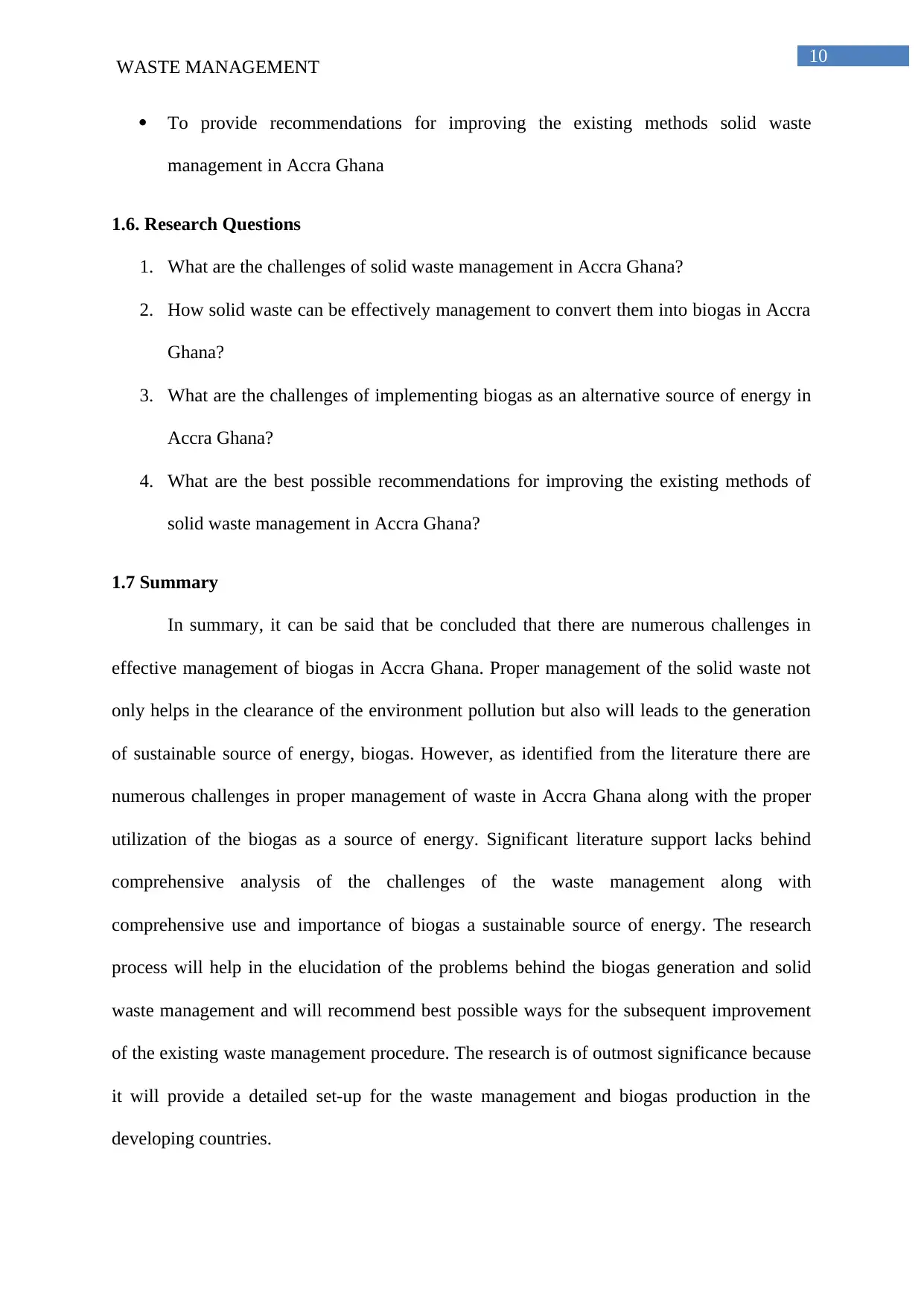
10
WASTE MANAGEMENT
To provide recommendations for improving the existing methods solid waste
management in Accra Ghana
1.6. Research Questions
1. What are the challenges of solid waste management in Accra Ghana?
2. How solid waste can be effectively management to convert them into biogas in Accra
Ghana?
3. What are the challenges of implementing biogas as an alternative source of energy in
Accra Ghana?
4. What are the best possible recommendations for improving the existing methods of
solid waste management in Accra Ghana?
1.7 Summary
In summary, it can be said that be concluded that there are numerous challenges in
effective management of biogas in Accra Ghana. Proper management of the solid waste not
only helps in the clearance of the environment pollution but also will leads to the generation
of sustainable source of energy, biogas. However, as identified from the literature there are
numerous challenges in proper management of waste in Accra Ghana along with the proper
utilization of the biogas as a source of energy. Significant literature support lacks behind
comprehensive analysis of the challenges of the waste management along with
comprehensive use and importance of biogas a sustainable source of energy. The research
process will help in the elucidation of the problems behind the biogas generation and solid
waste management and will recommend best possible ways for the subsequent improvement
of the existing waste management procedure. The research is of outmost significance because
it will provide a detailed set-up for the waste management and biogas production in the
developing countries.
WASTE MANAGEMENT
To provide recommendations for improving the existing methods solid waste
management in Accra Ghana
1.6. Research Questions
1. What are the challenges of solid waste management in Accra Ghana?
2. How solid waste can be effectively management to convert them into biogas in Accra
Ghana?
3. What are the challenges of implementing biogas as an alternative source of energy in
Accra Ghana?
4. What are the best possible recommendations for improving the existing methods of
solid waste management in Accra Ghana?
1.7 Summary
In summary, it can be said that be concluded that there are numerous challenges in
effective management of biogas in Accra Ghana. Proper management of the solid waste not
only helps in the clearance of the environment pollution but also will leads to the generation
of sustainable source of energy, biogas. However, as identified from the literature there are
numerous challenges in proper management of waste in Accra Ghana along with the proper
utilization of the biogas as a source of energy. Significant literature support lacks behind
comprehensive analysis of the challenges of the waste management along with
comprehensive use and importance of biogas a sustainable source of energy. The research
process will help in the elucidation of the problems behind the biogas generation and solid
waste management and will recommend best possible ways for the subsequent improvement
of the existing waste management procedure. The research is of outmost significance because
it will provide a detailed set-up for the waste management and biogas production in the
developing countries.
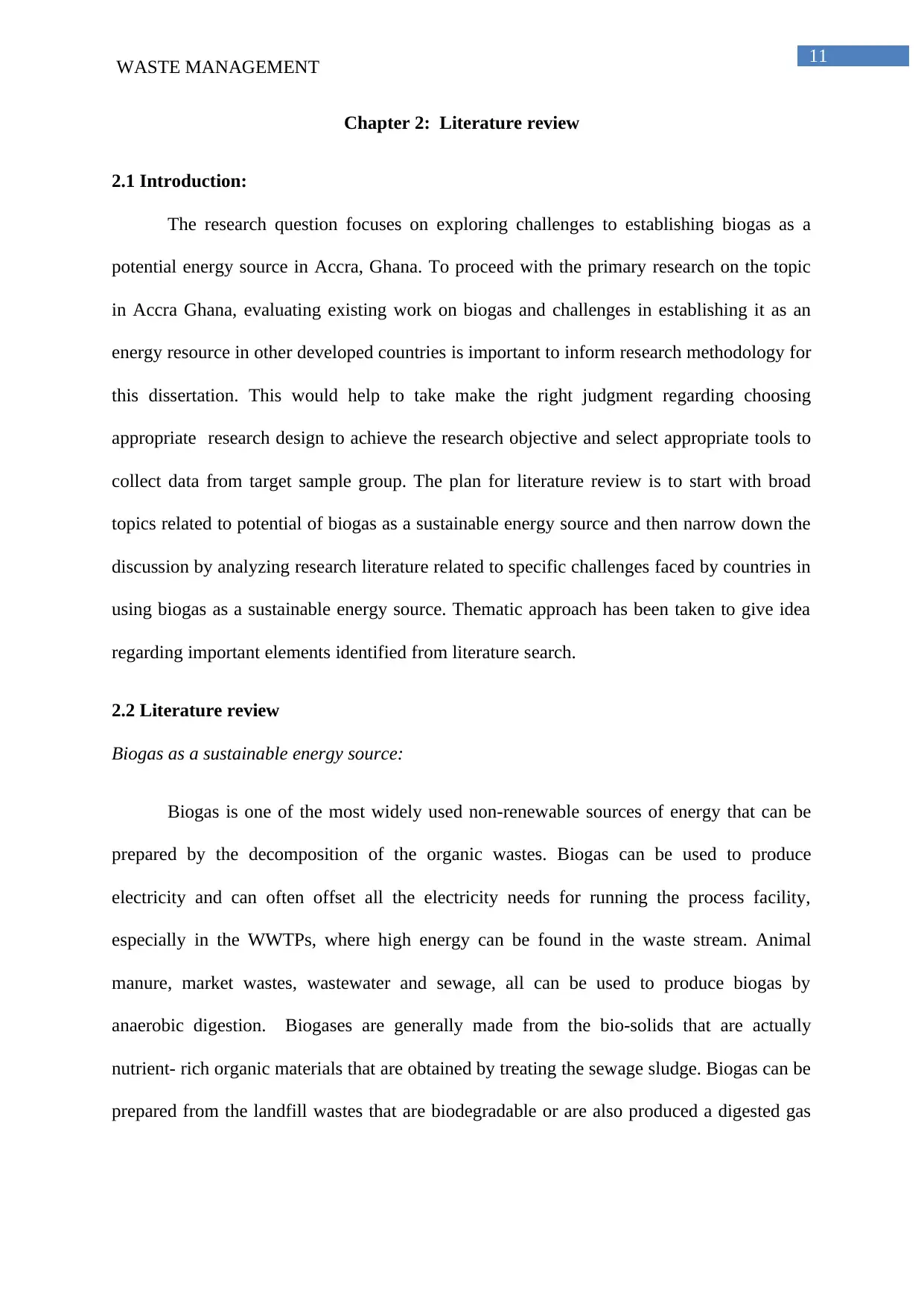
11
WASTE MANAGEMENT
Chapter 2: Literature review
2.1 Introduction:
The research question focuses on exploring challenges to establishing biogas as a
potential energy source in Accra, Ghana. To proceed with the primary research on the topic
in Accra Ghana, evaluating existing work on biogas and challenges in establishing it as an
energy resource in other developed countries is important to inform research methodology for
this dissertation. This would help to take make the right judgment regarding choosing
appropriate research design to achieve the research objective and select appropriate tools to
collect data from target sample group. The plan for literature review is to start with broad
topics related to potential of biogas as a sustainable energy source and then narrow down the
discussion by analyzing research literature related to specific challenges faced by countries in
using biogas as a sustainable energy source. Thematic approach has been taken to give idea
regarding important elements identified from literature search.
2.2 Literature review
Biogas as a sustainable energy source:
Biogas is one of the most widely used non-renewable sources of energy that can be
prepared by the decomposition of the organic wastes. Biogas can be used to produce
electricity and can often offset all the electricity needs for running the process facility,
especially in the WWTPs, where high energy can be found in the waste stream. Animal
manure, market wastes, wastewater and sewage, all can be used to produce biogas by
anaerobic digestion. Biogases are generally made from the bio-solids that are actually
nutrient- rich organic materials that are obtained by treating the sewage sludge. Biogas can be
prepared from the landfill wastes that are biodegradable or are also produced a digested gas
WASTE MANAGEMENT
Chapter 2: Literature review
2.1 Introduction:
The research question focuses on exploring challenges to establishing biogas as a
potential energy source in Accra, Ghana. To proceed with the primary research on the topic
in Accra Ghana, evaluating existing work on biogas and challenges in establishing it as an
energy resource in other developed countries is important to inform research methodology for
this dissertation. This would help to take make the right judgment regarding choosing
appropriate research design to achieve the research objective and select appropriate tools to
collect data from target sample group. The plan for literature review is to start with broad
topics related to potential of biogas as a sustainable energy source and then narrow down the
discussion by analyzing research literature related to specific challenges faced by countries in
using biogas as a sustainable energy source. Thematic approach has been taken to give idea
regarding important elements identified from literature search.
2.2 Literature review
Biogas as a sustainable energy source:
Biogas is one of the most widely used non-renewable sources of energy that can be
prepared by the decomposition of the organic wastes. Biogas can be used to produce
electricity and can often offset all the electricity needs for running the process facility,
especially in the WWTPs, where high energy can be found in the waste stream. Animal
manure, market wastes, wastewater and sewage, all can be used to produce biogas by
anaerobic digestion. Biogases are generally made from the bio-solids that are actually
nutrient- rich organic materials that are obtained by treating the sewage sludge. Biogas can be
prepared from the landfill wastes that are biodegradable or are also produced a digested gas
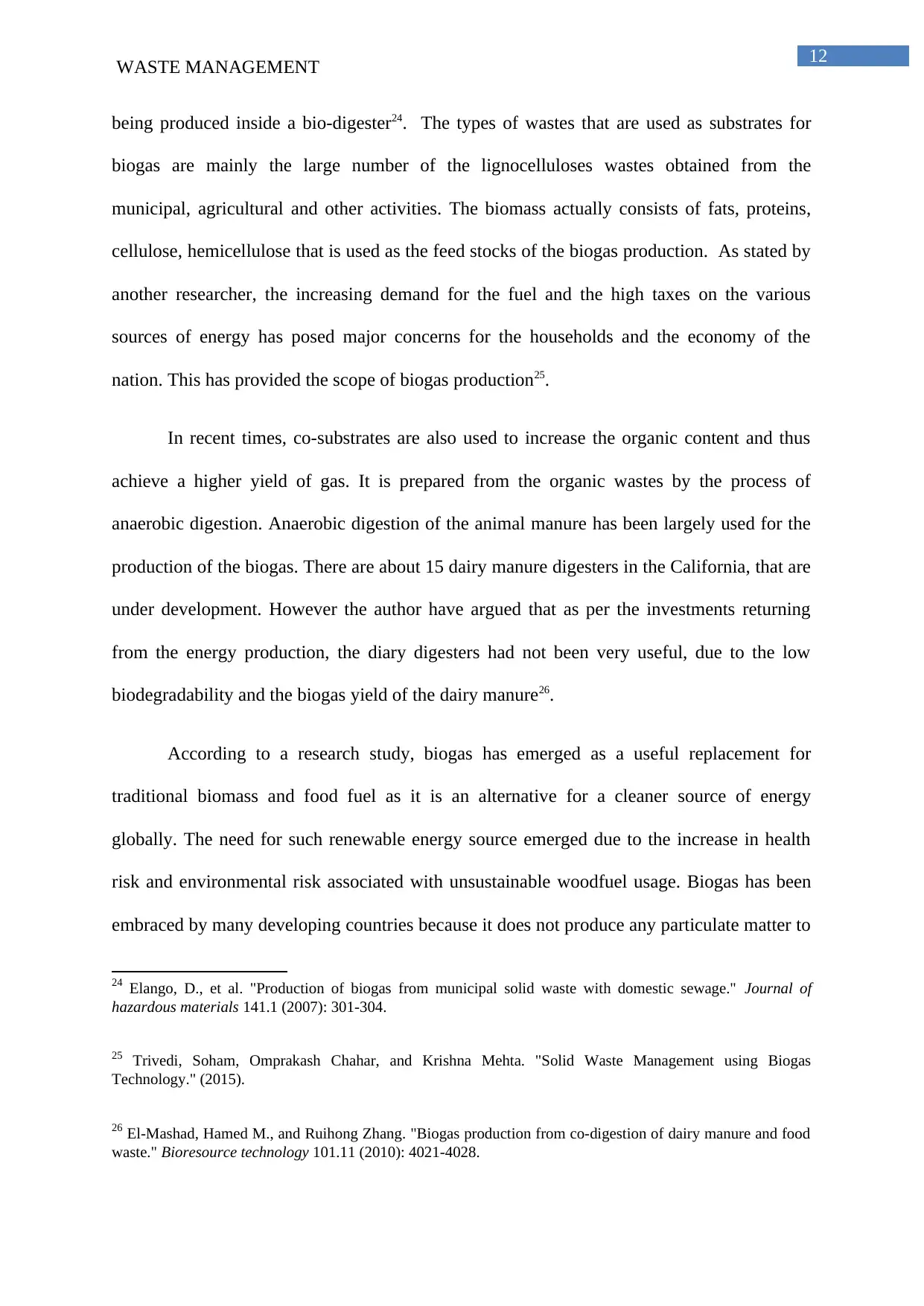
12
WASTE MANAGEMENT
being produced inside a bio-digester24. The types of wastes that are used as substrates for
biogas are mainly the large number of the lignocelluloses wastes obtained from the
municipal, agricultural and other activities. The biomass actually consists of fats, proteins,
cellulose, hemicellulose that is used as the feed stocks of the biogas production. As stated by
another researcher, the increasing demand for the fuel and the high taxes on the various
sources of energy has posed major concerns for the households and the economy of the
nation. This has provided the scope of biogas production25.
In recent times, co-substrates are also used to increase the organic content and thus
achieve a higher yield of gas. It is prepared from the organic wastes by the process of
anaerobic digestion. Anaerobic digestion of the animal manure has been largely used for the
production of the biogas. There are about 15 dairy manure digesters in the California, that are
under development. However the author have argued that as per the investments returning
from the energy production, the diary digesters had not been very useful, due to the low
biodegradability and the biogas yield of the dairy manure26.
According to a research study, biogas has emerged as a useful replacement for
traditional biomass and food fuel as it is an alternative for a cleaner source of energy
globally. The need for such renewable energy source emerged due to the increase in health
risk and environmental risk associated with unsustainable woodfuel usage. Biogas has been
embraced by many developing countries because it does not produce any particulate matter to
24 Elango, D., et al. "Production of biogas from municipal solid waste with domestic sewage." Journal of
hazardous materials 141.1 (2007): 301-304.
25 Trivedi, Soham, Omprakash Chahar, and Krishna Mehta. "Solid Waste Management using Biogas
Technology." (2015).
26 El-Mashad, Hamed M., and Ruihong Zhang. "Biogas production from co-digestion of dairy manure and food
waste." Bioresource technology 101.11 (2010): 4021-4028.
WASTE MANAGEMENT
being produced inside a bio-digester24. The types of wastes that are used as substrates for
biogas are mainly the large number of the lignocelluloses wastes obtained from the
municipal, agricultural and other activities. The biomass actually consists of fats, proteins,
cellulose, hemicellulose that is used as the feed stocks of the biogas production. As stated by
another researcher, the increasing demand for the fuel and the high taxes on the various
sources of energy has posed major concerns for the households and the economy of the
nation. This has provided the scope of biogas production25.
In recent times, co-substrates are also used to increase the organic content and thus
achieve a higher yield of gas. It is prepared from the organic wastes by the process of
anaerobic digestion. Anaerobic digestion of the animal manure has been largely used for the
production of the biogas. There are about 15 dairy manure digesters in the California, that are
under development. However the author have argued that as per the investments returning
from the energy production, the diary digesters had not been very useful, due to the low
biodegradability and the biogas yield of the dairy manure26.
According to a research study, biogas has emerged as a useful replacement for
traditional biomass and food fuel as it is an alternative for a cleaner source of energy
globally. The need for such renewable energy source emerged due to the increase in health
risk and environmental risk associated with unsustainable woodfuel usage. Biogas has been
embraced by many developing countries because it does not produce any particulate matter to
24 Elango, D., et al. "Production of biogas from municipal solid waste with domestic sewage." Journal of
hazardous materials 141.1 (2007): 301-304.
25 Trivedi, Soham, Omprakash Chahar, and Krishna Mehta. "Solid Waste Management using Biogas
Technology." (2015).
26 El-Mashad, Hamed M., and Ruihong Zhang. "Biogas production from co-digestion of dairy manure and food
waste." Bioresource technology 101.11 (2010): 4021-4028.
Paraphrase This Document
Need a fresh take? Get an instant paraphrase of this document with our AI Paraphraser
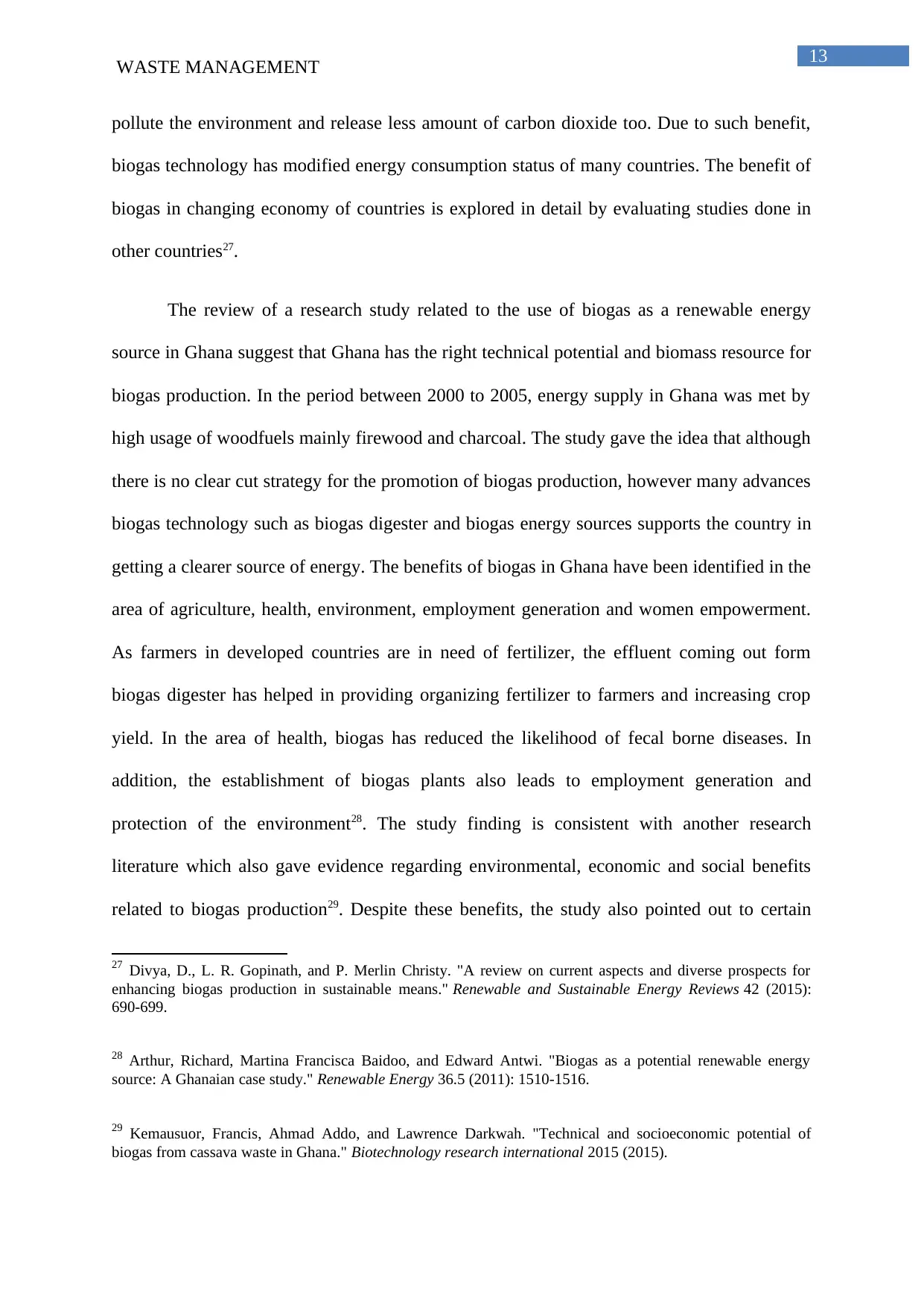
13
WASTE MANAGEMENT
pollute the environment and release less amount of carbon dioxide too. Due to such benefit,
biogas technology has modified energy consumption status of many countries. The benefit of
biogas in changing economy of countries is explored in detail by evaluating studies done in
other countries27.
The review of a research study related to the use of biogas as a renewable energy
source in Ghana suggest that Ghana has the right technical potential and biomass resource for
biogas production. In the period between 2000 to 2005, energy supply in Ghana was met by
high usage of woodfuels mainly firewood and charcoal. The study gave the idea that although
there is no clear cut strategy for the promotion of biogas production, however many advances
biogas technology such as biogas digester and biogas energy sources supports the country in
getting a clearer source of energy. The benefits of biogas in Ghana have been identified in the
area of agriculture, health, environment, employment generation and women empowerment.
As farmers in developed countries are in need of fertilizer, the effluent coming out form
biogas digester has helped in providing organizing fertilizer to farmers and increasing crop
yield. In the area of health, biogas has reduced the likelihood of fecal borne diseases. In
addition, the establishment of biogas plants also leads to employment generation and
protection of the environment28. The study finding is consistent with another research
literature which also gave evidence regarding environmental, economic and social benefits
related to biogas production29. Despite these benefits, the study also pointed out to certain
27 Divya, D., L. R. Gopinath, and P. Merlin Christy. "A review on current aspects and diverse prospects for
enhancing biogas production in sustainable means." Renewable and Sustainable Energy Reviews 42 (2015):
690-699.
28 Arthur, Richard, Martina Francisca Baidoo, and Edward Antwi. "Biogas as a potential renewable energy
source: A Ghanaian case study." Renewable Energy 36.5 (2011): 1510-1516.
29 Kemausuor, Francis, Ahmad Addo, and Lawrence Darkwah. "Technical and socioeconomic potential of
biogas from cassava waste in Ghana." Biotechnology research international 2015 (2015).
WASTE MANAGEMENT
pollute the environment and release less amount of carbon dioxide too. Due to such benefit,
biogas technology has modified energy consumption status of many countries. The benefit of
biogas in changing economy of countries is explored in detail by evaluating studies done in
other countries27.
The review of a research study related to the use of biogas as a renewable energy
source in Ghana suggest that Ghana has the right technical potential and biomass resource for
biogas production. In the period between 2000 to 2005, energy supply in Ghana was met by
high usage of woodfuels mainly firewood and charcoal. The study gave the idea that although
there is no clear cut strategy for the promotion of biogas production, however many advances
biogas technology such as biogas digester and biogas energy sources supports the country in
getting a clearer source of energy. The benefits of biogas in Ghana have been identified in the
area of agriculture, health, environment, employment generation and women empowerment.
As farmers in developed countries are in need of fertilizer, the effluent coming out form
biogas digester has helped in providing organizing fertilizer to farmers and increasing crop
yield. In the area of health, biogas has reduced the likelihood of fecal borne diseases. In
addition, the establishment of biogas plants also leads to employment generation and
protection of the environment28. The study finding is consistent with another research
literature which also gave evidence regarding environmental, economic and social benefits
related to biogas production29. Despite these benefits, the study also pointed out to certain
27 Divya, D., L. R. Gopinath, and P. Merlin Christy. "A review on current aspects and diverse prospects for
enhancing biogas production in sustainable means." Renewable and Sustainable Energy Reviews 42 (2015):
690-699.
28 Arthur, Richard, Martina Francisca Baidoo, and Edward Antwi. "Biogas as a potential renewable energy
source: A Ghanaian case study." Renewable Energy 36.5 (2011): 1510-1516.
29 Kemausuor, Francis, Ahmad Addo, and Lawrence Darkwah. "Technical and socioeconomic potential of
biogas from cassava waste in Ghana." Biotechnology research international 2015 (2015).
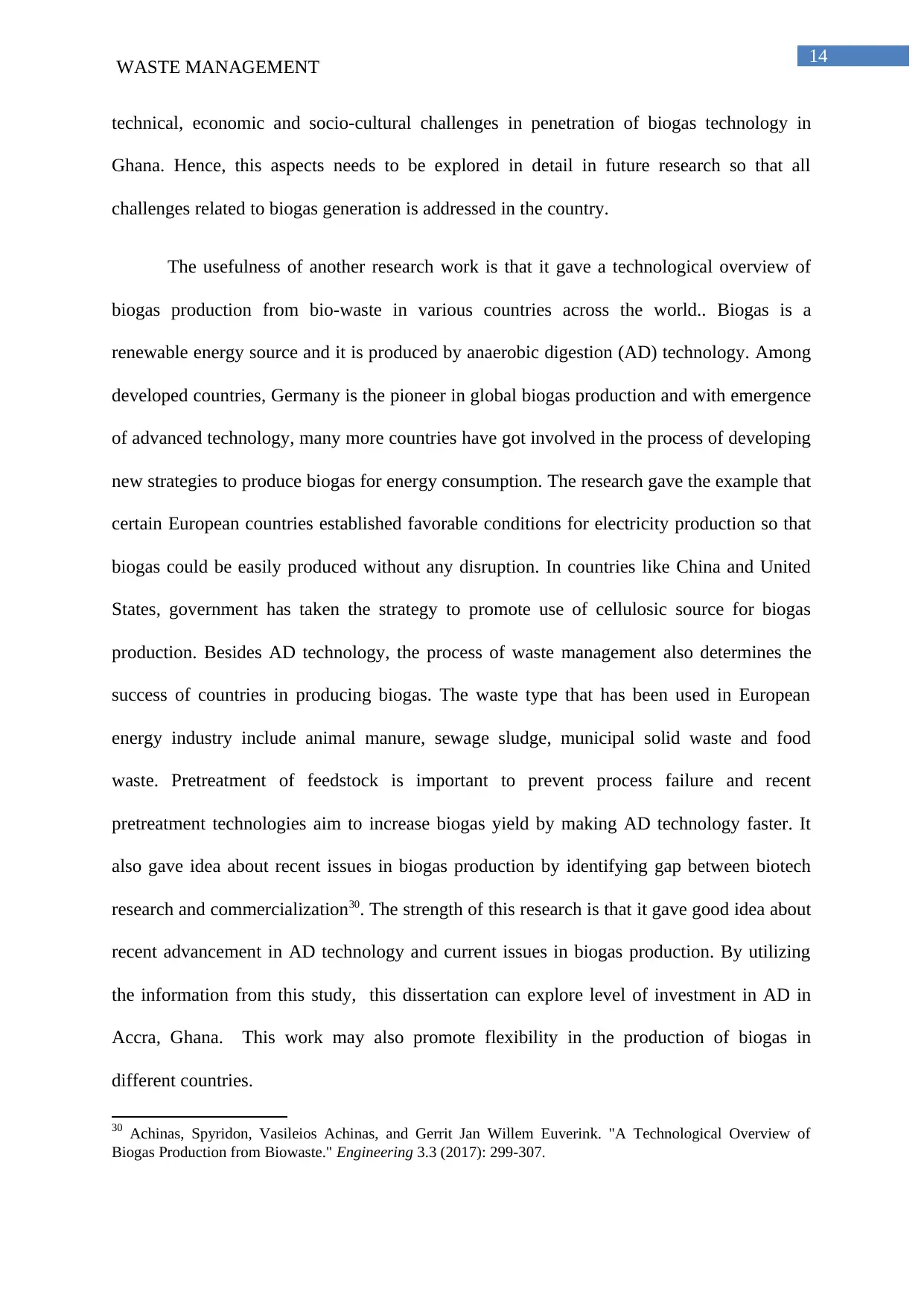
14
WASTE MANAGEMENT
technical, economic and socio-cultural challenges in penetration of biogas technology in
Ghana. Hence, this aspects needs to be explored in detail in future research so that all
challenges related to biogas generation is addressed in the country.
The usefulness of another research work is that it gave a technological overview of
biogas production from bio-waste in various countries across the world.. Biogas is a
renewable energy source and it is produced by anaerobic digestion (AD) technology. Among
developed countries, Germany is the pioneer in global biogas production and with emergence
of advanced technology, many more countries have got involved in the process of developing
new strategies to produce biogas for energy consumption. The research gave the example that
certain European countries established favorable conditions for electricity production so that
biogas could be easily produced without any disruption. In countries like China and United
States, government has taken the strategy to promote use of cellulosic source for biogas
production. Besides AD technology, the process of waste management also determines the
success of countries in producing biogas. The waste type that has been used in European
energy industry include animal manure, sewage sludge, municipal solid waste and food
waste. Pretreatment of feedstock is important to prevent process failure and recent
pretreatment technologies aim to increase biogas yield by making AD technology faster. It
also gave idea about recent issues in biogas production by identifying gap between biotech
research and commercialization30. The strength of this research is that it gave good idea about
recent advancement in AD technology and current issues in biogas production. By utilizing
the information from this study, this dissertation can explore level of investment in AD in
Accra, Ghana. This work may also promote flexibility in the production of biogas in
different countries.
30 Achinas, Spyridon, Vasileios Achinas, and Gerrit Jan Willem Euverink. "A Technological Overview of
Biogas Production from Biowaste." Engineering 3.3 (2017): 299-307.
WASTE MANAGEMENT
technical, economic and socio-cultural challenges in penetration of biogas technology in
Ghana. Hence, this aspects needs to be explored in detail in future research so that all
challenges related to biogas generation is addressed in the country.
The usefulness of another research work is that it gave a technological overview of
biogas production from bio-waste in various countries across the world.. Biogas is a
renewable energy source and it is produced by anaerobic digestion (AD) technology. Among
developed countries, Germany is the pioneer in global biogas production and with emergence
of advanced technology, many more countries have got involved in the process of developing
new strategies to produce biogas for energy consumption. The research gave the example that
certain European countries established favorable conditions for electricity production so that
biogas could be easily produced without any disruption. In countries like China and United
States, government has taken the strategy to promote use of cellulosic source for biogas
production. Besides AD technology, the process of waste management also determines the
success of countries in producing biogas. The waste type that has been used in European
energy industry include animal manure, sewage sludge, municipal solid waste and food
waste. Pretreatment of feedstock is important to prevent process failure and recent
pretreatment technologies aim to increase biogas yield by making AD technology faster. It
also gave idea about recent issues in biogas production by identifying gap between biotech
research and commercialization30. The strength of this research is that it gave good idea about
recent advancement in AD technology and current issues in biogas production. By utilizing
the information from this study, this dissertation can explore level of investment in AD in
Accra, Ghana. This work may also promote flexibility in the production of biogas in
different countries.
30 Achinas, Spyridon, Vasileios Achinas, and Gerrit Jan Willem Euverink. "A Technological Overview of
Biogas Production from Biowaste." Engineering 3.3 (2017): 299-307.
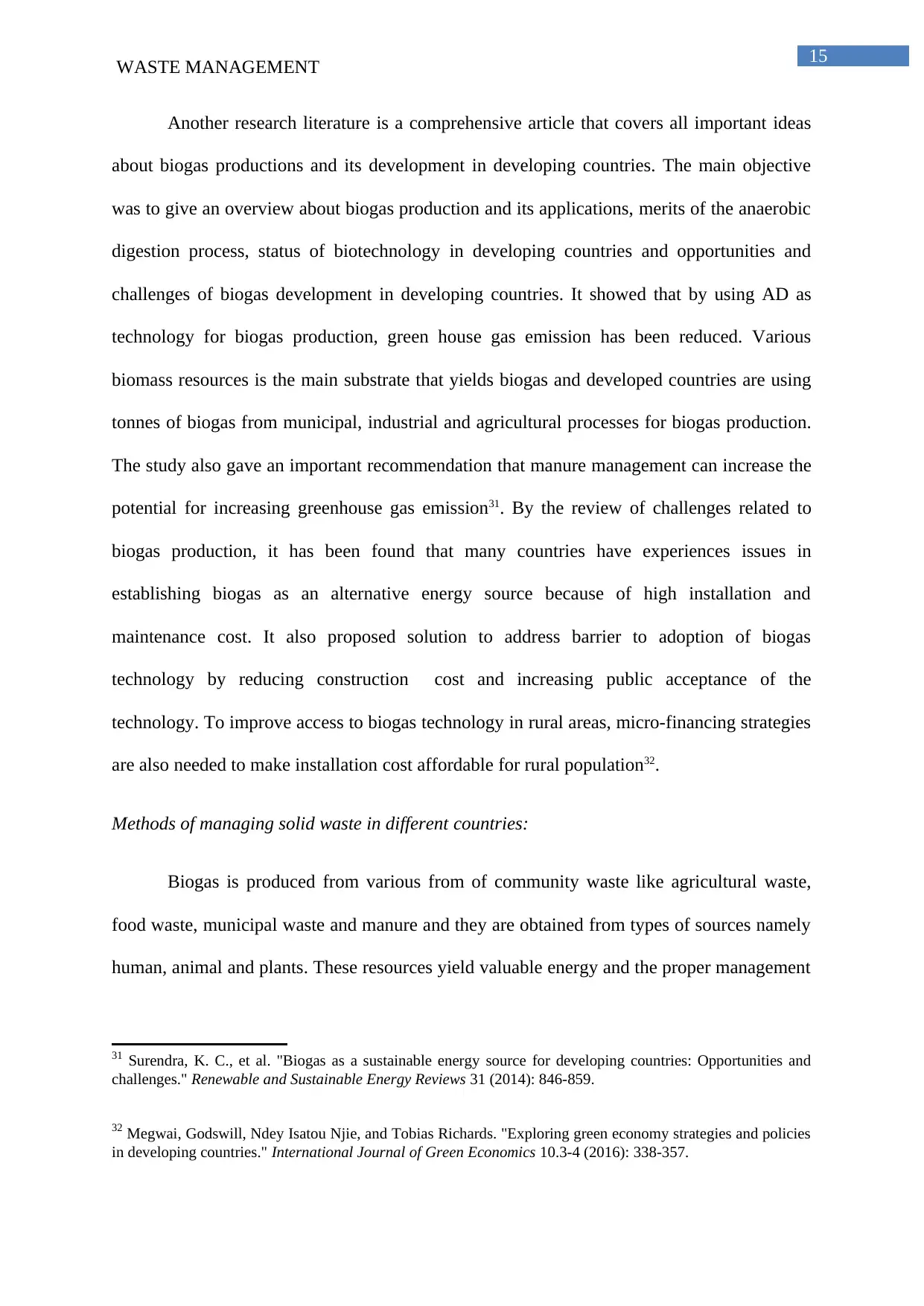
15
WASTE MANAGEMENT
Another research literature is a comprehensive article that covers all important ideas
about biogas productions and its development in developing countries. The main objective
was to give an overview about biogas production and its applications, merits of the anaerobic
digestion process, status of biotechnology in developing countries and opportunities and
challenges of biogas development in developing countries. It showed that by using AD as
technology for biogas production, green house gas emission has been reduced. Various
biomass resources is the main substrate that yields biogas and developed countries are using
tonnes of biogas from municipal, industrial and agricultural processes for biogas production.
The study also gave an important recommendation that manure management can increase the
potential for increasing greenhouse gas emission31. By the review of challenges related to
biogas production, it has been found that many countries have experiences issues in
establishing biogas as an alternative energy source because of high installation and
maintenance cost. It also proposed solution to address barrier to adoption of biogas
technology by reducing construction cost and increasing public acceptance of the
technology. To improve access to biogas technology in rural areas, micro-financing strategies
are also needed to make installation cost affordable for rural population32.
Methods of managing solid waste in different countries:
Biogas is produced from various from of community waste like agricultural waste,
food waste, municipal waste and manure and they are obtained from types of sources namely
human, animal and plants. These resources yield valuable energy and the proper management
31 Surendra, K. C., et al. "Biogas as a sustainable energy source for developing countries: Opportunities and
challenges." Renewable and Sustainable Energy Reviews 31 (2014): 846-859.
32 Megwai, Godswill, Ndey Isatou Njie, and Tobias Richards. "Exploring green economy strategies and policies
in developing countries." International Journal of Green Economics 10.3-4 (2016): 338-357.
WASTE MANAGEMENT
Another research literature is a comprehensive article that covers all important ideas
about biogas productions and its development in developing countries. The main objective
was to give an overview about biogas production and its applications, merits of the anaerobic
digestion process, status of biotechnology in developing countries and opportunities and
challenges of biogas development in developing countries. It showed that by using AD as
technology for biogas production, green house gas emission has been reduced. Various
biomass resources is the main substrate that yields biogas and developed countries are using
tonnes of biogas from municipal, industrial and agricultural processes for biogas production.
The study also gave an important recommendation that manure management can increase the
potential for increasing greenhouse gas emission31. By the review of challenges related to
biogas production, it has been found that many countries have experiences issues in
establishing biogas as an alternative energy source because of high installation and
maintenance cost. It also proposed solution to address barrier to adoption of biogas
technology by reducing construction cost and increasing public acceptance of the
technology. To improve access to biogas technology in rural areas, micro-financing strategies
are also needed to make installation cost affordable for rural population32.
Methods of managing solid waste in different countries:
Biogas is produced from various from of community waste like agricultural waste,
food waste, municipal waste and manure and they are obtained from types of sources namely
human, animal and plants. These resources yield valuable energy and the proper management
31 Surendra, K. C., et al. "Biogas as a sustainable energy source for developing countries: Opportunities and
challenges." Renewable and Sustainable Energy Reviews 31 (2014): 846-859.
32 Megwai, Godswill, Ndey Isatou Njie, and Tobias Richards. "Exploring green economy strategies and policies
in developing countries." International Journal of Green Economics 10.3-4 (2016): 338-357.
Secure Best Marks with AI Grader
Need help grading? Try our AI Grader for instant feedback on your assignments.
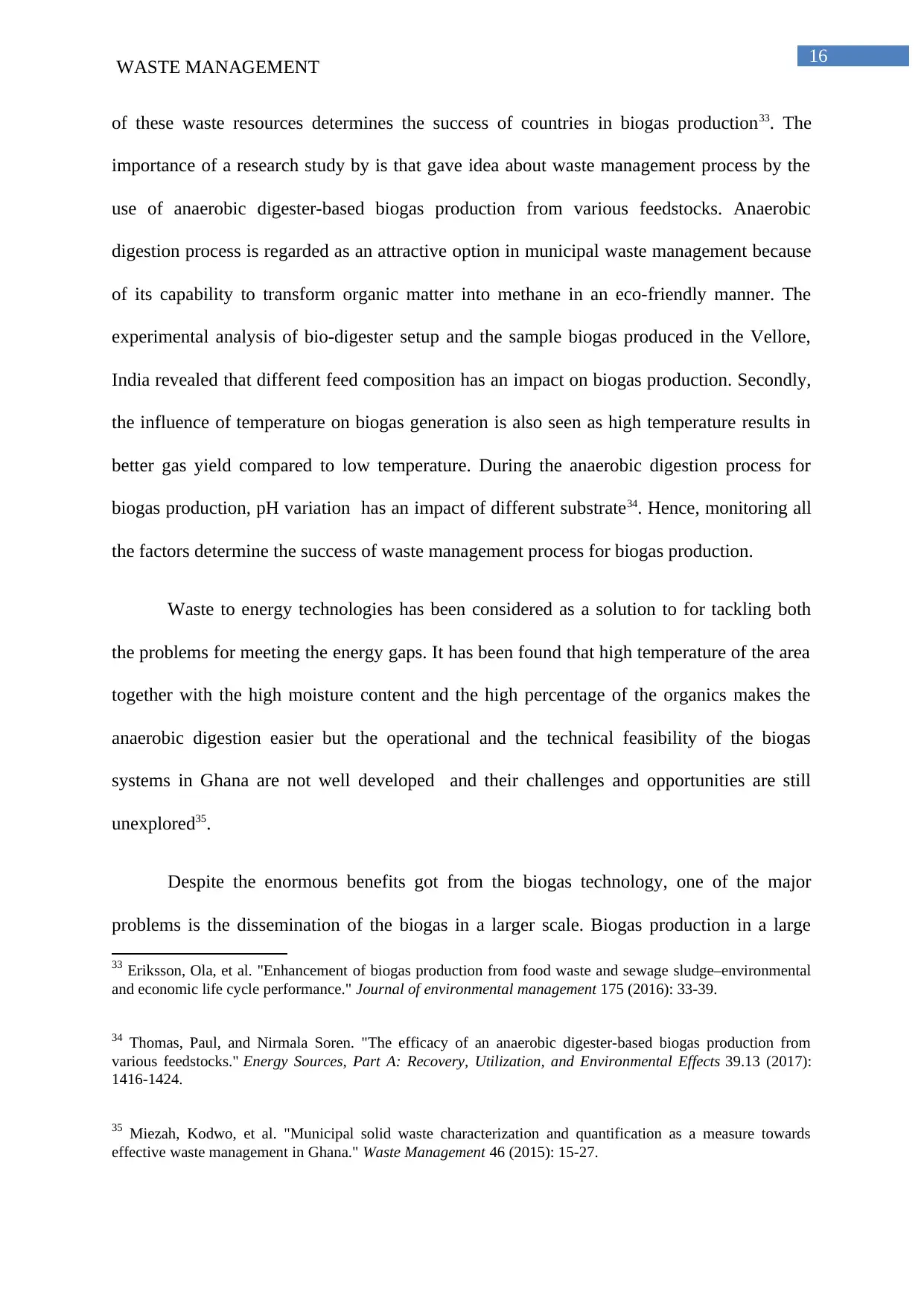
16
WASTE MANAGEMENT
of these waste resources determines the success of countries in biogas production33. The
importance of a research study by is that gave idea about waste management process by the
use of anaerobic digester-based biogas production from various feedstocks. Anaerobic
digestion process is regarded as an attractive option in municipal waste management because
of its capability to transform organic matter into methane in an eco-friendly manner. The
experimental analysis of bio-digester setup and the sample biogas produced in the Vellore,
India revealed that different feed composition has an impact on biogas production. Secondly,
the influence of temperature on biogas generation is also seen as high temperature results in
better gas yield compared to low temperature. During the anaerobic digestion process for
biogas production, pH variation has an impact of different substrate34. Hence, monitoring all
the factors determine the success of waste management process for biogas production.
Waste to energy technologies has been considered as a solution to for tackling both
the problems for meeting the energy gaps. It has been found that high temperature of the area
together with the high moisture content and the high percentage of the organics makes the
anaerobic digestion easier but the operational and the technical feasibility of the biogas
systems in Ghana are not well developed and their challenges and opportunities are still
unexplored35.
Despite the enormous benefits got from the biogas technology, one of the major
problems is the dissemination of the biogas in a larger scale. Biogas production in a large
33 Eriksson, Ola, et al. "Enhancement of biogas production from food waste and sewage sludge–environmental
and economic life cycle performance." Journal of environmental management 175 (2016): 33-39.
34 Thomas, Paul, and Nirmala Soren. "The efficacy of an anaerobic digester-based biogas production from
various feedstocks." Energy Sources, Part A: Recovery, Utilization, and Environmental Effects 39.13 (2017):
1416-1424.
35 Miezah, Kodwo, et al. "Municipal solid waste characterization and quantification as a measure towards
effective waste management in Ghana." Waste Management 46 (2015): 15-27.
WASTE MANAGEMENT
of these waste resources determines the success of countries in biogas production33. The
importance of a research study by is that gave idea about waste management process by the
use of anaerobic digester-based biogas production from various feedstocks. Anaerobic
digestion process is regarded as an attractive option in municipal waste management because
of its capability to transform organic matter into methane in an eco-friendly manner. The
experimental analysis of bio-digester setup and the sample biogas produced in the Vellore,
India revealed that different feed composition has an impact on biogas production. Secondly,
the influence of temperature on biogas generation is also seen as high temperature results in
better gas yield compared to low temperature. During the anaerobic digestion process for
biogas production, pH variation has an impact of different substrate34. Hence, monitoring all
the factors determine the success of waste management process for biogas production.
Waste to energy technologies has been considered as a solution to for tackling both
the problems for meeting the energy gaps. It has been found that high temperature of the area
together with the high moisture content and the high percentage of the organics makes the
anaerobic digestion easier but the operational and the technical feasibility of the biogas
systems in Ghana are not well developed and their challenges and opportunities are still
unexplored35.
Despite the enormous benefits got from the biogas technology, one of the major
problems is the dissemination of the biogas in a larger scale. Biogas production in a large
33 Eriksson, Ola, et al. "Enhancement of biogas production from food waste and sewage sludge–environmental
and economic life cycle performance." Journal of environmental management 175 (2016): 33-39.
34 Thomas, Paul, and Nirmala Soren. "The efficacy of an anaerobic digester-based biogas production from
various feedstocks." Energy Sources, Part A: Recovery, Utilization, and Environmental Effects 39.13 (2017):
1416-1424.
35 Miezah, Kodwo, et al. "Municipal solid waste characterization and quantification as a measure towards
effective waste management in Ghana." Waste Management 46 (2015): 15-27.
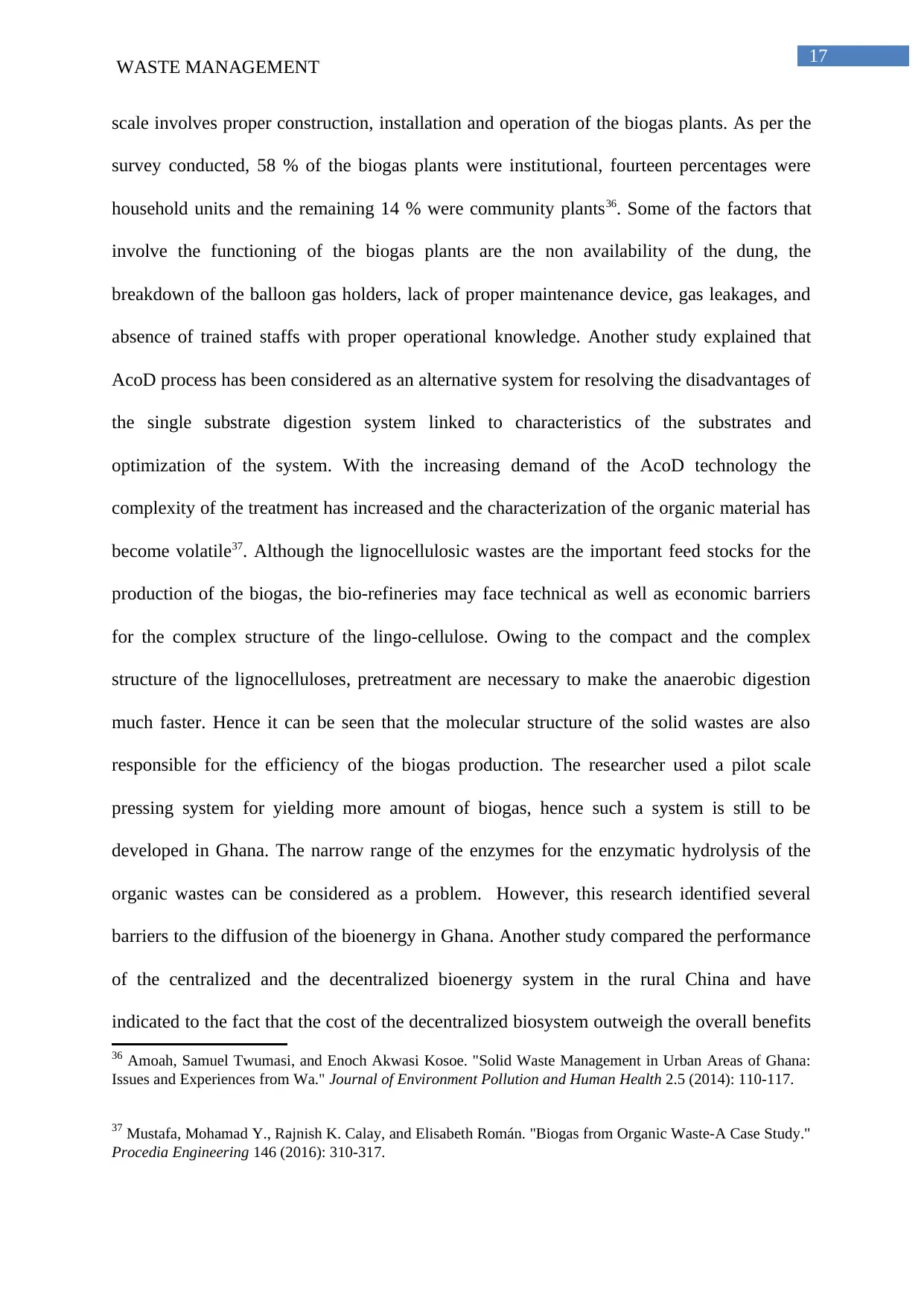
17
WASTE MANAGEMENT
scale involves proper construction, installation and operation of the biogas plants. As per the
survey conducted, 58 % of the biogas plants were institutional, fourteen percentages were
household units and the remaining 14 % were community plants36. Some of the factors that
involve the functioning of the biogas plants are the non availability of the dung, the
breakdown of the balloon gas holders, lack of proper maintenance device, gas leakages, and
absence of trained staffs with proper operational knowledge. Another study explained that
AcoD process has been considered as an alternative system for resolving the disadvantages of
the single substrate digestion system linked to characteristics of the substrates and
optimization of the system. With the increasing demand of the AcoD technology the
complexity of the treatment has increased and the characterization of the organic material has
become volatile37. Although the lignocellulosic wastes are the important feed stocks for the
production of the biogas, the bio-refineries may face technical as well as economic barriers
for the complex structure of the lingo-cellulose. Owing to the compact and the complex
structure of the lignocelluloses, pretreatment are necessary to make the anaerobic digestion
much faster. Hence it can be seen that the molecular structure of the solid wastes are also
responsible for the efficiency of the biogas production. The researcher used a pilot scale
pressing system for yielding more amount of biogas, hence such a system is still to be
developed in Ghana. The narrow range of the enzymes for the enzymatic hydrolysis of the
organic wastes can be considered as a problem. However, this research identified several
barriers to the diffusion of the bioenergy in Ghana. Another study compared the performance
of the centralized and the decentralized bioenergy system in the rural China and have
indicated to the fact that the cost of the decentralized biosystem outweigh the overall benefits
36 Amoah, Samuel Twumasi, and Enoch Akwasi Kosoe. "Solid Waste Management in Urban Areas of Ghana:
Issues and Experiences from Wa." Journal of Environment Pollution and Human Health 2.5 (2014): 110-117.
37 Mustafa, Mohamad Y., Rajnish K. Calay, and Elisabeth Román. "Biogas from Organic Waste-A Case Study."
Procedia Engineering 146 (2016): 310-317.
WASTE MANAGEMENT
scale involves proper construction, installation and operation of the biogas plants. As per the
survey conducted, 58 % of the biogas plants were institutional, fourteen percentages were
household units and the remaining 14 % were community plants36. Some of the factors that
involve the functioning of the biogas plants are the non availability of the dung, the
breakdown of the balloon gas holders, lack of proper maintenance device, gas leakages, and
absence of trained staffs with proper operational knowledge. Another study explained that
AcoD process has been considered as an alternative system for resolving the disadvantages of
the single substrate digestion system linked to characteristics of the substrates and
optimization of the system. With the increasing demand of the AcoD technology the
complexity of the treatment has increased and the characterization of the organic material has
become volatile37. Although the lignocellulosic wastes are the important feed stocks for the
production of the biogas, the bio-refineries may face technical as well as economic barriers
for the complex structure of the lingo-cellulose. Owing to the compact and the complex
structure of the lignocelluloses, pretreatment are necessary to make the anaerobic digestion
much faster. Hence it can be seen that the molecular structure of the solid wastes are also
responsible for the efficiency of the biogas production. The researcher used a pilot scale
pressing system for yielding more amount of biogas, hence such a system is still to be
developed in Ghana. The narrow range of the enzymes for the enzymatic hydrolysis of the
organic wastes can be considered as a problem. However, this research identified several
barriers to the diffusion of the bioenergy in Ghana. Another study compared the performance
of the centralized and the decentralized bioenergy system in the rural China and have
indicated to the fact that the cost of the decentralized biosystem outweigh the overall benefits
36 Amoah, Samuel Twumasi, and Enoch Akwasi Kosoe. "Solid Waste Management in Urban Areas of Ghana:
Issues and Experiences from Wa." Journal of Environment Pollution and Human Health 2.5 (2014): 110-117.
37 Mustafa, Mohamad Y., Rajnish K. Calay, and Elisabeth Román. "Biogas from Organic Waste-A Case Study."
Procedia Engineering 146 (2016): 310-317.
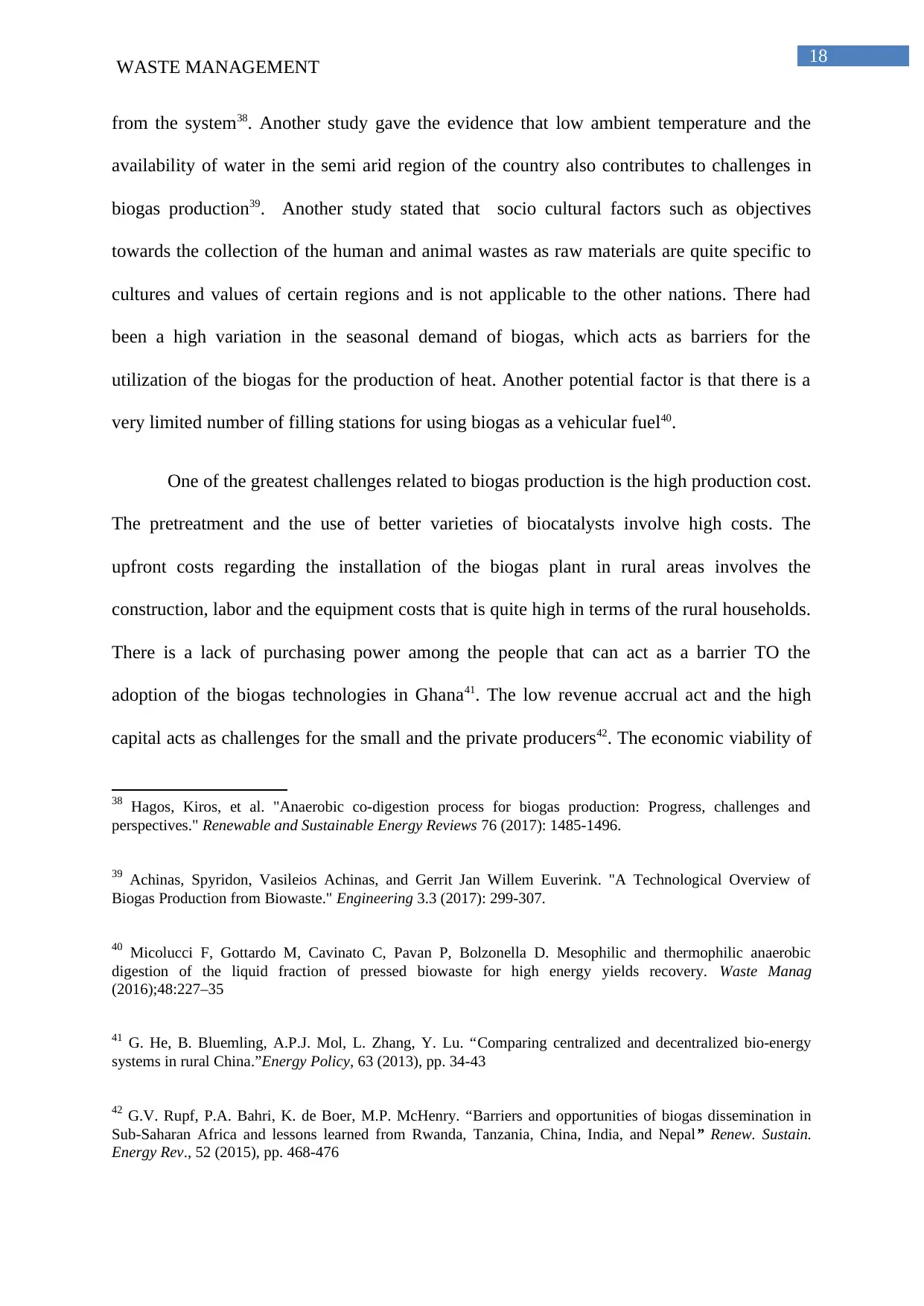
18
WASTE MANAGEMENT
from the system38. Another study gave the evidence that low ambient temperature and the
availability of water in the semi arid region of the country also contributes to challenges in
biogas production39. Another study stated that socio cultural factors such as objectives
towards the collection of the human and animal wastes as raw materials are quite specific to
cultures and values of certain regions and is not applicable to the other nations. There had
been a high variation in the seasonal demand of biogas, which acts as barriers for the
utilization of the biogas for the production of heat. Another potential factor is that there is a
very limited number of filling stations for using biogas as a vehicular fuel40.
One of the greatest challenges related to biogas production is the high production cost.
The pretreatment and the use of better varieties of biocatalysts involve high costs. The
upfront costs regarding the installation of the biogas plant in rural areas involves the
construction, labor and the equipment costs that is quite high in terms of the rural households.
There is a lack of purchasing power among the people that can act as a barrier TO the
adoption of the biogas technologies in Ghana41. The low revenue accrual act and the high
capital acts as challenges for the small and the private producers42. The economic viability of
38 Hagos, Kiros, et al. "Anaerobic co-digestion process for biogas production: Progress, challenges and
perspectives." Renewable and Sustainable Energy Reviews 76 (2017): 1485-1496.
39 Achinas, Spyridon, Vasileios Achinas, and Gerrit Jan Willem Euverink. "A Technological Overview of
Biogas Production from Biowaste." Engineering 3.3 (2017): 299-307.
40 Micolucci F, Gottardo M, Cavinato C, Pavan P, Bolzonella D. Mesophilic and thermophilic anaerobic
digestion of the liquid fraction of pressed biowaste for high energy yields recovery. Waste Manag
(2016);48:227–35
41 G. He, B. Bluemling, A.P.J. Mol, L. Zhang, Y. Lu. “Comparing centralized and decentralized bio-energy
systems in rural China.”Energy Policy, 63 (2013), pp. 34-43
42 G.V. Rupf, P.A. Bahri, K. de Boer, M.P. McHenry. “Barriers and opportunities of biogas dissemination in
Sub-Saharan Africa and lessons learned from Rwanda, Tanzania, China, India, and Nepal” Renew. Sustain.
Energy Rev., 52 (2015), pp. 468-476
WASTE MANAGEMENT
from the system38. Another study gave the evidence that low ambient temperature and the
availability of water in the semi arid region of the country also contributes to challenges in
biogas production39. Another study stated that socio cultural factors such as objectives
towards the collection of the human and animal wastes as raw materials are quite specific to
cultures and values of certain regions and is not applicable to the other nations. There had
been a high variation in the seasonal demand of biogas, which acts as barriers for the
utilization of the biogas for the production of heat. Another potential factor is that there is a
very limited number of filling stations for using biogas as a vehicular fuel40.
One of the greatest challenges related to biogas production is the high production cost.
The pretreatment and the use of better varieties of biocatalysts involve high costs. The
upfront costs regarding the installation of the biogas plant in rural areas involves the
construction, labor and the equipment costs that is quite high in terms of the rural households.
There is a lack of purchasing power among the people that can act as a barrier TO the
adoption of the biogas technologies in Ghana41. The low revenue accrual act and the high
capital acts as challenges for the small and the private producers42. The economic viability of
38 Hagos, Kiros, et al. "Anaerobic co-digestion process for biogas production: Progress, challenges and
perspectives." Renewable and Sustainable Energy Reviews 76 (2017): 1485-1496.
39 Achinas, Spyridon, Vasileios Achinas, and Gerrit Jan Willem Euverink. "A Technological Overview of
Biogas Production from Biowaste." Engineering 3.3 (2017): 299-307.
40 Micolucci F, Gottardo M, Cavinato C, Pavan P, Bolzonella D. Mesophilic and thermophilic anaerobic
digestion of the liquid fraction of pressed biowaste for high energy yields recovery. Waste Manag
(2016);48:227–35
41 G. He, B. Bluemling, A.P.J. Mol, L. Zhang, Y. Lu. “Comparing centralized and decentralized bio-energy
systems in rural China.”Energy Policy, 63 (2013), pp. 34-43
42 G.V. Rupf, P.A. Bahri, K. de Boer, M.P. McHenry. “Barriers and opportunities of biogas dissemination in
Sub-Saharan Africa and lessons learned from Rwanda, Tanzania, China, India, and Nepal” Renew. Sustain.
Energy Rev., 52 (2015), pp. 468-476
Paraphrase This Document
Need a fresh take? Get an instant paraphrase of this document with our AI Paraphraser
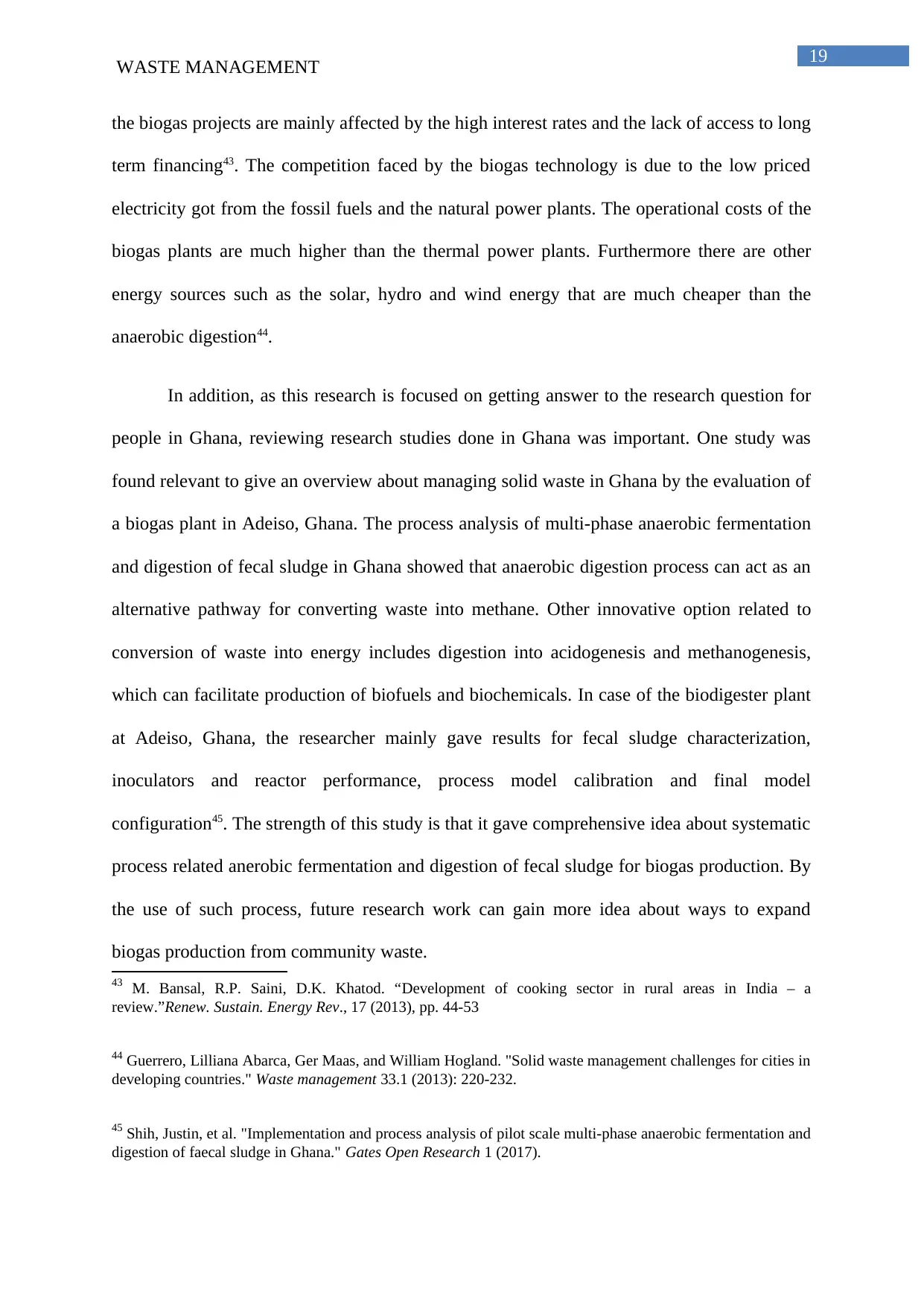
19
WASTE MANAGEMENT
the biogas projects are mainly affected by the high interest rates and the lack of access to long
term financing43. The competition faced by the biogas technology is due to the low priced
electricity got from the fossil fuels and the natural power plants. The operational costs of the
biogas plants are much higher than the thermal power plants. Furthermore there are other
energy sources such as the solar, hydro and wind energy that are much cheaper than the
anaerobic digestion44.
In addition, as this research is focused on getting answer to the research question for
people in Ghana, reviewing research studies done in Ghana was important. One study was
found relevant to give an overview about managing solid waste in Ghana by the evaluation of
a biogas plant in Adeiso, Ghana. The process analysis of multi-phase anaerobic fermentation
and digestion of fecal sludge in Ghana showed that anaerobic digestion process can act as an
alternative pathway for converting waste into methane. Other innovative option related to
conversion of waste into energy includes digestion into acidogenesis and methanogenesis,
which can facilitate production of biofuels and biochemicals. In case of the biodigester plant
at Adeiso, Ghana, the researcher mainly gave results for fecal sludge characterization,
inoculators and reactor performance, process model calibration and final model
configuration45. The strength of this study is that it gave comprehensive idea about systematic
process related anerobic fermentation and digestion of fecal sludge for biogas production. By
the use of such process, future research work can gain more idea about ways to expand
biogas production from community waste.
43 M. Bansal, R.P. Saini, D.K. Khatod. “Development of cooking sector in rural areas in India – a
review.”Renew. Sustain. Energy Rev., 17 (2013), pp. 44-53
44 Guerrero, Lilliana Abarca, Ger Maas, and William Hogland. "Solid waste management challenges for cities in
developing countries." Waste management 33.1 (2013): 220-232.
45 Shih, Justin, et al. "Implementation and process analysis of pilot scale multi-phase anaerobic fermentation and
digestion of faecal sludge in Ghana." Gates Open Research 1 (2017).
WASTE MANAGEMENT
the biogas projects are mainly affected by the high interest rates and the lack of access to long
term financing43. The competition faced by the biogas technology is due to the low priced
electricity got from the fossil fuels and the natural power plants. The operational costs of the
biogas plants are much higher than the thermal power plants. Furthermore there are other
energy sources such as the solar, hydro and wind energy that are much cheaper than the
anaerobic digestion44.
In addition, as this research is focused on getting answer to the research question for
people in Ghana, reviewing research studies done in Ghana was important. One study was
found relevant to give an overview about managing solid waste in Ghana by the evaluation of
a biogas plant in Adeiso, Ghana. The process analysis of multi-phase anaerobic fermentation
and digestion of fecal sludge in Ghana showed that anaerobic digestion process can act as an
alternative pathway for converting waste into methane. Other innovative option related to
conversion of waste into energy includes digestion into acidogenesis and methanogenesis,
which can facilitate production of biofuels and biochemicals. In case of the biodigester plant
at Adeiso, Ghana, the researcher mainly gave results for fecal sludge characterization,
inoculators and reactor performance, process model calibration and final model
configuration45. The strength of this study is that it gave comprehensive idea about systematic
process related anerobic fermentation and digestion of fecal sludge for biogas production. By
the use of such process, future research work can gain more idea about ways to expand
biogas production from community waste.
43 M. Bansal, R.P. Saini, D.K. Khatod. “Development of cooking sector in rural areas in India – a
review.”Renew. Sustain. Energy Rev., 17 (2013), pp. 44-53
44 Guerrero, Lilliana Abarca, Ger Maas, and William Hogland. "Solid waste management challenges for cities in
developing countries." Waste management 33.1 (2013): 220-232.
45 Shih, Justin, et al. "Implementation and process analysis of pilot scale multi-phase anaerobic fermentation and
digestion of faecal sludge in Ghana." Gates Open Research 1 (2017).
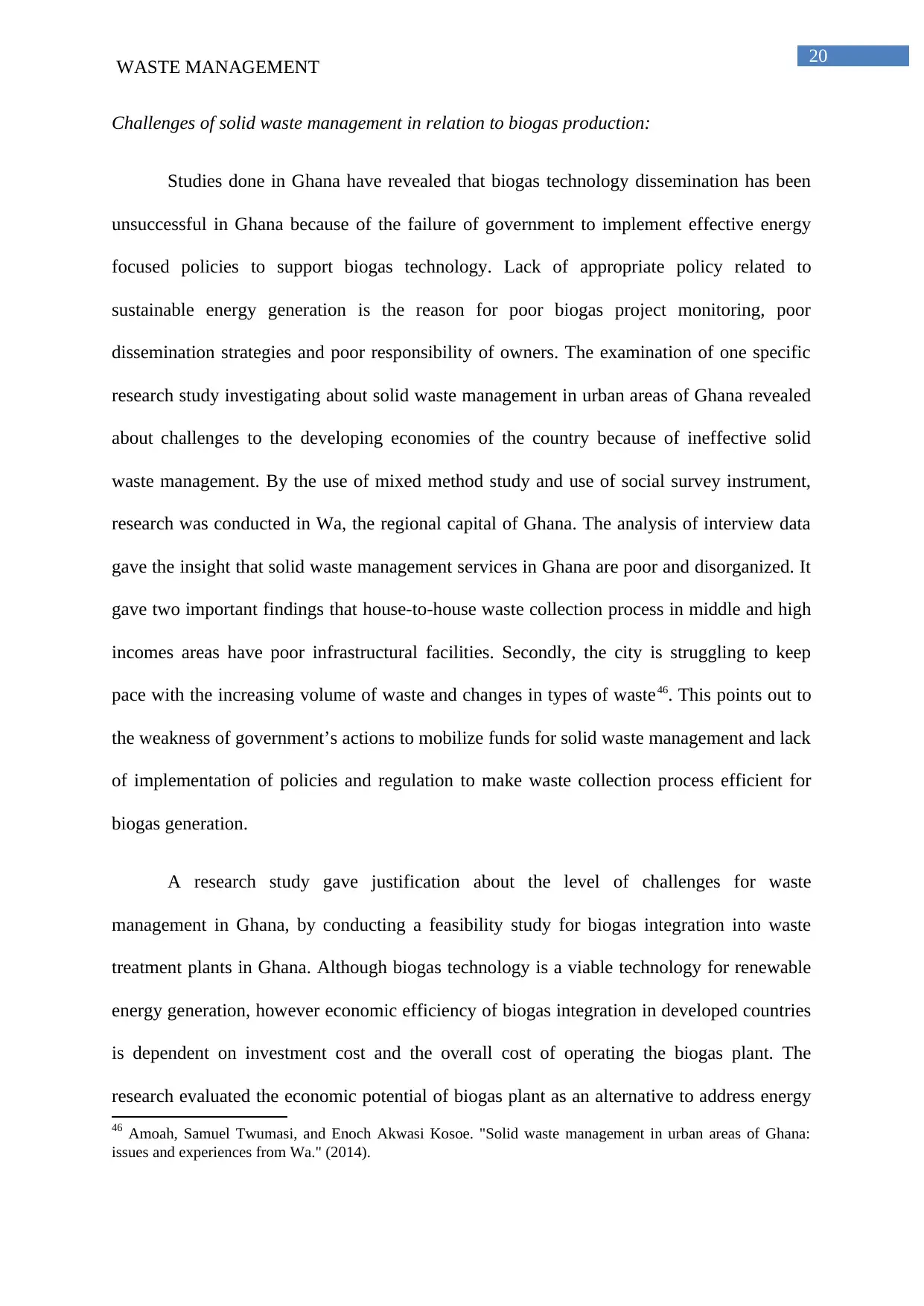
20
WASTE MANAGEMENT
Challenges of solid waste management in relation to biogas production:
Studies done in Ghana have revealed that biogas technology dissemination has been
unsuccessful in Ghana because of the failure of government to implement effective energy
focused policies to support biogas technology. Lack of appropriate policy related to
sustainable energy generation is the reason for poor biogas project monitoring, poor
dissemination strategies and poor responsibility of owners. The examination of one specific
research study investigating about solid waste management in urban areas of Ghana revealed
about challenges to the developing economies of the country because of ineffective solid
waste management. By the use of mixed method study and use of social survey instrument,
research was conducted in Wa, the regional capital of Ghana. The analysis of interview data
gave the insight that solid waste management services in Ghana are poor and disorganized. It
gave two important findings that house-to-house waste collection process in middle and high
incomes areas have poor infrastructural facilities. Secondly, the city is struggling to keep
pace with the increasing volume of waste and changes in types of waste46. This points out to
the weakness of government’s actions to mobilize funds for solid waste management and lack
of implementation of policies and regulation to make waste collection process efficient for
biogas generation.
A research study gave justification about the level of challenges for waste
management in Ghana, by conducting a feasibility study for biogas integration into waste
treatment plants in Ghana. Although biogas technology is a viable technology for renewable
energy generation, however economic efficiency of biogas integration in developed countries
is dependent on investment cost and the overall cost of operating the biogas plant. The
research evaluated the economic potential of biogas plant as an alternative to address energy
46 Amoah, Samuel Twumasi, and Enoch Akwasi Kosoe. "Solid waste management in urban areas of Ghana:
issues and experiences from Wa." (2014).
WASTE MANAGEMENT
Challenges of solid waste management in relation to biogas production:
Studies done in Ghana have revealed that biogas technology dissemination has been
unsuccessful in Ghana because of the failure of government to implement effective energy
focused policies to support biogas technology. Lack of appropriate policy related to
sustainable energy generation is the reason for poor biogas project monitoring, poor
dissemination strategies and poor responsibility of owners. The examination of one specific
research study investigating about solid waste management in urban areas of Ghana revealed
about challenges to the developing economies of the country because of ineffective solid
waste management. By the use of mixed method study and use of social survey instrument,
research was conducted in Wa, the regional capital of Ghana. The analysis of interview data
gave the insight that solid waste management services in Ghana are poor and disorganized. It
gave two important findings that house-to-house waste collection process in middle and high
incomes areas have poor infrastructural facilities. Secondly, the city is struggling to keep
pace with the increasing volume of waste and changes in types of waste46. This points out to
the weakness of government’s actions to mobilize funds for solid waste management and lack
of implementation of policies and regulation to make waste collection process efficient for
biogas generation.
A research study gave justification about the level of challenges for waste
management in Ghana, by conducting a feasibility study for biogas integration into waste
treatment plants in Ghana. Although biogas technology is a viable technology for renewable
energy generation, however economic efficiency of biogas integration in developed countries
is dependent on investment cost and the overall cost of operating the biogas plant. The
research evaluated the economic potential of biogas plant as an alternative to address energy
46 Amoah, Samuel Twumasi, and Enoch Akwasi Kosoe. "Solid waste management in urban areas of Ghana:
issues and experiences from Wa." (2014).
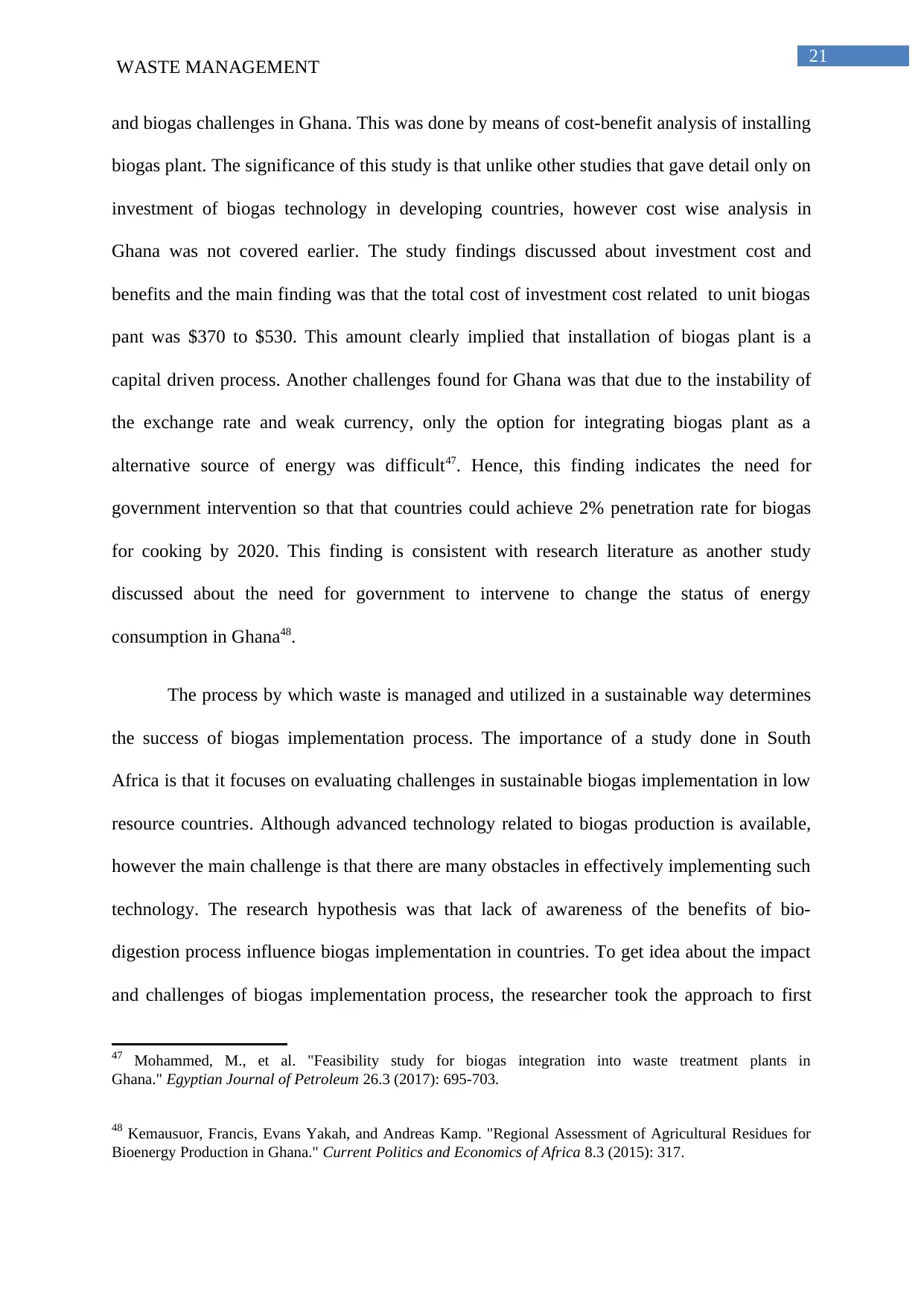
21
WASTE MANAGEMENT
and biogas challenges in Ghana. This was done by means of cost-benefit analysis of installing
biogas plant. The significance of this study is that unlike other studies that gave detail only on
investment of biogas technology in developing countries, however cost wise analysis in
Ghana was not covered earlier. The study findings discussed about investment cost and
benefits and the main finding was that the total cost of investment cost related to unit biogas
pant was $370 to $530. This amount clearly implied that installation of biogas plant is a
capital driven process. Another challenges found for Ghana was that due to the instability of
the exchange rate and weak currency, only the option for integrating biogas plant as a
alternative source of energy was difficult47. Hence, this finding indicates the need for
government intervention so that that countries could achieve 2% penetration rate for biogas
for cooking by 2020. This finding is consistent with research literature as another study
discussed about the need for government to intervene to change the status of energy
consumption in Ghana48.
The process by which waste is managed and utilized in a sustainable way determines
the success of biogas implementation process. The importance of a study done in South
Africa is that it focuses on evaluating challenges in sustainable biogas implementation in low
resource countries. Although advanced technology related to biogas production is available,
however the main challenge is that there are many obstacles in effectively implementing such
technology. The research hypothesis was that lack of awareness of the benefits of bio-
digestion process influence biogas implementation in countries. To get idea about the impact
and challenges of biogas implementation process, the researcher took the approach to first
47 Mohammed, M., et al. "Feasibility study for biogas integration into waste treatment plants in
Ghana." Egyptian Journal of Petroleum 26.3 (2017): 695-703.
48 Kemausuor, Francis, Evans Yakah, and Andreas Kamp. "Regional Assessment of Agricultural Residues for
Bioenergy Production in Ghana." Current Politics and Economics of Africa 8.3 (2015): 317.
WASTE MANAGEMENT
and biogas challenges in Ghana. This was done by means of cost-benefit analysis of installing
biogas plant. The significance of this study is that unlike other studies that gave detail only on
investment of biogas technology in developing countries, however cost wise analysis in
Ghana was not covered earlier. The study findings discussed about investment cost and
benefits and the main finding was that the total cost of investment cost related to unit biogas
pant was $370 to $530. This amount clearly implied that installation of biogas plant is a
capital driven process. Another challenges found for Ghana was that due to the instability of
the exchange rate and weak currency, only the option for integrating biogas plant as a
alternative source of energy was difficult47. Hence, this finding indicates the need for
government intervention so that that countries could achieve 2% penetration rate for biogas
for cooking by 2020. This finding is consistent with research literature as another study
discussed about the need for government to intervene to change the status of energy
consumption in Ghana48.
The process by which waste is managed and utilized in a sustainable way determines
the success of biogas implementation process. The importance of a study done in South
Africa is that it focuses on evaluating challenges in sustainable biogas implementation in low
resource countries. Although advanced technology related to biogas production is available,
however the main challenge is that there are many obstacles in effectively implementing such
technology. The research hypothesis was that lack of awareness of the benefits of bio-
digestion process influence biogas implementation in countries. To get idea about the impact
and challenges of biogas implementation process, the researcher took the approach to first
47 Mohammed, M., et al. "Feasibility study for biogas integration into waste treatment plants in
Ghana." Egyptian Journal of Petroleum 26.3 (2017): 695-703.
48 Kemausuor, Francis, Evans Yakah, and Andreas Kamp. "Regional Assessment of Agricultural Residues for
Bioenergy Production in Ghana." Current Politics and Economics of Africa 8.3 (2015): 317.
Secure Best Marks with AI Grader
Need help grading? Try our AI Grader for instant feedback on your assignments.
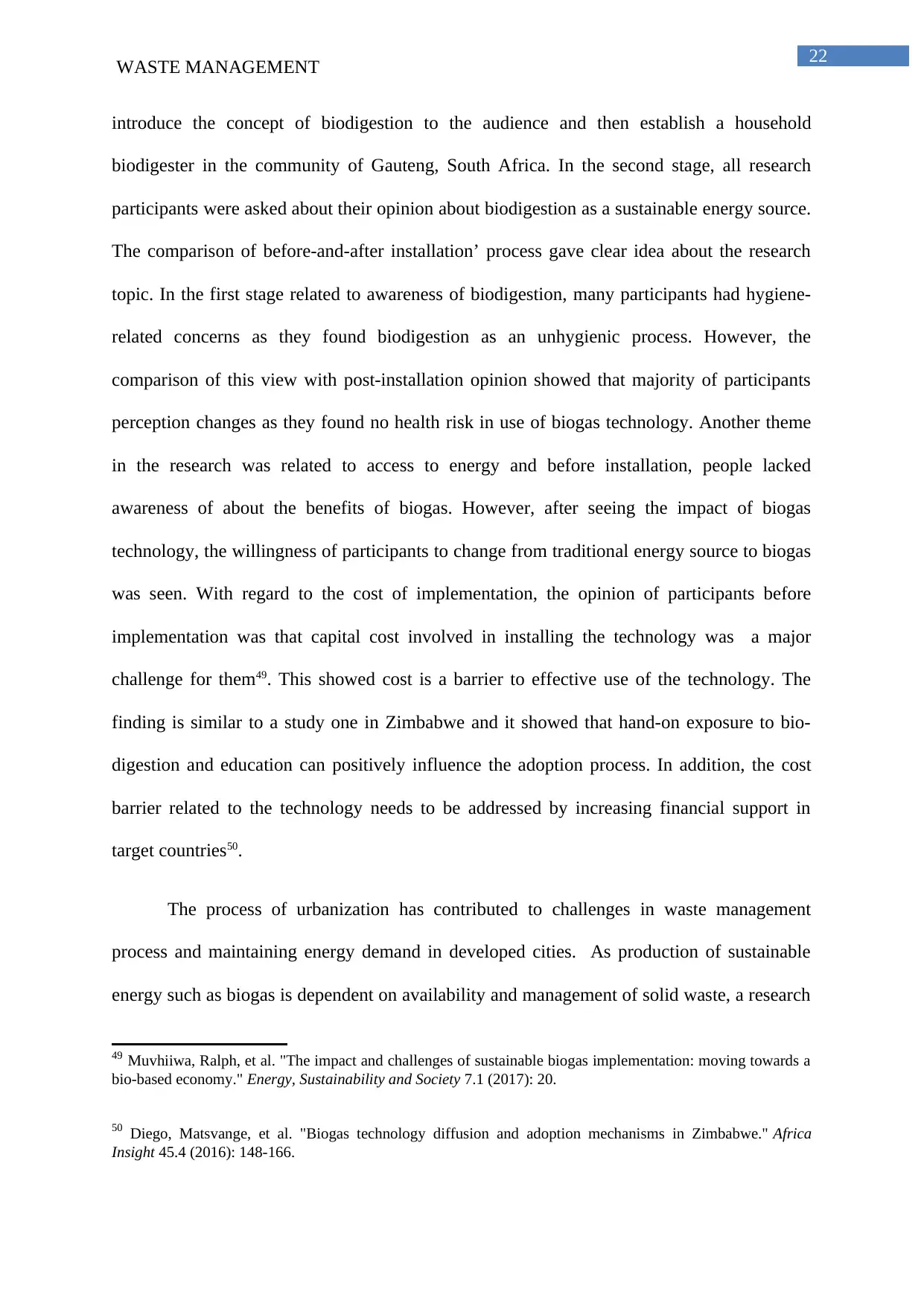
22
WASTE MANAGEMENT
introduce the concept of biodigestion to the audience and then establish a household
biodigester in the community of Gauteng, South Africa. In the second stage, all research
participants were asked about their opinion about biodigestion as a sustainable energy source.
The comparison of before-and-after installation’ process gave clear idea about the research
topic. In the first stage related to awareness of biodigestion, many participants had hygiene-
related concerns as they found biodigestion as an unhygienic process. However, the
comparison of this view with post-installation opinion showed that majority of participants
perception changes as they found no health risk in use of biogas technology. Another theme
in the research was related to access to energy and before installation, people lacked
awareness of about the benefits of biogas. However, after seeing the impact of biogas
technology, the willingness of participants to change from traditional energy source to biogas
was seen. With regard to the cost of implementation, the opinion of participants before
implementation was that capital cost involved in installing the technology was a major
challenge for them49. This showed cost is a barrier to effective use of the technology. The
finding is similar to a study one in Zimbabwe and it showed that hand-on exposure to bio-
digestion and education can positively influence the adoption process. In addition, the cost
barrier related to the technology needs to be addressed by increasing financial support in
target countries50.
The process of urbanization has contributed to challenges in waste management
process and maintaining energy demand in developed cities. As production of sustainable
energy such as biogas is dependent on availability and management of solid waste, a research
49 Muvhiiwa, Ralph, et al. "The impact and challenges of sustainable biogas implementation: moving towards a
bio-based economy." Energy, Sustainability and Society 7.1 (2017): 20.
50 Diego, Matsvange, et al. "Biogas technology diffusion and adoption mechanisms in Zimbabwe." Africa
Insight 45.4 (2016): 148-166.
WASTE MANAGEMENT
introduce the concept of biodigestion to the audience and then establish a household
biodigester in the community of Gauteng, South Africa. In the second stage, all research
participants were asked about their opinion about biodigestion as a sustainable energy source.
The comparison of before-and-after installation’ process gave clear idea about the research
topic. In the first stage related to awareness of biodigestion, many participants had hygiene-
related concerns as they found biodigestion as an unhygienic process. However, the
comparison of this view with post-installation opinion showed that majority of participants
perception changes as they found no health risk in use of biogas technology. Another theme
in the research was related to access to energy and before installation, people lacked
awareness of about the benefits of biogas. However, after seeing the impact of biogas
technology, the willingness of participants to change from traditional energy source to biogas
was seen. With regard to the cost of implementation, the opinion of participants before
implementation was that capital cost involved in installing the technology was a major
challenge for them49. This showed cost is a barrier to effective use of the technology. The
finding is similar to a study one in Zimbabwe and it showed that hand-on exposure to bio-
digestion and education can positively influence the adoption process. In addition, the cost
barrier related to the technology needs to be addressed by increasing financial support in
target countries50.
The process of urbanization has contributed to challenges in waste management
process and maintaining energy demand in developed cities. As production of sustainable
energy such as biogas is dependent on availability and management of solid waste, a research
49 Muvhiiwa, Ralph, et al. "The impact and challenges of sustainable biogas implementation: moving towards a
bio-based economy." Energy, Sustainability and Society 7.1 (2017): 20.
50 Diego, Matsvange, et al. "Biogas technology diffusion and adoption mechanisms in Zimbabwe." Africa
Insight 45.4 (2016): 148-166.
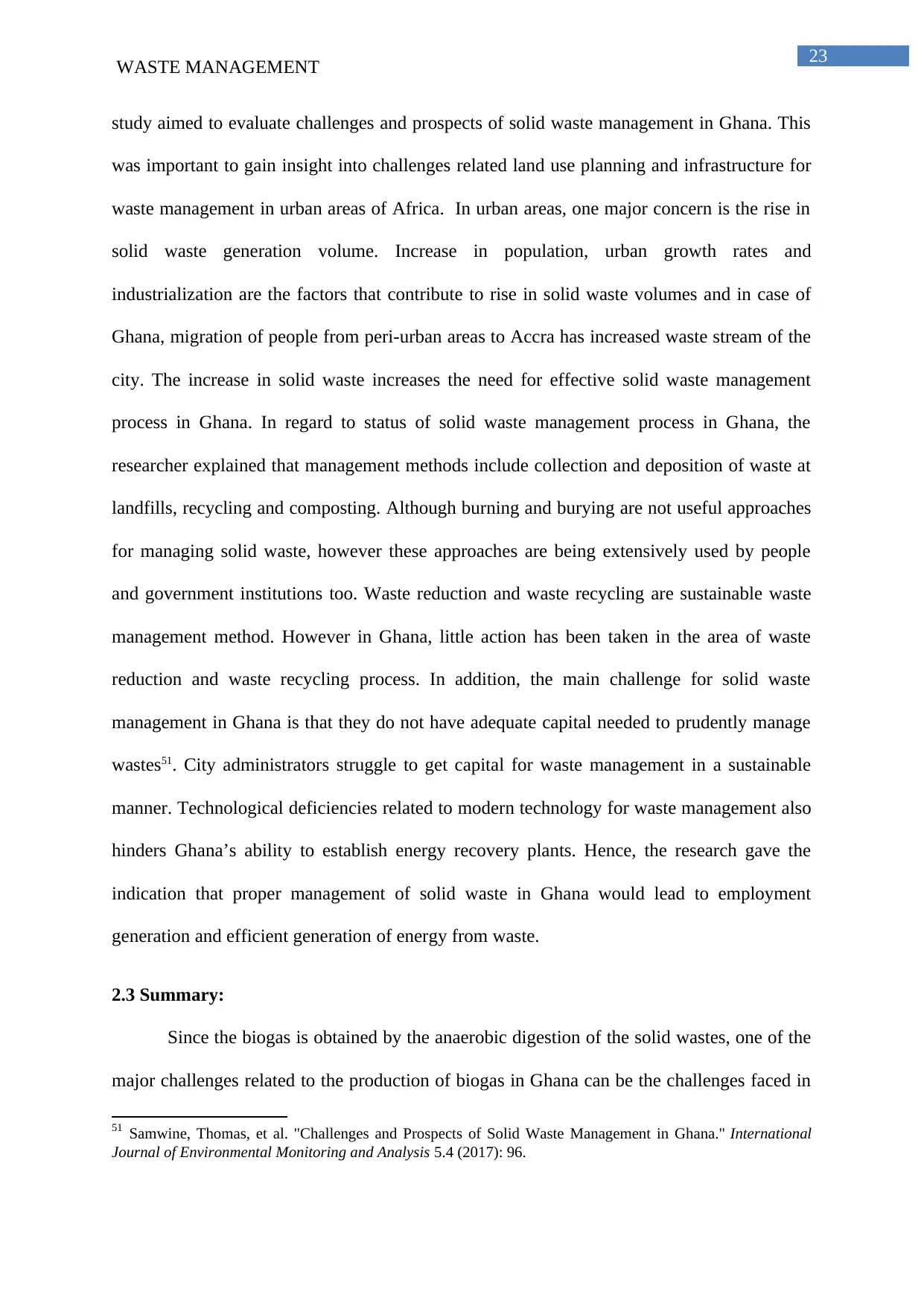
23
WASTE MANAGEMENT
study aimed to evaluate challenges and prospects of solid waste management in Ghana. This
was important to gain insight into challenges related land use planning and infrastructure for
waste management in urban areas of Africa. In urban areas, one major concern is the rise in
solid waste generation volume. Increase in population, urban growth rates and
industrialization are the factors that contribute to rise in solid waste volumes and in case of
Ghana, migration of people from peri-urban areas to Accra has increased waste stream of the
city. The increase in solid waste increases the need for effective solid waste management
process in Ghana. In regard to status of solid waste management process in Ghana, the
researcher explained that management methods include collection and deposition of waste at
landfills, recycling and composting. Although burning and burying are not useful approaches
for managing solid waste, however these approaches are being extensively used by people
and government institutions too. Waste reduction and waste recycling are sustainable waste
management method. However in Ghana, little action has been taken in the area of waste
reduction and waste recycling process. In addition, the main challenge for solid waste
management in Ghana is that they do not have adequate capital needed to prudently manage
wastes51. City administrators struggle to get capital for waste management in a sustainable
manner. Technological deficiencies related to modern technology for waste management also
hinders Ghana’s ability to establish energy recovery plants. Hence, the research gave the
indication that proper management of solid waste in Ghana would lead to employment
generation and efficient generation of energy from waste.
2.3 Summary:
Since the biogas is obtained by the anaerobic digestion of the solid wastes, one of the
major challenges related to the production of biogas in Ghana can be the challenges faced in
51 Samwine, Thomas, et al. "Challenges and Prospects of Solid Waste Management in Ghana." International
Journal of Environmental Monitoring and Analysis 5.4 (2017): 96.
WASTE MANAGEMENT
study aimed to evaluate challenges and prospects of solid waste management in Ghana. This
was important to gain insight into challenges related land use planning and infrastructure for
waste management in urban areas of Africa. In urban areas, one major concern is the rise in
solid waste generation volume. Increase in population, urban growth rates and
industrialization are the factors that contribute to rise in solid waste volumes and in case of
Ghana, migration of people from peri-urban areas to Accra has increased waste stream of the
city. The increase in solid waste increases the need for effective solid waste management
process in Ghana. In regard to status of solid waste management process in Ghana, the
researcher explained that management methods include collection and deposition of waste at
landfills, recycling and composting. Although burning and burying are not useful approaches
for managing solid waste, however these approaches are being extensively used by people
and government institutions too. Waste reduction and waste recycling are sustainable waste
management method. However in Ghana, little action has been taken in the area of waste
reduction and waste recycling process. In addition, the main challenge for solid waste
management in Ghana is that they do not have adequate capital needed to prudently manage
wastes51. City administrators struggle to get capital for waste management in a sustainable
manner. Technological deficiencies related to modern technology for waste management also
hinders Ghana’s ability to establish energy recovery plants. Hence, the research gave the
indication that proper management of solid waste in Ghana would lead to employment
generation and efficient generation of energy from waste.
2.3 Summary:
Since the biogas is obtained by the anaerobic digestion of the solid wastes, one of the
major challenges related to the production of biogas in Ghana can be the challenges faced in
51 Samwine, Thomas, et al. "Challenges and Prospects of Solid Waste Management in Ghana." International
Journal of Environmental Monitoring and Analysis 5.4 (2017): 96.
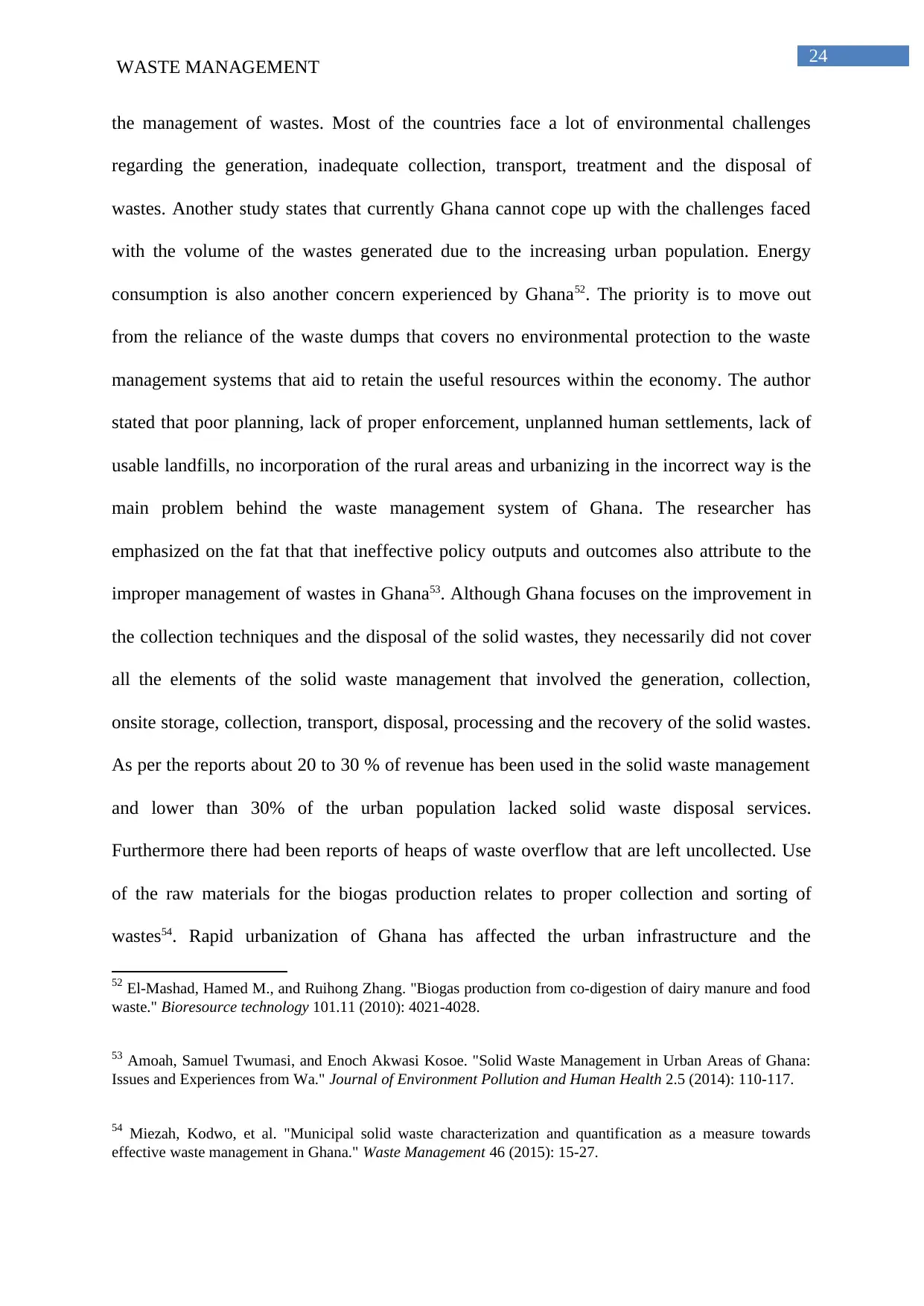
24
WASTE MANAGEMENT
the management of wastes. Most of the countries face a lot of environmental challenges
regarding the generation, inadequate collection, transport, treatment and the disposal of
wastes. Another study states that currently Ghana cannot cope up with the challenges faced
with the volume of the wastes generated due to the increasing urban population. Energy
consumption is also another concern experienced by Ghana52. The priority is to move out
from the reliance of the waste dumps that covers no environmental protection to the waste
management systems that aid to retain the useful resources within the economy. The author
stated that poor planning, lack of proper enforcement, unplanned human settlements, lack of
usable landfills, no incorporation of the rural areas and urbanizing in the incorrect way is the
main problem behind the waste management system of Ghana. The researcher has
emphasized on the fat that that ineffective policy outputs and outcomes also attribute to the
improper management of wastes in Ghana53. Although Ghana focuses on the improvement in
the collection techniques and the disposal of the solid wastes, they necessarily did not cover
all the elements of the solid waste management that involved the generation, collection,
onsite storage, collection, transport, disposal, processing and the recovery of the solid wastes.
As per the reports about 20 to 30 % of revenue has been used in the solid waste management
and lower than 30% of the urban population lacked solid waste disposal services.
Furthermore there had been reports of heaps of waste overflow that are left uncollected. Use
of the raw materials for the biogas production relates to proper collection and sorting of
wastes54. Rapid urbanization of Ghana has affected the urban infrastructure and the
52 El-Mashad, Hamed M., and Ruihong Zhang. "Biogas production from co-digestion of dairy manure and food
waste." Bioresource technology 101.11 (2010): 4021-4028.
53 Amoah, Samuel Twumasi, and Enoch Akwasi Kosoe. "Solid Waste Management in Urban Areas of Ghana:
Issues and Experiences from Wa." Journal of Environment Pollution and Human Health 2.5 (2014): 110-117.
54 Miezah, Kodwo, et al. "Municipal solid waste characterization and quantification as a measure towards
effective waste management in Ghana." Waste Management 46 (2015): 15-27.
WASTE MANAGEMENT
the management of wastes. Most of the countries face a lot of environmental challenges
regarding the generation, inadequate collection, transport, treatment and the disposal of
wastes. Another study states that currently Ghana cannot cope up with the challenges faced
with the volume of the wastes generated due to the increasing urban population. Energy
consumption is also another concern experienced by Ghana52. The priority is to move out
from the reliance of the waste dumps that covers no environmental protection to the waste
management systems that aid to retain the useful resources within the economy. The author
stated that poor planning, lack of proper enforcement, unplanned human settlements, lack of
usable landfills, no incorporation of the rural areas and urbanizing in the incorrect way is the
main problem behind the waste management system of Ghana. The researcher has
emphasized on the fat that that ineffective policy outputs and outcomes also attribute to the
improper management of wastes in Ghana53. Although Ghana focuses on the improvement in
the collection techniques and the disposal of the solid wastes, they necessarily did not cover
all the elements of the solid waste management that involved the generation, collection,
onsite storage, collection, transport, disposal, processing and the recovery of the solid wastes.
As per the reports about 20 to 30 % of revenue has been used in the solid waste management
and lower than 30% of the urban population lacked solid waste disposal services.
Furthermore there had been reports of heaps of waste overflow that are left uncollected. Use
of the raw materials for the biogas production relates to proper collection and sorting of
wastes54. Rapid urbanization of Ghana has affected the urban infrastructure and the
52 El-Mashad, Hamed M., and Ruihong Zhang. "Biogas production from co-digestion of dairy manure and food
waste." Bioresource technology 101.11 (2010): 4021-4028.
53 Amoah, Samuel Twumasi, and Enoch Akwasi Kosoe. "Solid Waste Management in Urban Areas of Ghana:
Issues and Experiences from Wa." Journal of Environment Pollution and Human Health 2.5 (2014): 110-117.
54 Miezah, Kodwo, et al. "Municipal solid waste characterization and quantification as a measure towards
effective waste management in Ghana." Waste Management 46 (2015): 15-27.
Paraphrase This Document
Need a fresh take? Get an instant paraphrase of this document with our AI Paraphraser
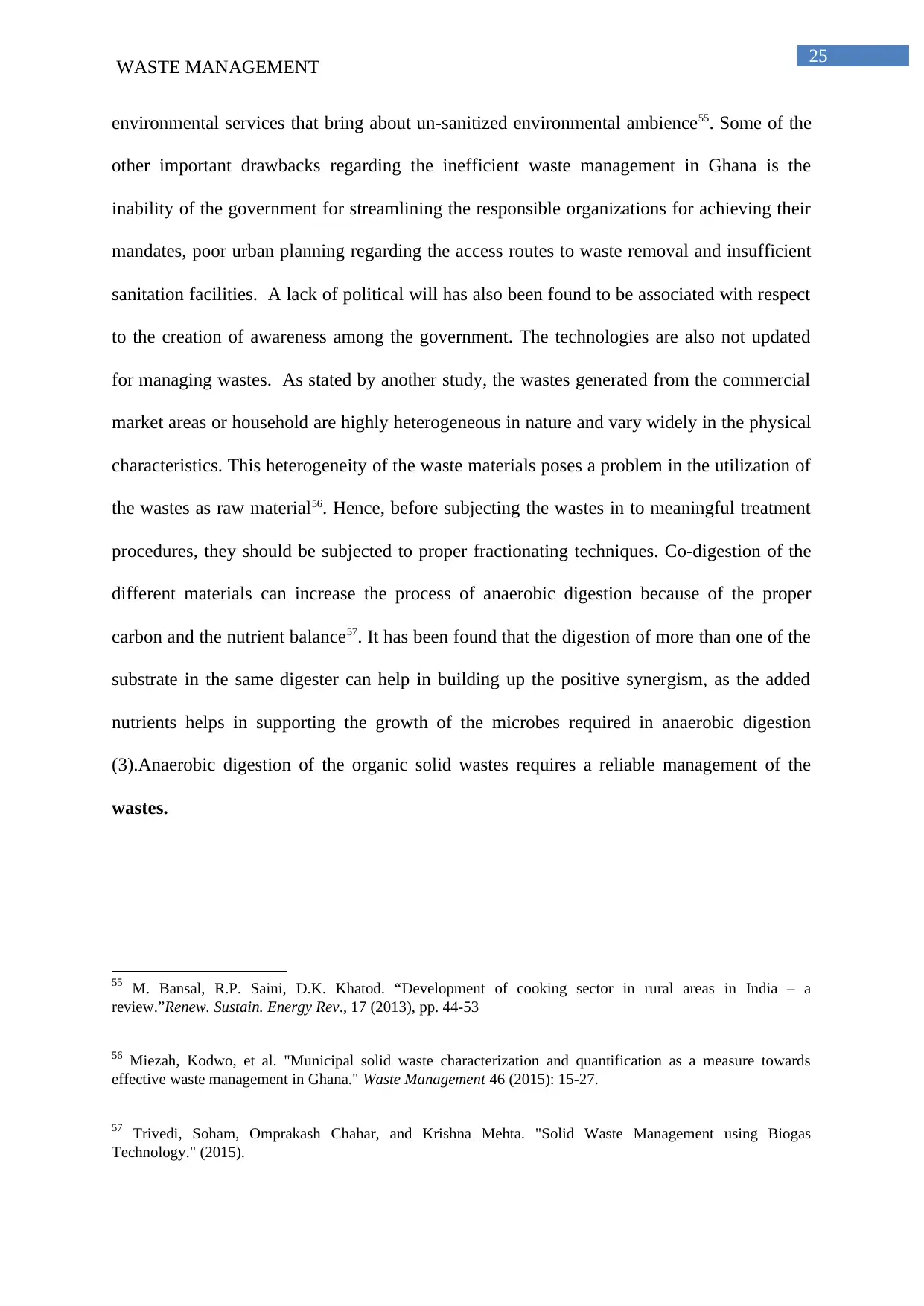
25
WASTE MANAGEMENT
environmental services that bring about un-sanitized environmental ambience55. Some of the
other important drawbacks regarding the inefficient waste management in Ghana is the
inability of the government for streamlining the responsible organizations for achieving their
mandates, poor urban planning regarding the access routes to waste removal and insufficient
sanitation facilities. A lack of political will has also been found to be associated with respect
to the creation of awareness among the government. The technologies are also not updated
for managing wastes. As stated by another study, the wastes generated from the commercial
market areas or household are highly heterogeneous in nature and vary widely in the physical
characteristics. This heterogeneity of the waste materials poses a problem in the utilization of
the wastes as raw material56. Hence, before subjecting the wastes in to meaningful treatment
procedures, they should be subjected to proper fractionating techniques. Co-digestion of the
different materials can increase the process of anaerobic digestion because of the proper
carbon and the nutrient balance57. It has been found that the digestion of more than one of the
substrate in the same digester can help in building up the positive synergism, as the added
nutrients helps in supporting the growth of the microbes required in anaerobic digestion
(3).Anaerobic digestion of the organic solid wastes requires a reliable management of the
wastes.
55 M. Bansal, R.P. Saini, D.K. Khatod. “Development of cooking sector in rural areas in India – a
review.”Renew. Sustain. Energy Rev., 17 (2013), pp. 44-53
56 Miezah, Kodwo, et al. "Municipal solid waste characterization and quantification as a measure towards
effective waste management in Ghana." Waste Management 46 (2015): 15-27.
57 Trivedi, Soham, Omprakash Chahar, and Krishna Mehta. "Solid Waste Management using Biogas
Technology." (2015).
WASTE MANAGEMENT
environmental services that bring about un-sanitized environmental ambience55. Some of the
other important drawbacks regarding the inefficient waste management in Ghana is the
inability of the government for streamlining the responsible organizations for achieving their
mandates, poor urban planning regarding the access routes to waste removal and insufficient
sanitation facilities. A lack of political will has also been found to be associated with respect
to the creation of awareness among the government. The technologies are also not updated
for managing wastes. As stated by another study, the wastes generated from the commercial
market areas or household are highly heterogeneous in nature and vary widely in the physical
characteristics. This heterogeneity of the waste materials poses a problem in the utilization of
the wastes as raw material56. Hence, before subjecting the wastes in to meaningful treatment
procedures, they should be subjected to proper fractionating techniques. Co-digestion of the
different materials can increase the process of anaerobic digestion because of the proper
carbon and the nutrient balance57. It has been found that the digestion of more than one of the
substrate in the same digester can help in building up the positive synergism, as the added
nutrients helps in supporting the growth of the microbes required in anaerobic digestion
(3).Anaerobic digestion of the organic solid wastes requires a reliable management of the
wastes.
55 M. Bansal, R.P. Saini, D.K. Khatod. “Development of cooking sector in rural areas in India – a
review.”Renew. Sustain. Energy Rev., 17 (2013), pp. 44-53
56 Miezah, Kodwo, et al. "Municipal solid waste characterization and quantification as a measure towards
effective waste management in Ghana." Waste Management 46 (2015): 15-27.
57 Trivedi, Soham, Omprakash Chahar, and Krishna Mehta. "Solid Waste Management using Biogas
Technology." (2015).
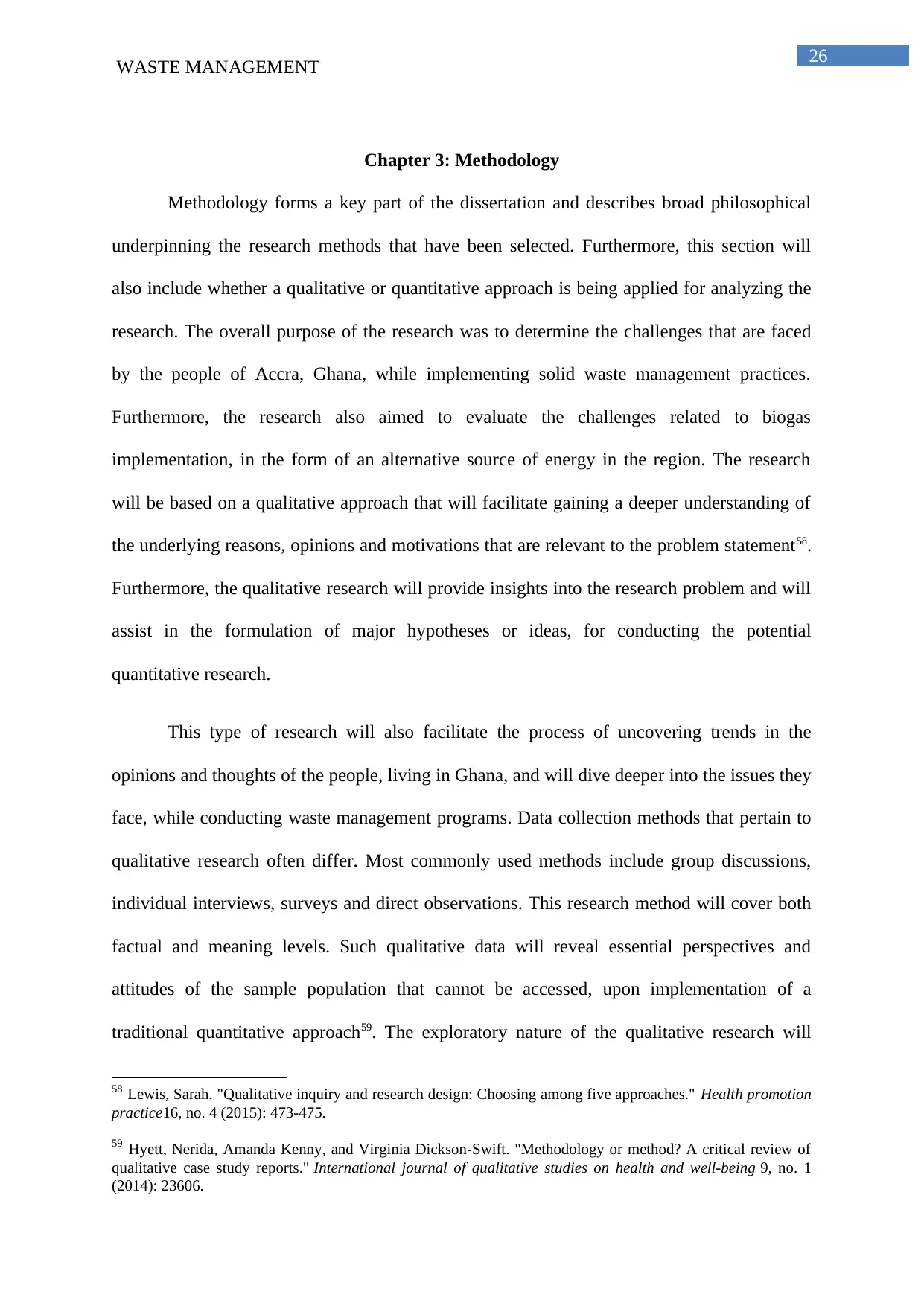
26
WASTE MANAGEMENT
Chapter 3: Methodology
Methodology forms a key part of the dissertation and describes broad philosophical
underpinning the research methods that have been selected. Furthermore, this section will
also include whether a qualitative or quantitative approach is being applied for analyzing the
research. The overall purpose of the research was to determine the challenges that are faced
by the people of Accra, Ghana, while implementing solid waste management practices.
Furthermore, the research also aimed to evaluate the challenges related to biogas
implementation, in the form of an alternative source of energy in the region. The research
will be based on a qualitative approach that will facilitate gaining a deeper understanding of
the underlying reasons, opinions and motivations that are relevant to the problem statement58.
Furthermore, the qualitative research will provide insights into the research problem and will
assist in the formulation of major hypotheses or ideas, for conducting the potential
quantitative research.
This type of research will also facilitate the process of uncovering trends in the
opinions and thoughts of the people, living in Ghana, and will dive deeper into the issues they
face, while conducting waste management programs. Data collection methods that pertain to
qualitative research often differ. Most commonly used methods include group discussions,
individual interviews, surveys and direct observations. This research method will cover both
factual and meaning levels. Such qualitative data will reveal essential perspectives and
attitudes of the sample population that cannot be accessed, upon implementation of a
traditional quantitative approach59. The exploratory nature of the qualitative research will
58 Lewis, Sarah. "Qualitative inquiry and research design: Choosing among five approaches." Health promotion
practice16, no. 4 (2015): 473-475.
59 Hyett, Nerida, Amanda Kenny, and Virginia Dickson-Swift. "Methodology or method? A critical review of
qualitative case study reports." International journal of qualitative studies on health and well-being 9, no. 1
(2014): 23606.
WASTE MANAGEMENT
Chapter 3: Methodology
Methodology forms a key part of the dissertation and describes broad philosophical
underpinning the research methods that have been selected. Furthermore, this section will
also include whether a qualitative or quantitative approach is being applied for analyzing the
research. The overall purpose of the research was to determine the challenges that are faced
by the people of Accra, Ghana, while implementing solid waste management practices.
Furthermore, the research also aimed to evaluate the challenges related to biogas
implementation, in the form of an alternative source of energy in the region. The research
will be based on a qualitative approach that will facilitate gaining a deeper understanding of
the underlying reasons, opinions and motivations that are relevant to the problem statement58.
Furthermore, the qualitative research will provide insights into the research problem and will
assist in the formulation of major hypotheses or ideas, for conducting the potential
quantitative research.
This type of research will also facilitate the process of uncovering trends in the
opinions and thoughts of the people, living in Ghana, and will dive deeper into the issues they
face, while conducting waste management programs. Data collection methods that pertain to
qualitative research often differ. Most commonly used methods include group discussions,
individual interviews, surveys and direct observations. This research method will cover both
factual and meaning levels. Such qualitative data will reveal essential perspectives and
attitudes of the sample population that cannot be accessed, upon implementation of a
traditional quantitative approach59. The exploratory nature of the qualitative research will
58 Lewis, Sarah. "Qualitative inquiry and research design: Choosing among five approaches." Health promotion
practice16, no. 4 (2015): 473-475.
59 Hyett, Nerida, Amanda Kenny, and Virginia Dickson-Swift. "Methodology or method? A critical review of
qualitative case study reports." International journal of qualitative studies on health and well-being 9, no. 1
(2014): 23606.
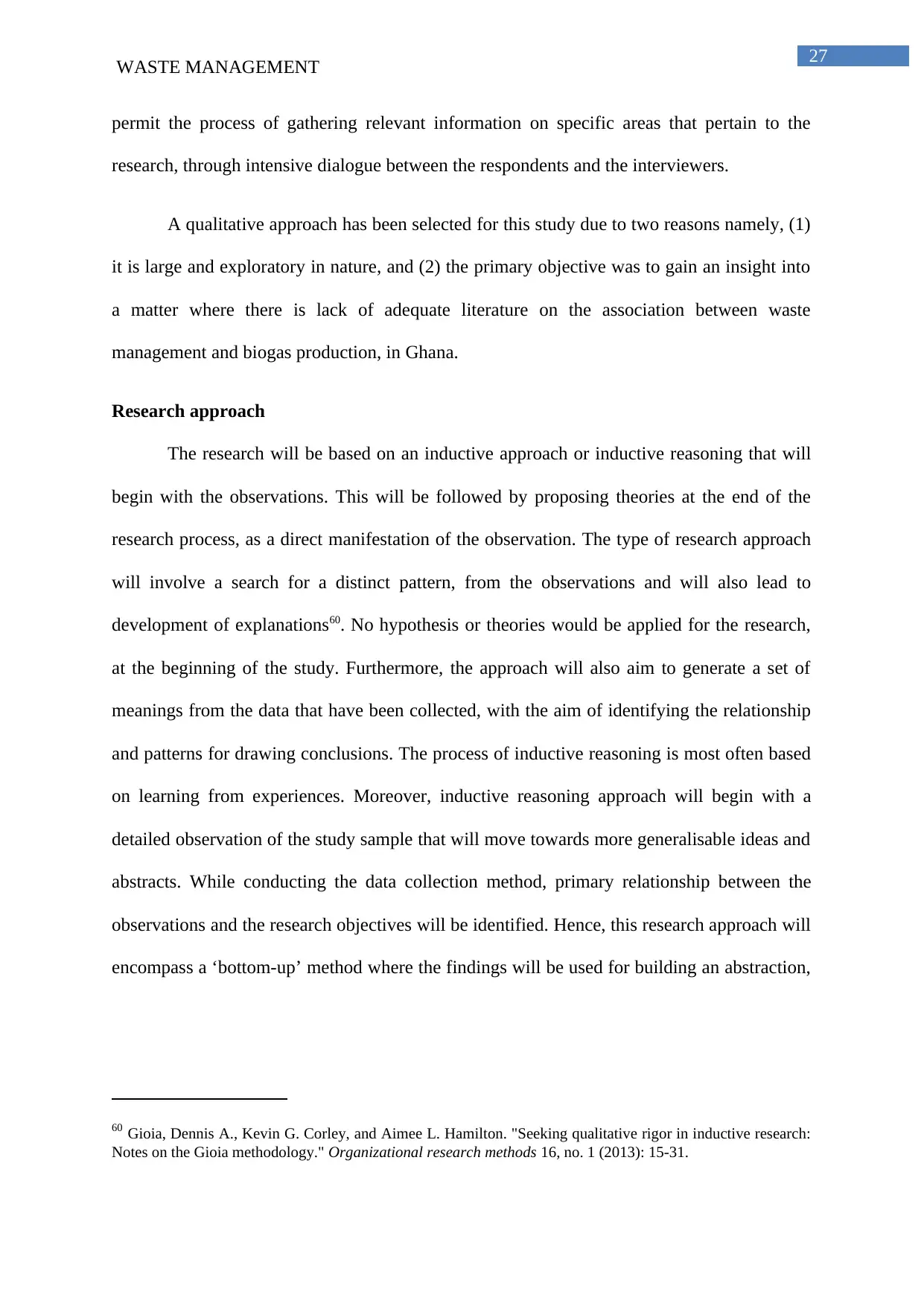
27
WASTE MANAGEMENT
permit the process of gathering relevant information on specific areas that pertain to the
research, through intensive dialogue between the respondents and the interviewers.
A qualitative approach has been selected for this study due to two reasons namely, (1)
it is large and exploratory in nature, and (2) the primary objective was to gain an insight into
a matter where there is lack of adequate literature on the association between waste
management and biogas production, in Ghana.
Research approach
The research will be based on an inductive approach or inductive reasoning that will
begin with the observations. This will be followed by proposing theories at the end of the
research process, as a direct manifestation of the observation. The type of research approach
will involve a search for a distinct pattern, from the observations and will also lead to
development of explanations60. No hypothesis or theories would be applied for the research,
at the beginning of the study. Furthermore, the approach will also aim to generate a set of
meanings from the data that have been collected, with the aim of identifying the relationship
and patterns for drawing conclusions. The process of inductive reasoning is most often based
on learning from experiences. Moreover, inductive reasoning approach will begin with a
detailed observation of the study sample that will move towards more generalisable ideas and
abstracts. While conducting the data collection method, primary relationship between the
observations and the research objectives will be identified. Hence, this research approach will
encompass a ‘bottom-up’ method where the findings will be used for building an abstraction,
60 Gioia, Dennis A., Kevin G. Corley, and Aimee L. Hamilton. "Seeking qualitative rigor in inductive research:
Notes on the Gioia methodology." Organizational research methods 16, no. 1 (2013): 15-31.
WASTE MANAGEMENT
permit the process of gathering relevant information on specific areas that pertain to the
research, through intensive dialogue between the respondents and the interviewers.
A qualitative approach has been selected for this study due to two reasons namely, (1)
it is large and exploratory in nature, and (2) the primary objective was to gain an insight into
a matter where there is lack of adequate literature on the association between waste
management and biogas production, in Ghana.
Research approach
The research will be based on an inductive approach or inductive reasoning that will
begin with the observations. This will be followed by proposing theories at the end of the
research process, as a direct manifestation of the observation. The type of research approach
will involve a search for a distinct pattern, from the observations and will also lead to
development of explanations60. No hypothesis or theories would be applied for the research,
at the beginning of the study. Furthermore, the approach will also aim to generate a set of
meanings from the data that have been collected, with the aim of identifying the relationship
and patterns for drawing conclusions. The process of inductive reasoning is most often based
on learning from experiences. Moreover, inductive reasoning approach will begin with a
detailed observation of the study sample that will move towards more generalisable ideas and
abstracts. While conducting the data collection method, primary relationship between the
observations and the research objectives will be identified. Hence, this research approach will
encompass a ‘bottom-up’ method where the findings will be used for building an abstraction,
60 Gioia, Dennis A., Kevin G. Corley, and Aimee L. Hamilton. "Seeking qualitative rigor in inductive research:
Notes on the Gioia methodology." Organizational research methods 16, no. 1 (2013): 15-31.
Secure Best Marks with AI Grader
Need help grading? Try our AI Grader for instant feedback on your assignments.
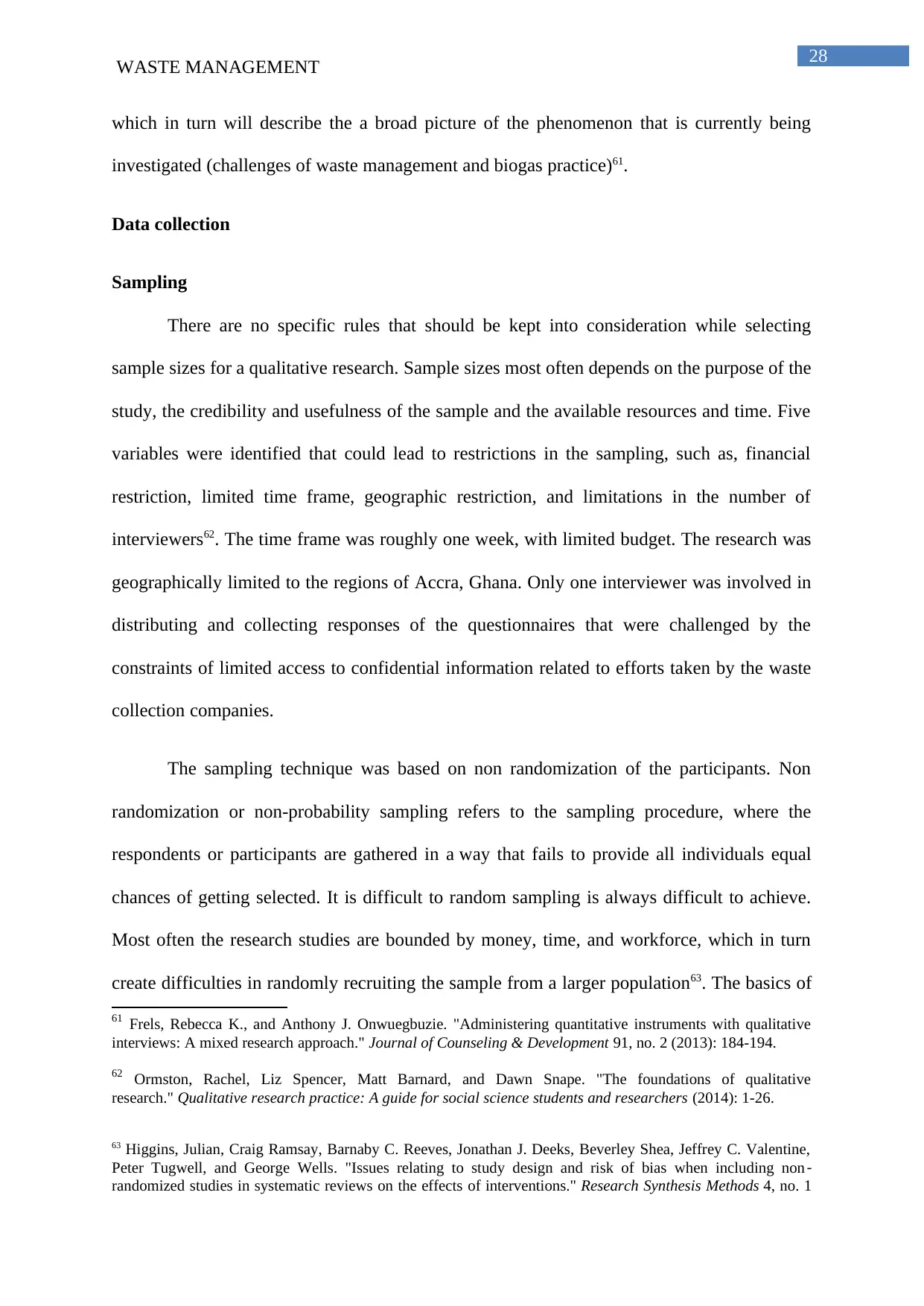
28
WASTE MANAGEMENT
which in turn will describe the a broad picture of the phenomenon that is currently being
investigated (challenges of waste management and biogas practice)61.
Data collection
Sampling
There are no specific rules that should be kept into consideration while selecting
sample sizes for a qualitative research. Sample sizes most often depends on the purpose of the
study, the credibility and usefulness of the sample and the available resources and time. Five
variables were identified that could lead to restrictions in the sampling, such as, financial
restriction, limited time frame, geographic restriction, and limitations in the number of
interviewers62. The time frame was roughly one week, with limited budget. The research was
geographically limited to the regions of Accra, Ghana. Only one interviewer was involved in
distributing and collecting responses of the questionnaires that were challenged by the
constraints of limited access to confidential information related to efforts taken by the waste
collection companies.
The sampling technique was based on non randomization of the participants. Non
randomization or non-probability sampling refers to the sampling procedure, where the
respondents or participants are gathered in a way that fails to provide all individuals equal
chances of getting selected. It is difficult to random sampling is always difficult to achieve.
Most often the research studies are bounded by money, time, and workforce, which in turn
create difficulties in randomly recruiting the sample from a larger population63. The basics of
61 Frels, Rebecca K., and Anthony J. Onwuegbuzie. "Administering quantitative instruments with qualitative
interviews: A mixed research approach." Journal of Counseling & Development 91, no. 2 (2013): 184-194.
62 Ormston, Rachel, Liz Spencer, Matt Barnard, and Dawn Snape. "The foundations of qualitative
research." Qualitative research practice: A guide for social science students and researchers (2014): 1-26.
63 Higgins, Julian, Craig Ramsay, Barnaby C. Reeves, Jonathan J. Deeks, Beverley Shea, Jeffrey C. Valentine,
Peter Tugwell, and George Wells. "Issues relating to study design and risk of bias when including non ‐
randomized studies in systematic reviews on the effects of interventions." Research Synthesis Methods 4, no. 1
WASTE MANAGEMENT
which in turn will describe the a broad picture of the phenomenon that is currently being
investigated (challenges of waste management and biogas practice)61.
Data collection
Sampling
There are no specific rules that should be kept into consideration while selecting
sample sizes for a qualitative research. Sample sizes most often depends on the purpose of the
study, the credibility and usefulness of the sample and the available resources and time. Five
variables were identified that could lead to restrictions in the sampling, such as, financial
restriction, limited time frame, geographic restriction, and limitations in the number of
interviewers62. The time frame was roughly one week, with limited budget. The research was
geographically limited to the regions of Accra, Ghana. Only one interviewer was involved in
distributing and collecting responses of the questionnaires that were challenged by the
constraints of limited access to confidential information related to efforts taken by the waste
collection companies.
The sampling technique was based on non randomization of the participants. Non
randomization or non-probability sampling refers to the sampling procedure, where the
respondents or participants are gathered in a way that fails to provide all individuals equal
chances of getting selected. It is difficult to random sampling is always difficult to achieve.
Most often the research studies are bounded by money, time, and workforce, which in turn
create difficulties in randomly recruiting the sample from a larger population63. The basics of
61 Frels, Rebecca K., and Anthony J. Onwuegbuzie. "Administering quantitative instruments with qualitative
interviews: A mixed research approach." Journal of Counseling & Development 91, no. 2 (2013): 184-194.
62 Ormston, Rachel, Liz Spencer, Matt Barnard, and Dawn Snape. "The foundations of qualitative
research." Qualitative research practice: A guide for social science students and researchers (2014): 1-26.
63 Higgins, Julian, Craig Ramsay, Barnaby C. Reeves, Jonathan J. Deeks, Beverley Shea, Jeffrey C. Valentine,
Peter Tugwell, and George Wells. "Issues relating to study design and risk of bias when including non ‐
randomized studies in systematic reviews on the effects of interventions." Research Synthesis Methods 4, no. 1
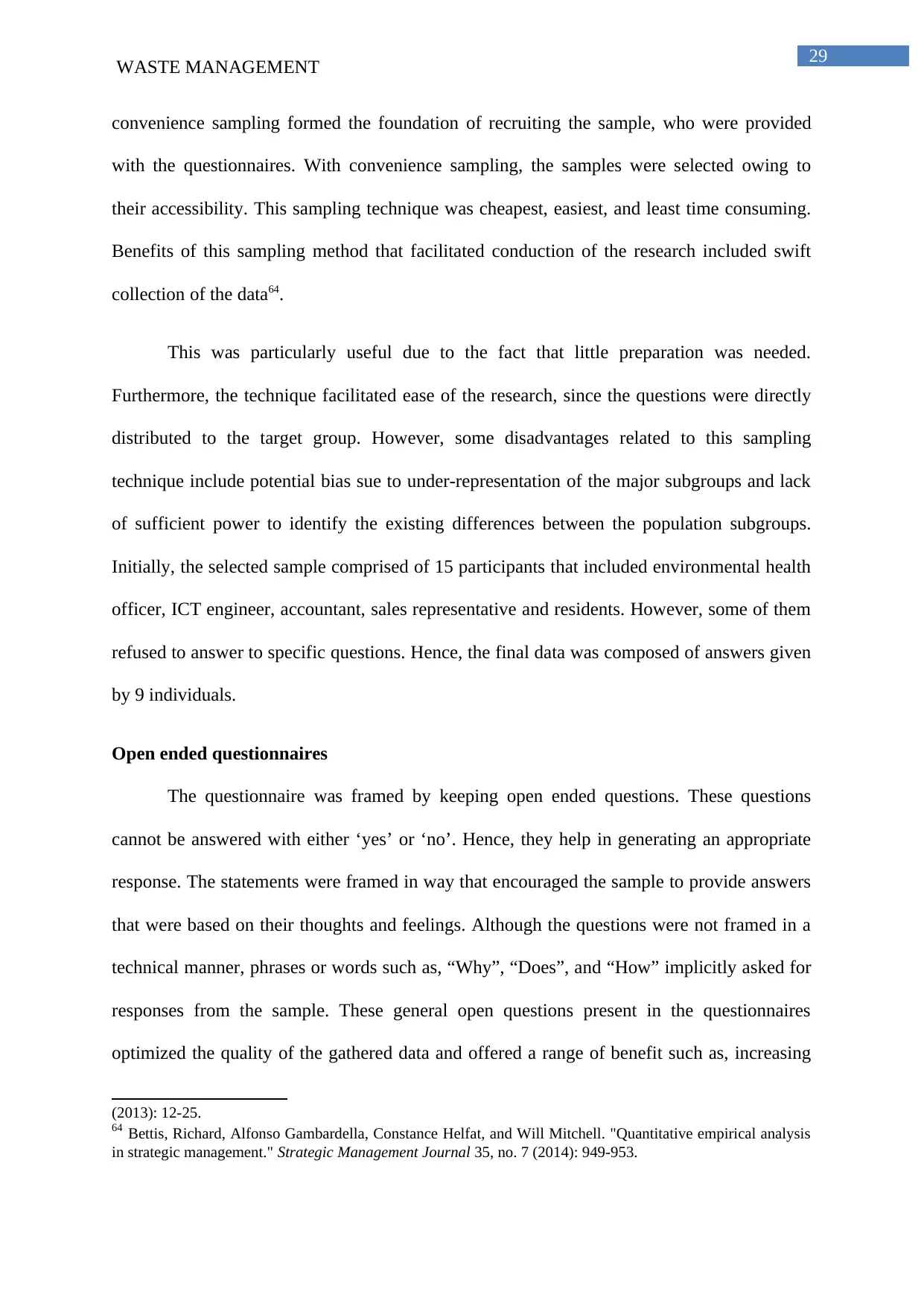
29
WASTE MANAGEMENT
convenience sampling formed the foundation of recruiting the sample, who were provided
with the questionnaires. With convenience sampling, the samples were selected owing to
their accessibility. This sampling technique was cheapest, easiest, and least time consuming.
Benefits of this sampling method that facilitated conduction of the research included swift
collection of the data64.
This was particularly useful due to the fact that little preparation was needed.
Furthermore, the technique facilitated ease of the research, since the questions were directly
distributed to the target group. However, some disadvantages related to this sampling
technique include potential bias sue to under-representation of the major subgroups and lack
of sufficient power to identify the existing differences between the population subgroups.
Initially, the selected sample comprised of 15 participants that included environmental health
officer, ICT engineer, accountant, sales representative and residents. However, some of them
refused to answer to specific questions. Hence, the final data was composed of answers given
by 9 individuals.
Open ended questionnaires
The questionnaire was framed by keeping open ended questions. These questions
cannot be answered with either ‘yes’ or ‘no’. Hence, they help in generating an appropriate
response. The statements were framed in way that encouraged the sample to provide answers
that were based on their thoughts and feelings. Although the questions were not framed in a
technical manner, phrases or words such as, “Why”, “Does”, and “How” implicitly asked for
responses from the sample. These general open questions present in the questionnaires
optimized the quality of the gathered data and offered a range of benefit such as, increasing
(2013): 12-25.
64 Bettis, Richard, Alfonso Gambardella, Constance Helfat, and Will Mitchell. "Quantitative empirical analysis
in strategic management." Strategic Management Journal 35, no. 7 (2014): 949-953.
WASTE MANAGEMENT
convenience sampling formed the foundation of recruiting the sample, who were provided
with the questionnaires. With convenience sampling, the samples were selected owing to
their accessibility. This sampling technique was cheapest, easiest, and least time consuming.
Benefits of this sampling method that facilitated conduction of the research included swift
collection of the data64.
This was particularly useful due to the fact that little preparation was needed.
Furthermore, the technique facilitated ease of the research, since the questions were directly
distributed to the target group. However, some disadvantages related to this sampling
technique include potential bias sue to under-representation of the major subgroups and lack
of sufficient power to identify the existing differences between the population subgroups.
Initially, the selected sample comprised of 15 participants that included environmental health
officer, ICT engineer, accountant, sales representative and residents. However, some of them
refused to answer to specific questions. Hence, the final data was composed of answers given
by 9 individuals.
Open ended questionnaires
The questionnaire was framed by keeping open ended questions. These questions
cannot be answered with either ‘yes’ or ‘no’. Hence, they help in generating an appropriate
response. The statements were framed in way that encouraged the sample to provide answers
that were based on their thoughts and feelings. Although the questions were not framed in a
technical manner, phrases or words such as, “Why”, “Does”, and “How” implicitly asked for
responses from the sample. These general open questions present in the questionnaires
optimized the quality of the gathered data and offered a range of benefit such as, increasing
(2013): 12-25.
64 Bettis, Richard, Alfonso Gambardella, Constance Helfat, and Will Mitchell. "Quantitative empirical analysis
in strategic management." Strategic Management Journal 35, no. 7 (2014): 949-953.
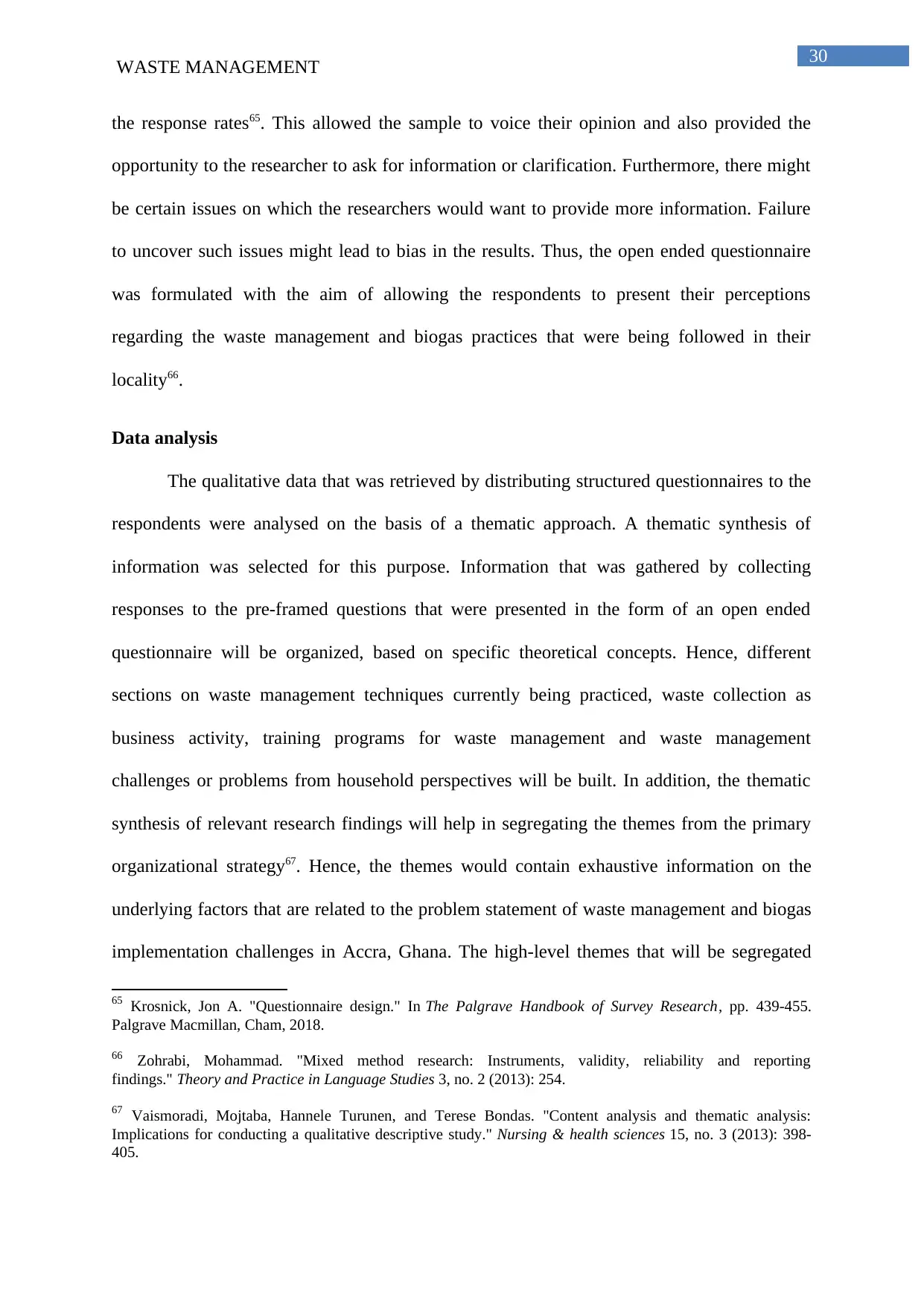
30
WASTE MANAGEMENT
the response rates65. This allowed the sample to voice their opinion and also provided the
opportunity to the researcher to ask for information or clarification. Furthermore, there might
be certain issues on which the researchers would want to provide more information. Failure
to uncover such issues might lead to bias in the results. Thus, the open ended questionnaire
was formulated with the aim of allowing the respondents to present their perceptions
regarding the waste management and biogas practices that were being followed in their
locality66.
Data analysis
The qualitative data that was retrieved by distributing structured questionnaires to the
respondents were analysed on the basis of a thematic approach. A thematic synthesis of
information was selected for this purpose. Information that was gathered by collecting
responses to the pre-framed questions that were presented in the form of an open ended
questionnaire will be organized, based on specific theoretical concepts. Hence, different
sections on waste management techniques currently being practiced, waste collection as
business activity, training programs for waste management and waste management
challenges or problems from household perspectives will be built. In addition, the thematic
synthesis of relevant research findings will help in segregating the themes from the primary
organizational strategy67. Hence, the themes would contain exhaustive information on the
underlying factors that are related to the problem statement of waste management and biogas
implementation challenges in Accra, Ghana. The high-level themes that will be segregated
65 Krosnick, Jon A. "Questionnaire design." In The Palgrave Handbook of Survey Research, pp. 439-455.
Palgrave Macmillan, Cham, 2018.
66 Zohrabi, Mohammad. "Mixed method research: Instruments, validity, reliability and reporting
findings." Theory and Practice in Language Studies 3, no. 2 (2013): 254.
67 Vaismoradi, Mojtaba, Hannele Turunen, and Terese Bondas. "Content analysis and thematic analysis:
Implications for conducting a qualitative descriptive study." Nursing & health sciences 15, no. 3 (2013): 398-
405.
WASTE MANAGEMENT
the response rates65. This allowed the sample to voice their opinion and also provided the
opportunity to the researcher to ask for information or clarification. Furthermore, there might
be certain issues on which the researchers would want to provide more information. Failure
to uncover such issues might lead to bias in the results. Thus, the open ended questionnaire
was formulated with the aim of allowing the respondents to present their perceptions
regarding the waste management and biogas practices that were being followed in their
locality66.
Data analysis
The qualitative data that was retrieved by distributing structured questionnaires to the
respondents were analysed on the basis of a thematic approach. A thematic synthesis of
information was selected for this purpose. Information that was gathered by collecting
responses to the pre-framed questions that were presented in the form of an open ended
questionnaire will be organized, based on specific theoretical concepts. Hence, different
sections on waste management techniques currently being practiced, waste collection as
business activity, training programs for waste management and waste management
challenges or problems from household perspectives will be built. In addition, the thematic
synthesis of relevant research findings will help in segregating the themes from the primary
organizational strategy67. Hence, the themes would contain exhaustive information on the
underlying factors that are related to the problem statement of waste management and biogas
implementation challenges in Accra, Ghana. The high-level themes that will be segregated
65 Krosnick, Jon A. "Questionnaire design." In The Palgrave Handbook of Survey Research, pp. 439-455.
Palgrave Macmillan, Cham, 2018.
66 Zohrabi, Mohammad. "Mixed method research: Instruments, validity, reliability and reporting
findings." Theory and Practice in Language Studies 3, no. 2 (2013): 254.
67 Vaismoradi, Mojtaba, Hannele Turunen, and Terese Bondas. "Content analysis and thematic analysis:
Implications for conducting a qualitative descriptive study." Nursing & health sciences 15, no. 3 (2013): 398-
405.
Paraphrase This Document
Need a fresh take? Get an instant paraphrase of this document with our AI Paraphraser
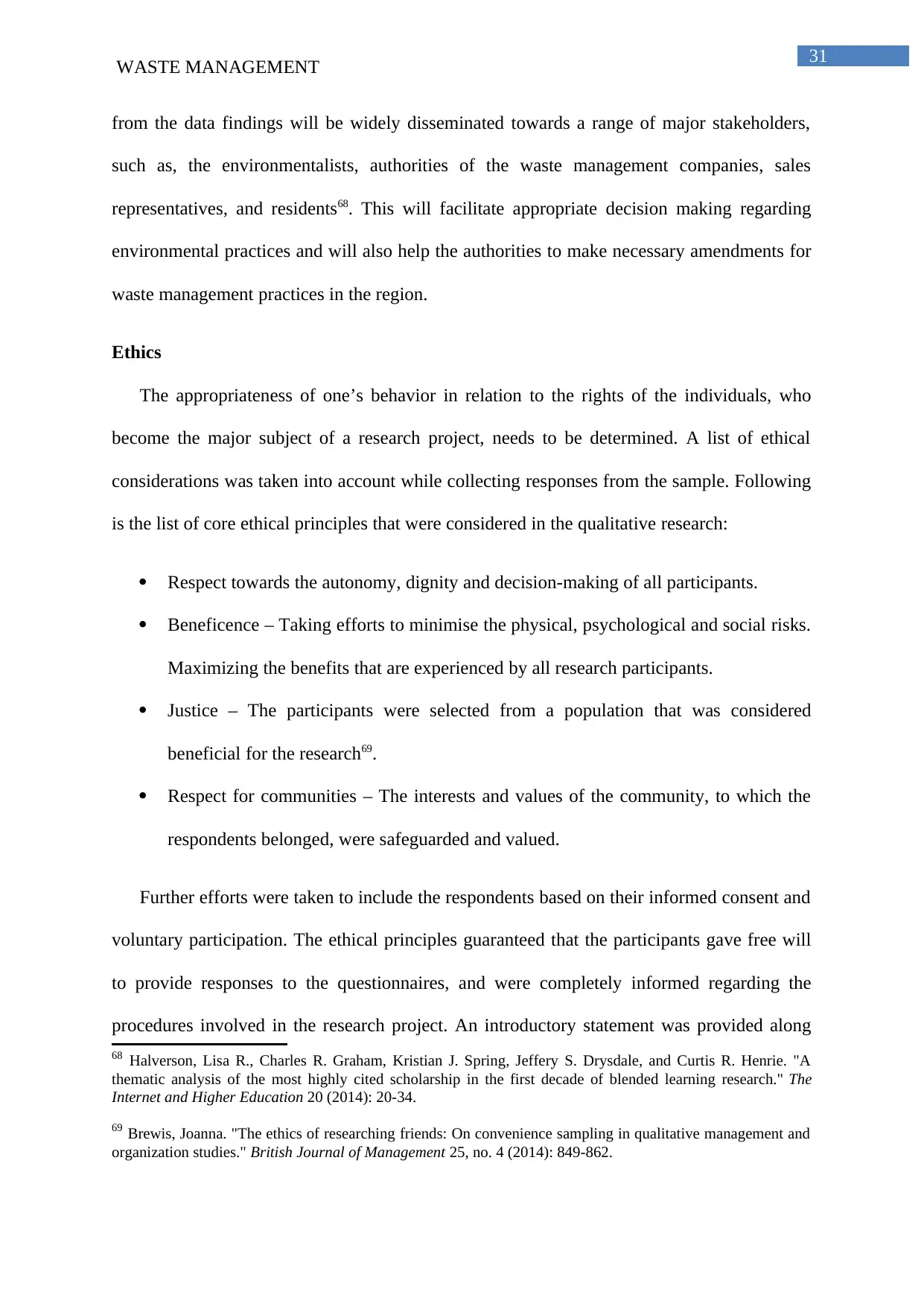
31
WASTE MANAGEMENT
from the data findings will be widely disseminated towards a range of major stakeholders,
such as, the environmentalists, authorities of the waste management companies, sales
representatives, and residents68. This will facilitate appropriate decision making regarding
environmental practices and will also help the authorities to make necessary amendments for
waste management practices in the region.
Ethics
The appropriateness of one’s behavior in relation to the rights of the individuals, who
become the major subject of a research project, needs to be determined. A list of ethical
considerations was taken into account while collecting responses from the sample. Following
is the list of core ethical principles that were considered in the qualitative research:
Respect towards the autonomy, dignity and decision-making of all participants.
Beneficence – Taking efforts to minimise the physical, psychological and social risks.
Maximizing the benefits that are experienced by all research participants.
Justice – The participants were selected from a population that was considered
beneficial for the research69.
Respect for communities – The interests and values of the community, to which the
respondents belonged, were safeguarded and valued.
Further efforts were taken to include the respondents based on their informed consent and
voluntary participation. The ethical principles guaranteed that the participants gave free will
to provide responses to the questionnaires, and were completely informed regarding the
procedures involved in the research project. An introductory statement was provided along
68 Halverson, Lisa R., Charles R. Graham, Kristian J. Spring, Jeffery S. Drysdale, and Curtis R. Henrie. "A
thematic analysis of the most highly cited scholarship in the first decade of blended learning research." The
Internet and Higher Education 20 (2014): 20-34.
69 Brewis, Joanna. "The ethics of researching friends: On convenience sampling in qualitative management and
organization studies." British Journal of Management 25, no. 4 (2014): 849-862.
WASTE MANAGEMENT
from the data findings will be widely disseminated towards a range of major stakeholders,
such as, the environmentalists, authorities of the waste management companies, sales
representatives, and residents68. This will facilitate appropriate decision making regarding
environmental practices and will also help the authorities to make necessary amendments for
waste management practices in the region.
Ethics
The appropriateness of one’s behavior in relation to the rights of the individuals, who
become the major subject of a research project, needs to be determined. A list of ethical
considerations was taken into account while collecting responses from the sample. Following
is the list of core ethical principles that were considered in the qualitative research:
Respect towards the autonomy, dignity and decision-making of all participants.
Beneficence – Taking efforts to minimise the physical, psychological and social risks.
Maximizing the benefits that are experienced by all research participants.
Justice – The participants were selected from a population that was considered
beneficial for the research69.
Respect for communities – The interests and values of the community, to which the
respondents belonged, were safeguarded and valued.
Further efforts were taken to include the respondents based on their informed consent and
voluntary participation. The ethical principles guaranteed that the participants gave free will
to provide responses to the questionnaires, and were completely informed regarding the
procedures involved in the research project. An introductory statement was provided along
68 Halverson, Lisa R., Charles R. Graham, Kristian J. Spring, Jeffery S. Drysdale, and Curtis R. Henrie. "A
thematic analysis of the most highly cited scholarship in the first decade of blended learning research." The
Internet and Higher Education 20 (2014): 20-34.
69 Brewis, Joanna. "The ethics of researching friends: On convenience sampling in qualitative management and
organization studies." British Journal of Management 25, no. 4 (2014): 849-862.

32
WASTE MANAGEMENT
with the questionnaires that provided relevant information regarding the objective, intent,
sponsoring organization and potential use of the research. Thus, the potential respondents
were fully informed, prior to filling in the questionnaires.
WASTE MANAGEMENT
with the questionnaires that provided relevant information regarding the objective, intent,
sponsoring organization and potential use of the research. Thus, the potential respondents
were fully informed, prior to filling in the questionnaires.
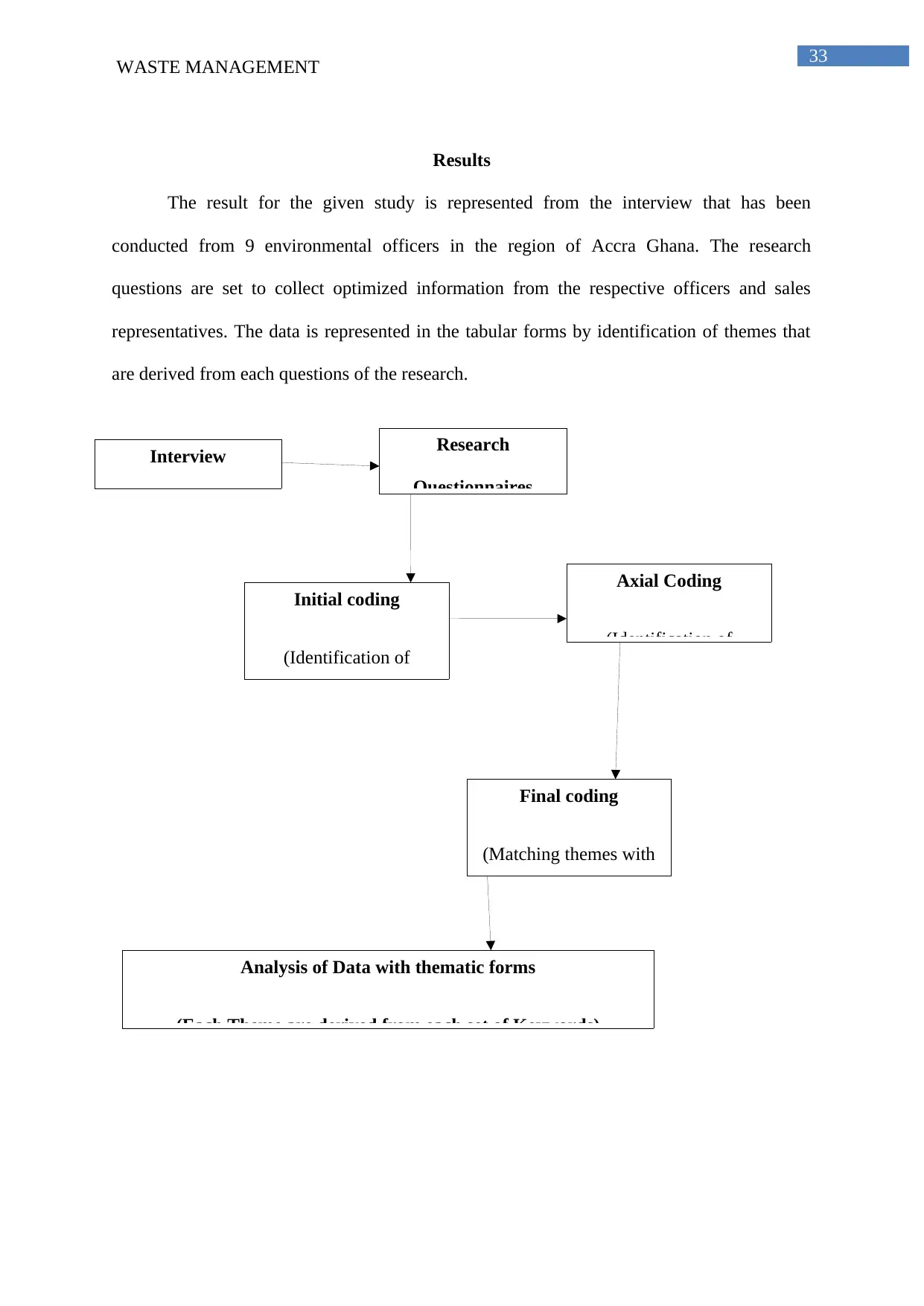
33
WASTE MANAGEMENT
Results
The result for the given study is represented from the interview that has been
conducted from 9 environmental officers in the region of Accra Ghana. The research
questions are set to collect optimized information from the respective officers and sales
representatives. The data is represented in the tabular forms by identification of themes that
are derived from each questions of the research.
Initial coding
(Identification of
Primary keywords)
Axial Coding
(Identification of
Final coding
(Matching themes with
the Objectives)
Interview Research
Questionnaires
Analysis of Data with thematic forms
(Each Theme are derived from each set of Keywords)
WASTE MANAGEMENT
Results
The result for the given study is represented from the interview that has been
conducted from 9 environmental officers in the region of Accra Ghana. The research
questions are set to collect optimized information from the respective officers and sales
representatives. The data is represented in the tabular forms by identification of themes that
are derived from each questions of the research.
Initial coding
(Identification of
Primary keywords)
Axial Coding
(Identification of
Final coding
(Matching themes with
the Objectives)
Interview Research
Questionnaires
Analysis of Data with thematic forms
(Each Theme are derived from each set of Keywords)
Secure Best Marks with AI Grader
Need help grading? Try our AI Grader for instant feedback on your assignments.
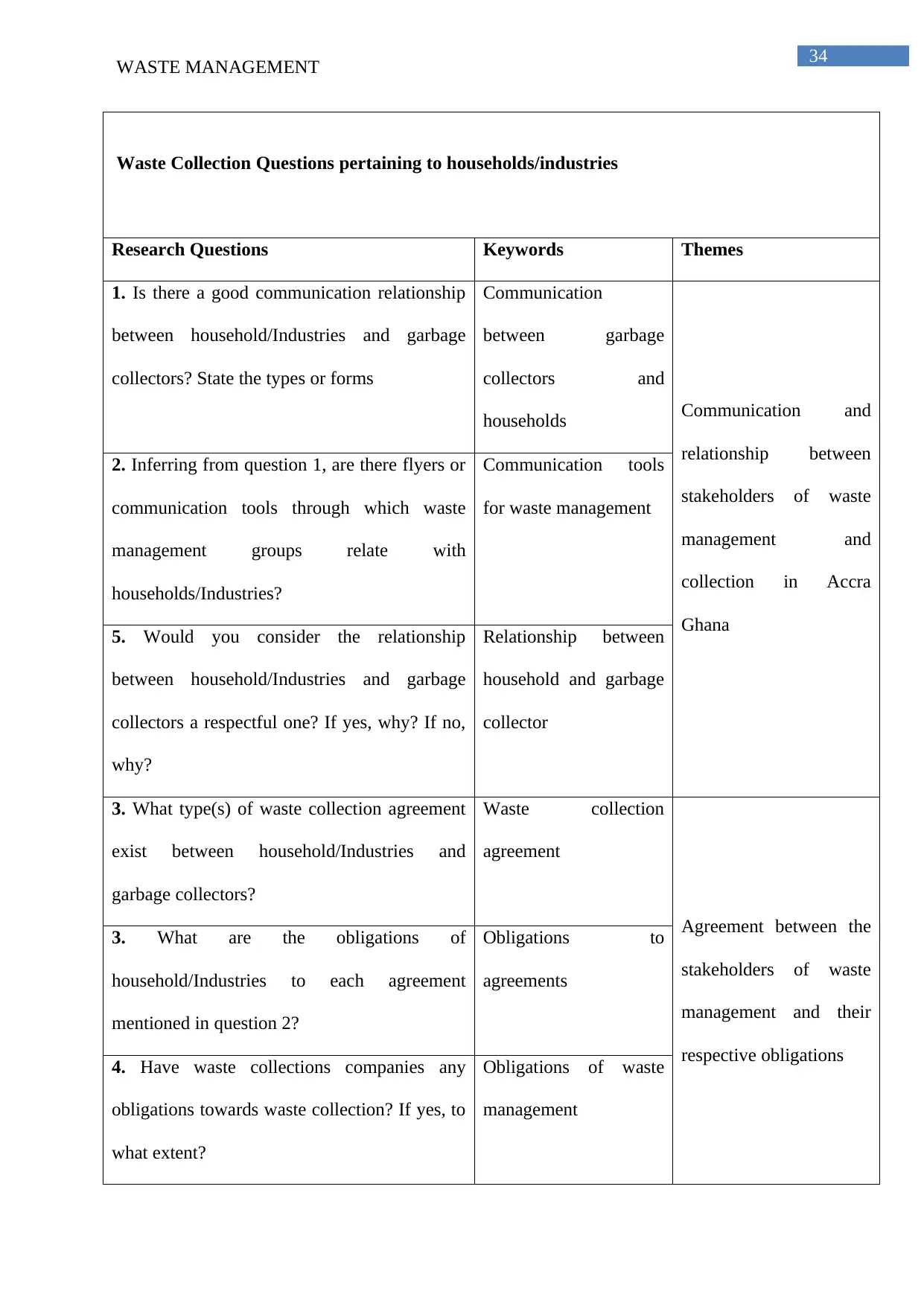
34
WASTE MANAGEMENT
Waste Collection Questions pertaining to households/industries
Research Questions Keywords Themes
1. Is there a good communication relationship
between household/Industries and garbage
collectors? State the types or forms
Communication
between garbage
collectors and
households Communication and
relationship between
stakeholders of waste
management and
collection in Accra
Ghana
2. Inferring from question 1, are there flyers or
communication tools through which waste
management groups relate with
households/Industries?
Communication tools
for waste management
5. Would you consider the relationship
between household/Industries and garbage
collectors a respectful one? If yes, why? If no,
why?
Relationship between
household and garbage
collector
3. What type(s) of waste collection agreement
exist between household/Industries and
garbage collectors?
Waste collection
agreement
Agreement between the
stakeholders of waste
management and their
respective obligations
3. What are the obligations of
household/Industries to each agreement
mentioned in question 2?
Obligations to
agreements
4. Have waste collections companies any
obligations towards waste collection? If yes, to
what extent?
Obligations of waste
management
WASTE MANAGEMENT
Waste Collection Questions pertaining to households/industries
Research Questions Keywords Themes
1. Is there a good communication relationship
between household/Industries and garbage
collectors? State the types or forms
Communication
between garbage
collectors and
households Communication and
relationship between
stakeholders of waste
management and
collection in Accra
Ghana
2. Inferring from question 1, are there flyers or
communication tools through which waste
management groups relate with
households/Industries?
Communication tools
for waste management
5. Would you consider the relationship
between household/Industries and garbage
collectors a respectful one? If yes, why? If no,
why?
Relationship between
household and garbage
collector
3. What type(s) of waste collection agreement
exist between household/Industries and
garbage collectors?
Waste collection
agreement
Agreement between the
stakeholders of waste
management and their
respective obligations
3. What are the obligations of
household/Industries to each agreement
mentioned in question 2?
Obligations to
agreements
4. Have waste collections companies any
obligations towards waste collection? If yes, to
what extent?
Obligations of waste
management
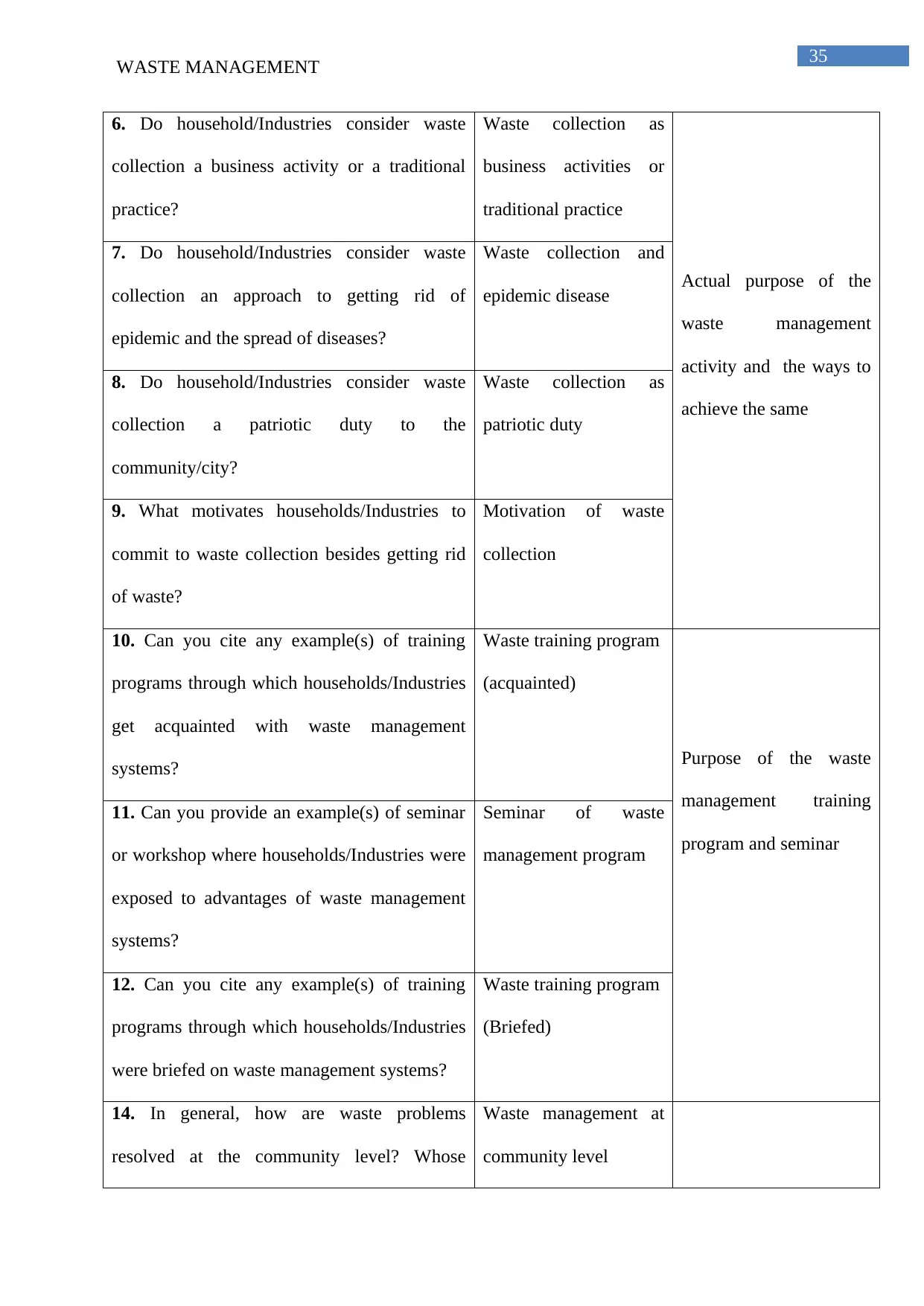
35
WASTE MANAGEMENT
6. Do household/Industries consider waste
collection a business activity or a traditional
practice?
Waste collection as
business activities or
traditional practice
Actual purpose of the
waste management
activity and the ways to
achieve the same
7. Do household/Industries consider waste
collection an approach to getting rid of
epidemic and the spread of diseases?
Waste collection and
epidemic disease
8. Do household/Industries consider waste
collection a patriotic duty to the
community/city?
Waste collection as
patriotic duty
9. What motivates households/Industries to
commit to waste collection besides getting rid
of waste?
Motivation of waste
collection
10. Can you cite any example(s) of training
programs through which households/Industries
get acquainted with waste management
systems?
Waste training program
(acquainted)
Purpose of the waste
management training
program and seminar
11. Can you provide an example(s) of seminar
or workshop where households/Industries were
exposed to advantages of waste management
systems?
Seminar of waste
management program
12. Can you cite any example(s) of training
programs through which households/Industries
were briefed on waste management systems?
Waste training program
(Briefed)
14. In general, how are waste problems
resolved at the community level? Whose
Waste management at
community level
WASTE MANAGEMENT
6. Do household/Industries consider waste
collection a business activity or a traditional
practice?
Waste collection as
business activities or
traditional practice
Actual purpose of the
waste management
activity and the ways to
achieve the same
7. Do household/Industries consider waste
collection an approach to getting rid of
epidemic and the spread of diseases?
Waste collection and
epidemic disease
8. Do household/Industries consider waste
collection a patriotic duty to the
community/city?
Waste collection as
patriotic duty
9. What motivates households/Industries to
commit to waste collection besides getting rid
of waste?
Motivation of waste
collection
10. Can you cite any example(s) of training
programs through which households/Industries
get acquainted with waste management
systems?
Waste training program
(acquainted)
Purpose of the waste
management training
program and seminar
11. Can you provide an example(s) of seminar
or workshop where households/Industries were
exposed to advantages of waste management
systems?
Seminar of waste
management program
12. Can you cite any example(s) of training
programs through which households/Industries
were briefed on waste management systems?
Waste training program
(Briefed)
14. In general, how are waste problems
resolved at the community level? Whose
Waste management at
community level
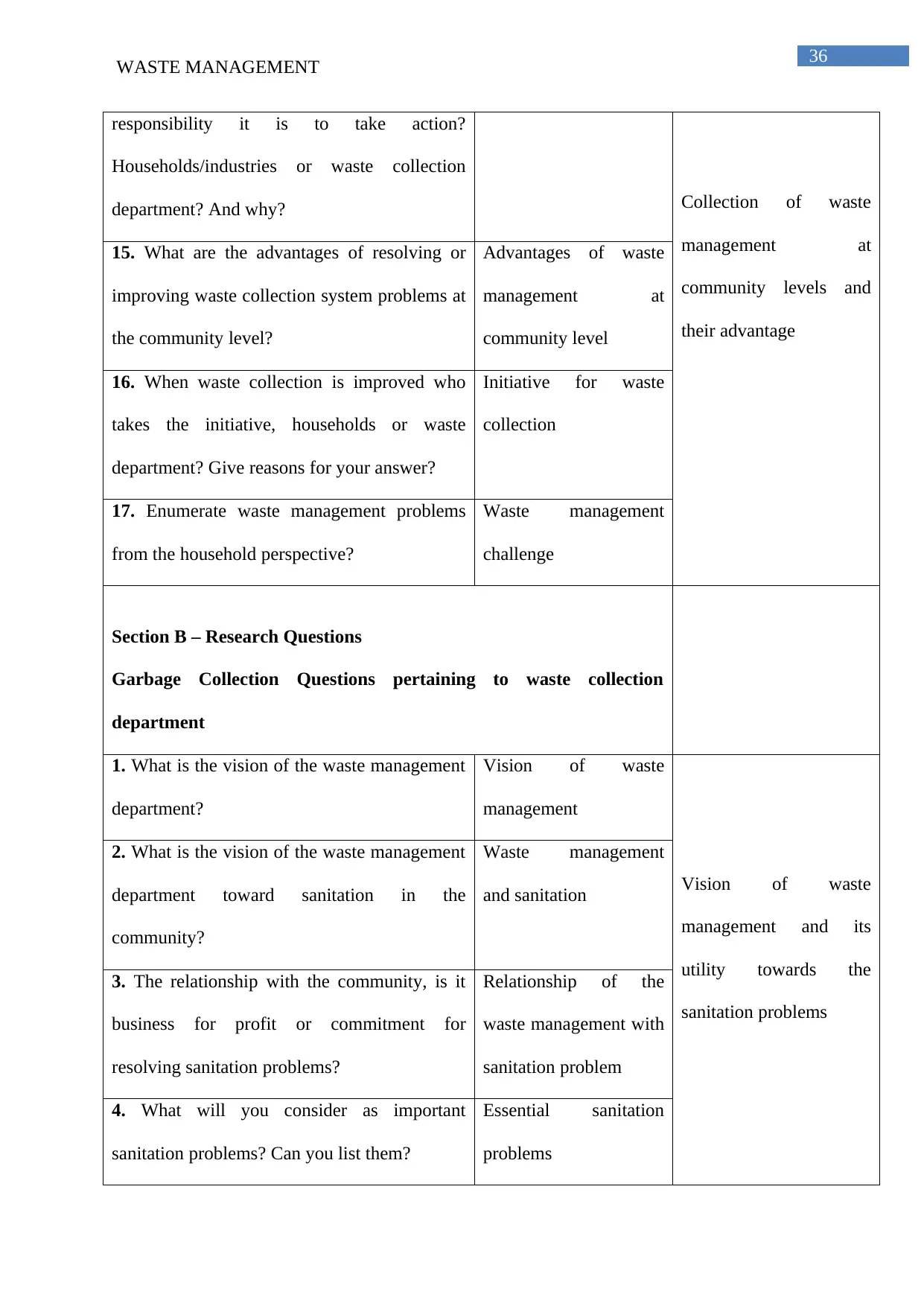
36
WASTE MANAGEMENT
responsibility it is to take action?
Households/industries or waste collection
department? And why? Collection of waste
management at
community levels and
their advantage
15. What are the advantages of resolving or
improving waste collection system problems at
the community level?
Advantages of waste
management at
community level
16. When waste collection is improved who
takes the initiative, households or waste
department? Give reasons for your answer?
Initiative for waste
collection
17. Enumerate waste management problems
from the household perspective?
Waste management
challenge
Section B – Research Questions
Garbage Collection Questions pertaining to waste collection
department
1. What is the vision of the waste management
department?
Vision of waste
management
Vision of waste
management and its
utility towards the
sanitation problems
2. What is the vision of the waste management
department toward sanitation in the
community?
Waste management
and sanitation
3. The relationship with the community, is it
business for profit or commitment for
resolving sanitation problems?
Relationship of the
waste management with
sanitation problem
4. What will you consider as important
sanitation problems? Can you list them?
Essential sanitation
problems
WASTE MANAGEMENT
responsibility it is to take action?
Households/industries or waste collection
department? And why? Collection of waste
management at
community levels and
their advantage
15. What are the advantages of resolving or
improving waste collection system problems at
the community level?
Advantages of waste
management at
community level
16. When waste collection is improved who
takes the initiative, households or waste
department? Give reasons for your answer?
Initiative for waste
collection
17. Enumerate waste management problems
from the household perspective?
Waste management
challenge
Section B – Research Questions
Garbage Collection Questions pertaining to waste collection
department
1. What is the vision of the waste management
department?
Vision of waste
management
Vision of waste
management and its
utility towards the
sanitation problems
2. What is the vision of the waste management
department toward sanitation in the
community?
Waste management
and sanitation
3. The relationship with the community, is it
business for profit or commitment for
resolving sanitation problems?
Relationship of the
waste management with
sanitation problem
4. What will you consider as important
sanitation problems? Can you list them?
Essential sanitation
problems
Paraphrase This Document
Need a fresh take? Get an instant paraphrase of this document with our AI Paraphraser
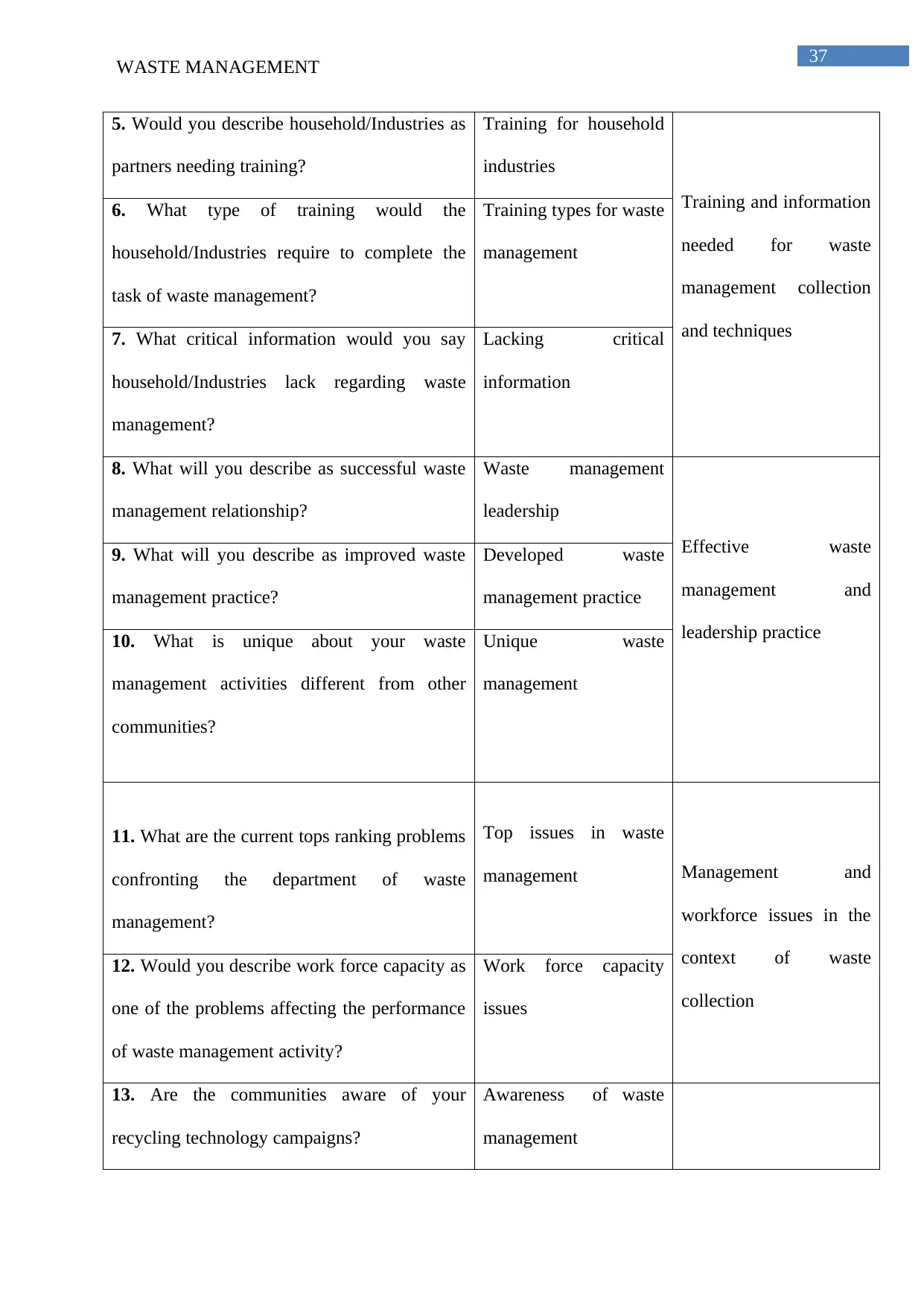
37
WASTE MANAGEMENT
5. Would you describe household/Industries as
partners needing training?
Training for household
industries
Training and information
needed for waste
management collection
and techniques
6. What type of training would the
household/Industries require to complete the
task of waste management?
Training types for waste
management
7. What critical information would you say
household/Industries lack regarding waste
management?
Lacking critical
information
8. What will you describe as successful waste
management relationship?
Waste management
leadership
Effective waste
management and
leadership practice
9. What will you describe as improved waste
management practice?
Developed waste
management practice
10. What is unique about your waste
management activities different from other
communities?
Unique waste
management
11. What are the current tops ranking problems
confronting the department of waste
management?
Top issues in waste
management Management and
workforce issues in the
context of waste
collection
12. Would you describe work force capacity as
one of the problems affecting the performance
of waste management activity?
Work force capacity
issues
13. Are the communities aware of your
recycling technology campaigns?
Awareness of waste
management
WASTE MANAGEMENT
5. Would you describe household/Industries as
partners needing training?
Training for household
industries
Training and information
needed for waste
management collection
and techniques
6. What type of training would the
household/Industries require to complete the
task of waste management?
Training types for waste
management
7. What critical information would you say
household/Industries lack regarding waste
management?
Lacking critical
information
8. What will you describe as successful waste
management relationship?
Waste management
leadership
Effective waste
management and
leadership practice
9. What will you describe as improved waste
management practice?
Developed waste
management practice
10. What is unique about your waste
management activities different from other
communities?
Unique waste
management
11. What are the current tops ranking problems
confronting the department of waste
management?
Top issues in waste
management Management and
workforce issues in the
context of waste
collection
12. Would you describe work force capacity as
one of the problems affecting the performance
of waste management activity?
Work force capacity
issues
13. Are the communities aware of your
recycling technology campaigns?
Awareness of waste
management
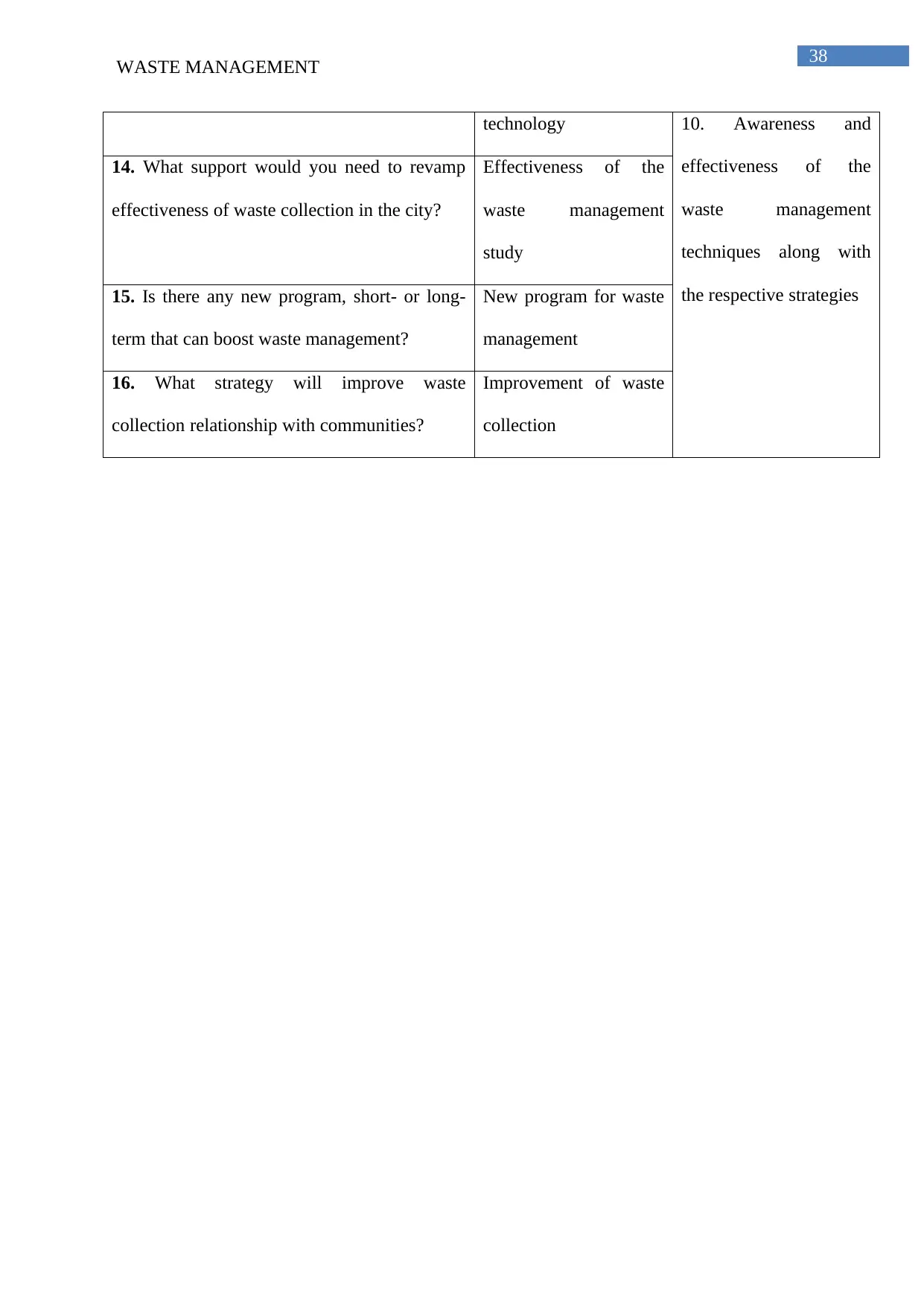
38
WASTE MANAGEMENT
technology 10. Awareness and
effectiveness of the
waste management
techniques along with
the respective strategies
14. What support would you need to revamp
effectiveness of waste collection in the city?
Effectiveness of the
waste management
study
15. Is there any new program, short- or long-
term that can boost waste management?
New program for waste
management
16. What strategy will improve waste
collection relationship with communities?
Improvement of waste
collection
WASTE MANAGEMENT
technology 10. Awareness and
effectiveness of the
waste management
techniques along with
the respective strategies
14. What support would you need to revamp
effectiveness of waste collection in the city?
Effectiveness of the
waste management
study
15. Is there any new program, short- or long-
term that can boost waste management?
New program for waste
management
16. What strategy will improve waste
collection relationship with communities?
Improvement of waste
collection
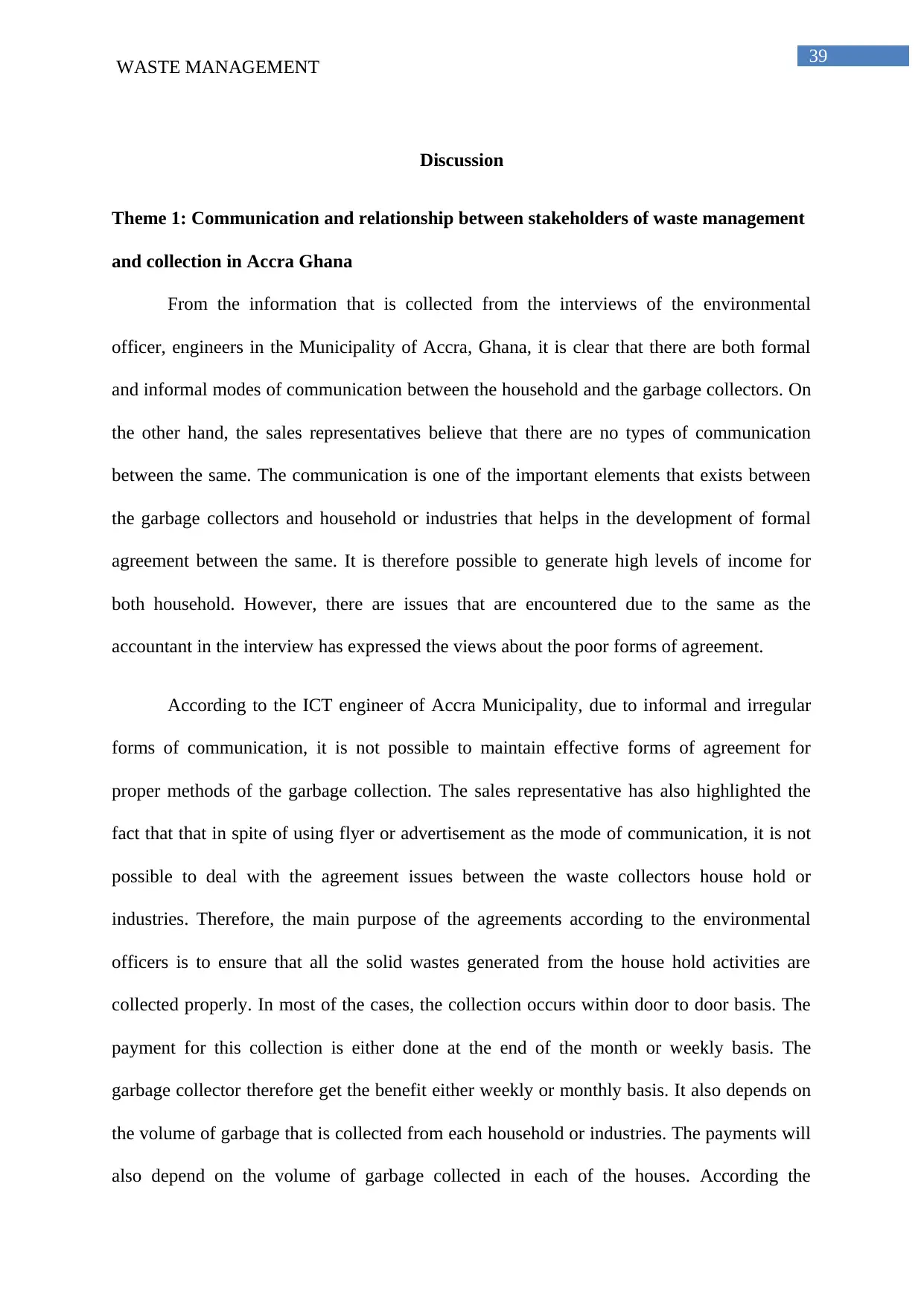
39
WASTE MANAGEMENT
Discussion
Theme 1: Communication and relationship between stakeholders of waste management
and collection in Accra Ghana
From the information that is collected from the interviews of the environmental
officer, engineers in the Municipality of Accra, Ghana, it is clear that there are both formal
and informal modes of communication between the household and the garbage collectors. On
the other hand, the sales representatives believe that there are no types of communication
between the same. The communication is one of the important elements that exists between
the garbage collectors and household or industries that helps in the development of formal
agreement between the same. It is therefore possible to generate high levels of income for
both household. However, there are issues that are encountered due to the same as the
accountant in the interview has expressed the views about the poor forms of agreement.
According to the ICT engineer of Accra Municipality, due to informal and irregular
forms of communication, it is not possible to maintain effective forms of agreement for
proper methods of the garbage collection. The sales representative has also highlighted the
fact that that in spite of using flyer or advertisement as the mode of communication, it is not
possible to deal with the agreement issues between the waste collectors house hold or
industries. Therefore, the main purpose of the agreements according to the environmental
officers is to ensure that all the solid wastes generated from the house hold activities are
collected properly. In most of the cases, the collection occurs within door to door basis. The
payment for this collection is either done at the end of the month or weekly basis. The
garbage collector therefore get the benefit either weekly or monthly basis. It also depends on
the volume of garbage that is collected from each household or industries. The payments will
also depend on the volume of garbage collected in each of the houses. According the
WASTE MANAGEMENT
Discussion
Theme 1: Communication and relationship between stakeholders of waste management
and collection in Accra Ghana
From the information that is collected from the interviews of the environmental
officer, engineers in the Municipality of Accra, Ghana, it is clear that there are both formal
and informal modes of communication between the household and the garbage collectors. On
the other hand, the sales representatives believe that there are no types of communication
between the same. The communication is one of the important elements that exists between
the garbage collectors and household or industries that helps in the development of formal
agreement between the same. It is therefore possible to generate high levels of income for
both household. However, there are issues that are encountered due to the same as the
accountant in the interview has expressed the views about the poor forms of agreement.
According to the ICT engineer of Accra Municipality, due to informal and irregular
forms of communication, it is not possible to maintain effective forms of agreement for
proper methods of the garbage collection. The sales representative has also highlighted the
fact that that in spite of using flyer or advertisement as the mode of communication, it is not
possible to deal with the agreement issues between the waste collectors house hold or
industries. Therefore, the main purpose of the agreements according to the environmental
officers is to ensure that all the solid wastes generated from the house hold activities are
collected properly. In most of the cases, the collection occurs within door to door basis. The
payment for this collection is either done at the end of the month or weekly basis. The
garbage collector therefore get the benefit either weekly or monthly basis. It also depends on
the volume of garbage that is collected from each household or industries. The payments will
also depend on the volume of garbage collected in each of the houses. According the
Secure Best Marks with AI Grader
Need help grading? Try our AI Grader for instant feedback on your assignments.
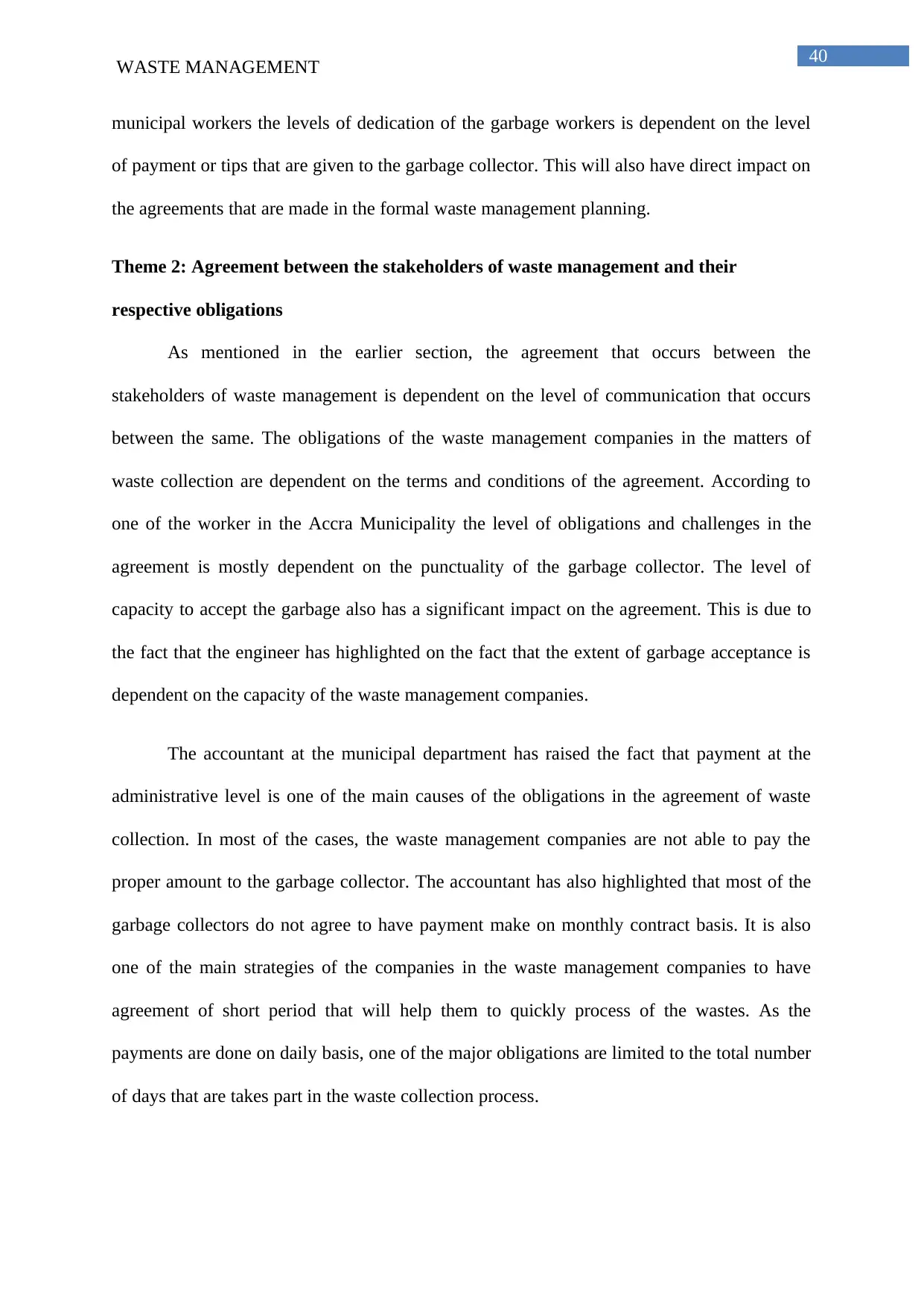
40
WASTE MANAGEMENT
municipal workers the levels of dedication of the garbage workers is dependent on the level
of payment or tips that are given to the garbage collector. This will also have direct impact on
the agreements that are made in the formal waste management planning.
Theme 2: Agreement between the stakeholders of waste management and their
respective obligations
As mentioned in the earlier section, the agreement that occurs between the
stakeholders of waste management is dependent on the level of communication that occurs
between the same. The obligations of the waste management companies in the matters of
waste collection are dependent on the terms and conditions of the agreement. According to
one of the worker in the Accra Municipality the level of obligations and challenges in the
agreement is mostly dependent on the punctuality of the garbage collector. The level of
capacity to accept the garbage also has a significant impact on the agreement. This is due to
the fact that the engineer has highlighted on the fact that the extent of garbage acceptance is
dependent on the capacity of the waste management companies.
The accountant at the municipal department has raised the fact that payment at the
administrative level is one of the main causes of the obligations in the agreement of waste
collection. In most of the cases, the waste management companies are not able to pay the
proper amount to the garbage collector. The accountant has also highlighted that most of the
garbage collectors do not agree to have payment make on monthly contract basis. It is also
one of the main strategies of the companies in the waste management companies to have
agreement of short period that will help them to quickly process of the wastes. As the
payments are done on daily basis, one of the major obligations are limited to the total number
of days that are takes part in the waste collection process.
WASTE MANAGEMENT
municipal workers the levels of dedication of the garbage workers is dependent on the level
of payment or tips that are given to the garbage collector. This will also have direct impact on
the agreements that are made in the formal waste management planning.
Theme 2: Agreement between the stakeholders of waste management and their
respective obligations
As mentioned in the earlier section, the agreement that occurs between the
stakeholders of waste management is dependent on the level of communication that occurs
between the same. The obligations of the waste management companies in the matters of
waste collection are dependent on the terms and conditions of the agreement. According to
one of the worker in the Accra Municipality the level of obligations and challenges in the
agreement is mostly dependent on the punctuality of the garbage collector. The level of
capacity to accept the garbage also has a significant impact on the agreement. This is due to
the fact that the engineer has highlighted on the fact that the extent of garbage acceptance is
dependent on the capacity of the waste management companies.
The accountant at the municipal department has raised the fact that payment at the
administrative level is one of the main causes of the obligations in the agreement of waste
collection. In most of the cases, the waste management companies are not able to pay the
proper amount to the garbage collector. The accountant has also highlighted that most of the
garbage collectors do not agree to have payment make on monthly contract basis. It is also
one of the main strategies of the companies in the waste management companies to have
agreement of short period that will help them to quickly process of the wastes. As the
payments are done on daily basis, one of the major obligations are limited to the total number
of days that are takes part in the waste collection process.
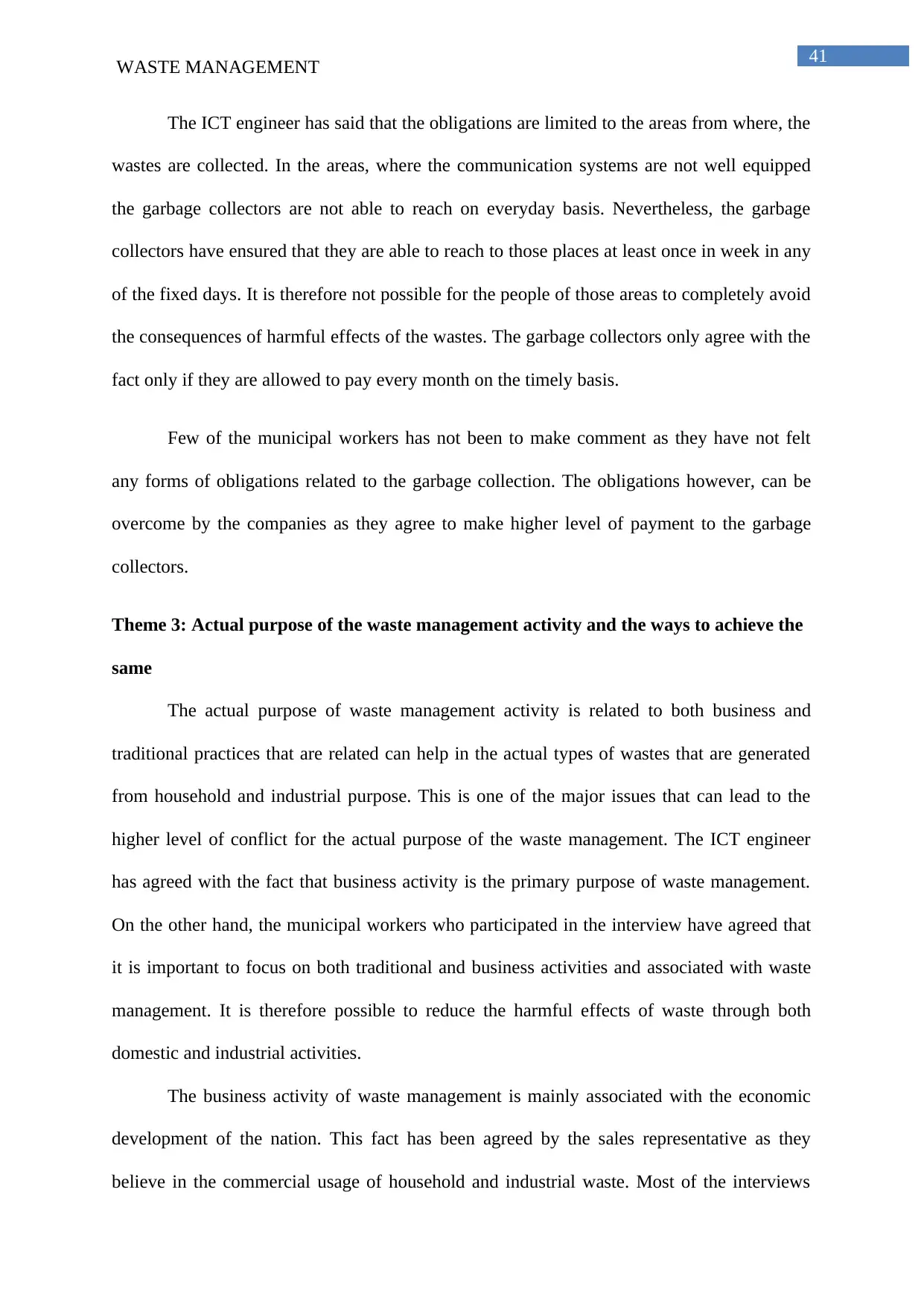
41
WASTE MANAGEMENT
The ICT engineer has said that the obligations are limited to the areas from where, the
wastes are collected. In the areas, where the communication systems are not well equipped
the garbage collectors are not able to reach on everyday basis. Nevertheless, the garbage
collectors have ensured that they are able to reach to those places at least once in week in any
of the fixed days. It is therefore not possible for the people of those areas to completely avoid
the consequences of harmful effects of the wastes. The garbage collectors only agree with the
fact only if they are allowed to pay every month on the timely basis.
Few of the municipal workers has not been to make comment as they have not felt
any forms of obligations related to the garbage collection. The obligations however, can be
overcome by the companies as they agree to make higher level of payment to the garbage
collectors.
Theme 3: Actual purpose of the waste management activity and the ways to achieve the
same
The actual purpose of waste management activity is related to both business and
traditional practices that are related can help in the actual types of wastes that are generated
from household and industrial purpose. This is one of the major issues that can lead to the
higher level of conflict for the actual purpose of the waste management. The ICT engineer
has agreed with the fact that business activity is the primary purpose of waste management.
On the other hand, the municipal workers who participated in the interview have agreed that
it is important to focus on both traditional and business activities and associated with waste
management. It is therefore possible to reduce the harmful effects of waste through both
domestic and industrial activities.
The business activity of waste management is mainly associated with the economic
development of the nation. This fact has been agreed by the sales representative as they
believe in the commercial usage of household and industrial waste. Most of the interviews
WASTE MANAGEMENT
The ICT engineer has said that the obligations are limited to the areas from where, the
wastes are collected. In the areas, where the communication systems are not well equipped
the garbage collectors are not able to reach on everyday basis. Nevertheless, the garbage
collectors have ensured that they are able to reach to those places at least once in week in any
of the fixed days. It is therefore not possible for the people of those areas to completely avoid
the consequences of harmful effects of the wastes. The garbage collectors only agree with the
fact only if they are allowed to pay every month on the timely basis.
Few of the municipal workers has not been to make comment as they have not felt
any forms of obligations related to the garbage collection. The obligations however, can be
overcome by the companies as they agree to make higher level of payment to the garbage
collectors.
Theme 3: Actual purpose of the waste management activity and the ways to achieve the
same
The actual purpose of waste management activity is related to both business and
traditional practices that are related can help in the actual types of wastes that are generated
from household and industrial purpose. This is one of the major issues that can lead to the
higher level of conflict for the actual purpose of the waste management. The ICT engineer
has agreed with the fact that business activity is the primary purpose of waste management.
On the other hand, the municipal workers who participated in the interview have agreed that
it is important to focus on both traditional and business activities and associated with waste
management. It is therefore possible to reduce the harmful effects of waste through both
domestic and industrial activities.
The business activity of waste management is mainly associated with the economic
development of the nation. This fact has been agreed by the sales representative as they
believe in the commercial usage of household and industrial waste. Most of the interviews
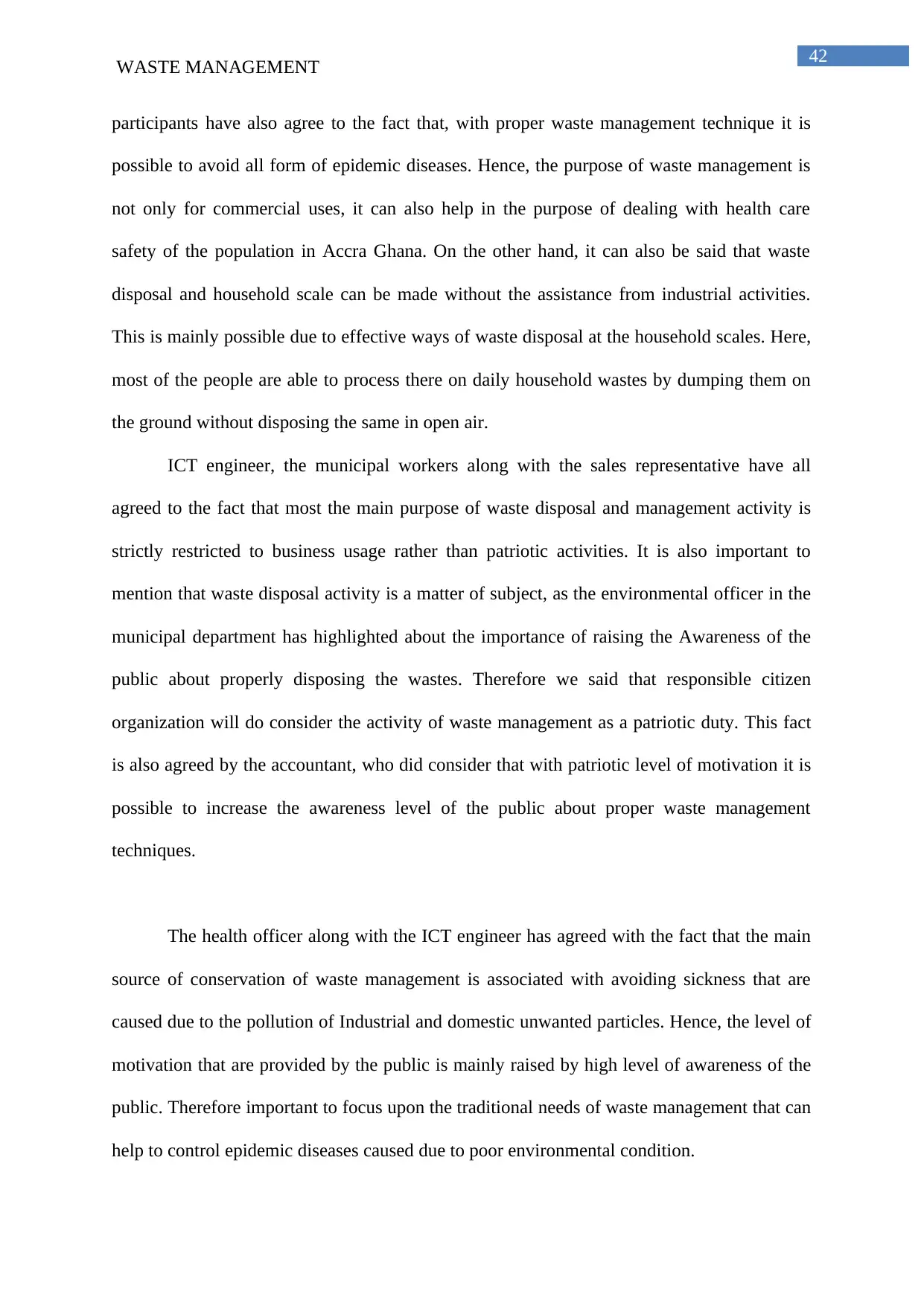
42
WASTE MANAGEMENT
participants have also agree to the fact that, with proper waste management technique it is
possible to avoid all form of epidemic diseases. Hence, the purpose of waste management is
not only for commercial uses, it can also help in the purpose of dealing with health care
safety of the population in Accra Ghana. On the other hand, it can also be said that waste
disposal and household scale can be made without the assistance from industrial activities.
This is mainly possible due to effective ways of waste disposal at the household scales. Here,
most of the people are able to process there on daily household wastes by dumping them on
the ground without disposing the same in open air.
ICT engineer, the municipal workers along with the sales representative have all
agreed to the fact that most the main purpose of waste disposal and management activity is
strictly restricted to business usage rather than patriotic activities. It is also important to
mention that waste disposal activity is a matter of subject, as the environmental officer in the
municipal department has highlighted about the importance of raising the Awareness of the
public about properly disposing the wastes. Therefore we said that responsible citizen
organization will do consider the activity of waste management as a patriotic duty. This fact
is also agreed by the accountant, who did consider that with patriotic level of motivation it is
possible to increase the awareness level of the public about proper waste management
techniques.
The health officer along with the ICT engineer has agreed with the fact that the main
source of conservation of waste management is associated with avoiding sickness that are
caused due to the pollution of Industrial and domestic unwanted particles. Hence, the level of
motivation that are provided by the public is mainly raised by high level of awareness of the
public. Therefore important to focus upon the traditional needs of waste management that can
help to control epidemic diseases caused due to poor environmental condition.
WASTE MANAGEMENT
participants have also agree to the fact that, with proper waste management technique it is
possible to avoid all form of epidemic diseases. Hence, the purpose of waste management is
not only for commercial uses, it can also help in the purpose of dealing with health care
safety of the population in Accra Ghana. On the other hand, it can also be said that waste
disposal and household scale can be made without the assistance from industrial activities.
This is mainly possible due to effective ways of waste disposal at the household scales. Here,
most of the people are able to process there on daily household wastes by dumping them on
the ground without disposing the same in open air.
ICT engineer, the municipal workers along with the sales representative have all
agreed to the fact that most the main purpose of waste disposal and management activity is
strictly restricted to business usage rather than patriotic activities. It is also important to
mention that waste disposal activity is a matter of subject, as the environmental officer in the
municipal department has highlighted about the importance of raising the Awareness of the
public about properly disposing the wastes. Therefore we said that responsible citizen
organization will do consider the activity of waste management as a patriotic duty. This fact
is also agreed by the accountant, who did consider that with patriotic level of motivation it is
possible to increase the awareness level of the public about proper waste management
techniques.
The health officer along with the ICT engineer has agreed with the fact that the main
source of conservation of waste management is associated with avoiding sickness that are
caused due to the pollution of Industrial and domestic unwanted particles. Hence, the level of
motivation that are provided by the public is mainly raised by high level of awareness of the
public. Therefore important to focus upon the traditional needs of waste management that can
help to control epidemic diseases caused due to poor environmental condition.
Paraphrase This Document
Need a fresh take? Get an instant paraphrase of this document with our AI Paraphraser
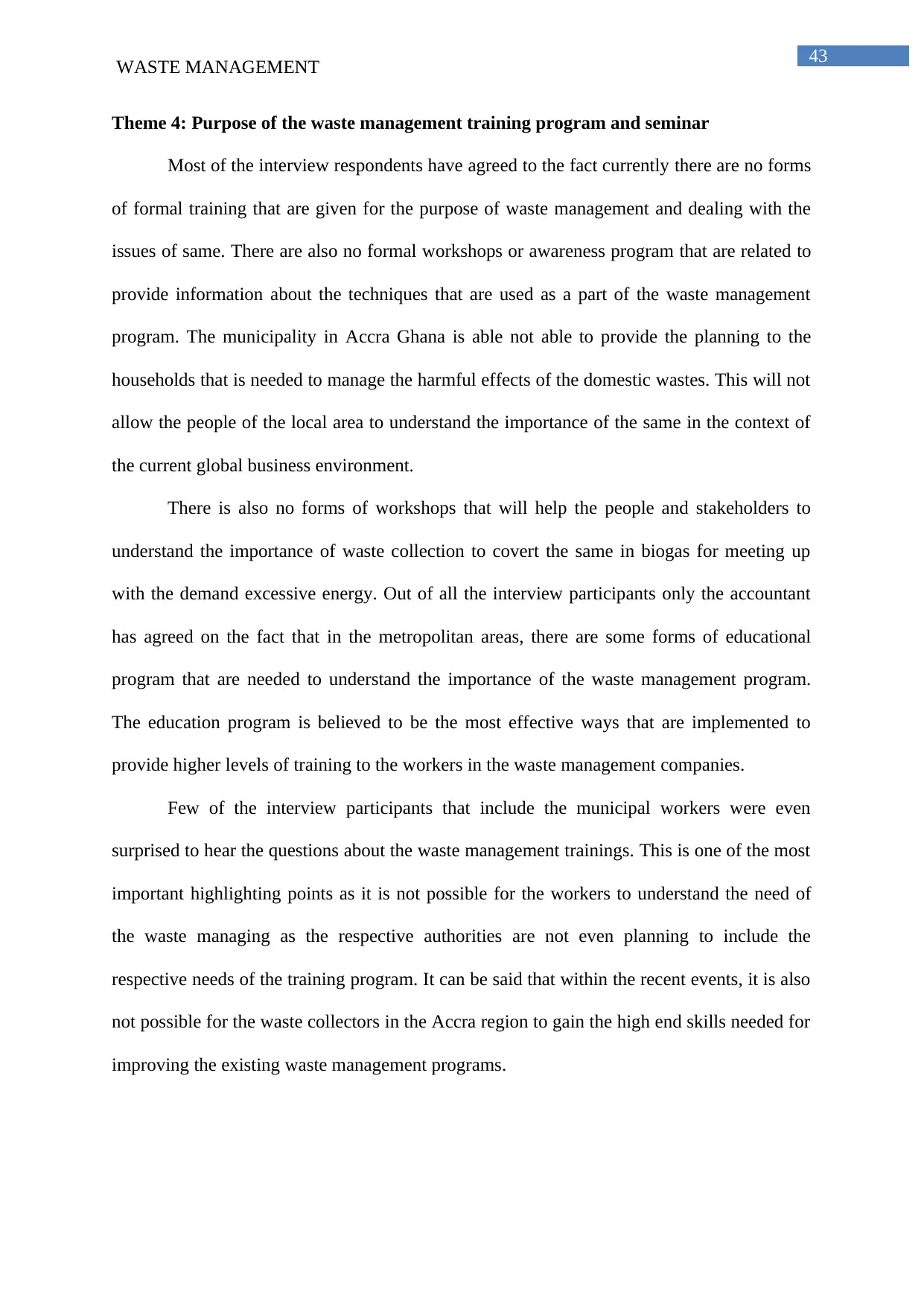
43
WASTE MANAGEMENT
Theme 4: Purpose of the waste management training program and seminar
Most of the interview respondents have agreed to the fact currently there are no forms
of formal training that are given for the purpose of waste management and dealing with the
issues of same. There are also no formal workshops or awareness program that are related to
provide information about the techniques that are used as a part of the waste management
program. The municipality in Accra Ghana is able not able to provide the planning to the
households that is needed to manage the harmful effects of the domestic wastes. This will not
allow the people of the local area to understand the importance of the same in the context of
the current global business environment.
There is also no forms of workshops that will help the people and stakeholders to
understand the importance of waste collection to covert the same in biogas for meeting up
with the demand excessive energy. Out of all the interview participants only the accountant
has agreed on the fact that in the metropolitan areas, there are some forms of educational
program that are needed to understand the importance of the waste management program.
The education program is believed to be the most effective ways that are implemented to
provide higher levels of training to the workers in the waste management companies.
Few of the interview participants that include the municipal workers were even
surprised to hear the questions about the waste management trainings. This is one of the most
important highlighting points as it is not possible for the workers to understand the need of
the waste managing as the respective authorities are not even planning to include the
respective needs of the training program. It can be said that within the recent events, it is also
not possible for the waste collectors in the Accra region to gain the high end skills needed for
improving the existing waste management programs.
WASTE MANAGEMENT
Theme 4: Purpose of the waste management training program and seminar
Most of the interview respondents have agreed to the fact currently there are no forms
of formal training that are given for the purpose of waste management and dealing with the
issues of same. There are also no formal workshops or awareness program that are related to
provide information about the techniques that are used as a part of the waste management
program. The municipality in Accra Ghana is able not able to provide the planning to the
households that is needed to manage the harmful effects of the domestic wastes. This will not
allow the people of the local area to understand the importance of the same in the context of
the current global business environment.
There is also no forms of workshops that will help the people and stakeholders to
understand the importance of waste collection to covert the same in biogas for meeting up
with the demand excessive energy. Out of all the interview participants only the accountant
has agreed on the fact that in the metropolitan areas, there are some forms of educational
program that are needed to understand the importance of the waste management program.
The education program is believed to be the most effective ways that are implemented to
provide higher levels of training to the workers in the waste management companies.
Few of the interview participants that include the municipal workers were even
surprised to hear the questions about the waste management trainings. This is one of the most
important highlighting points as it is not possible for the workers to understand the need of
the waste managing as the respective authorities are not even planning to include the
respective needs of the training program. It can be said that within the recent events, it is also
not possible for the waste collectors in the Accra region to gain the high end skills needed for
improving the existing waste management programs.
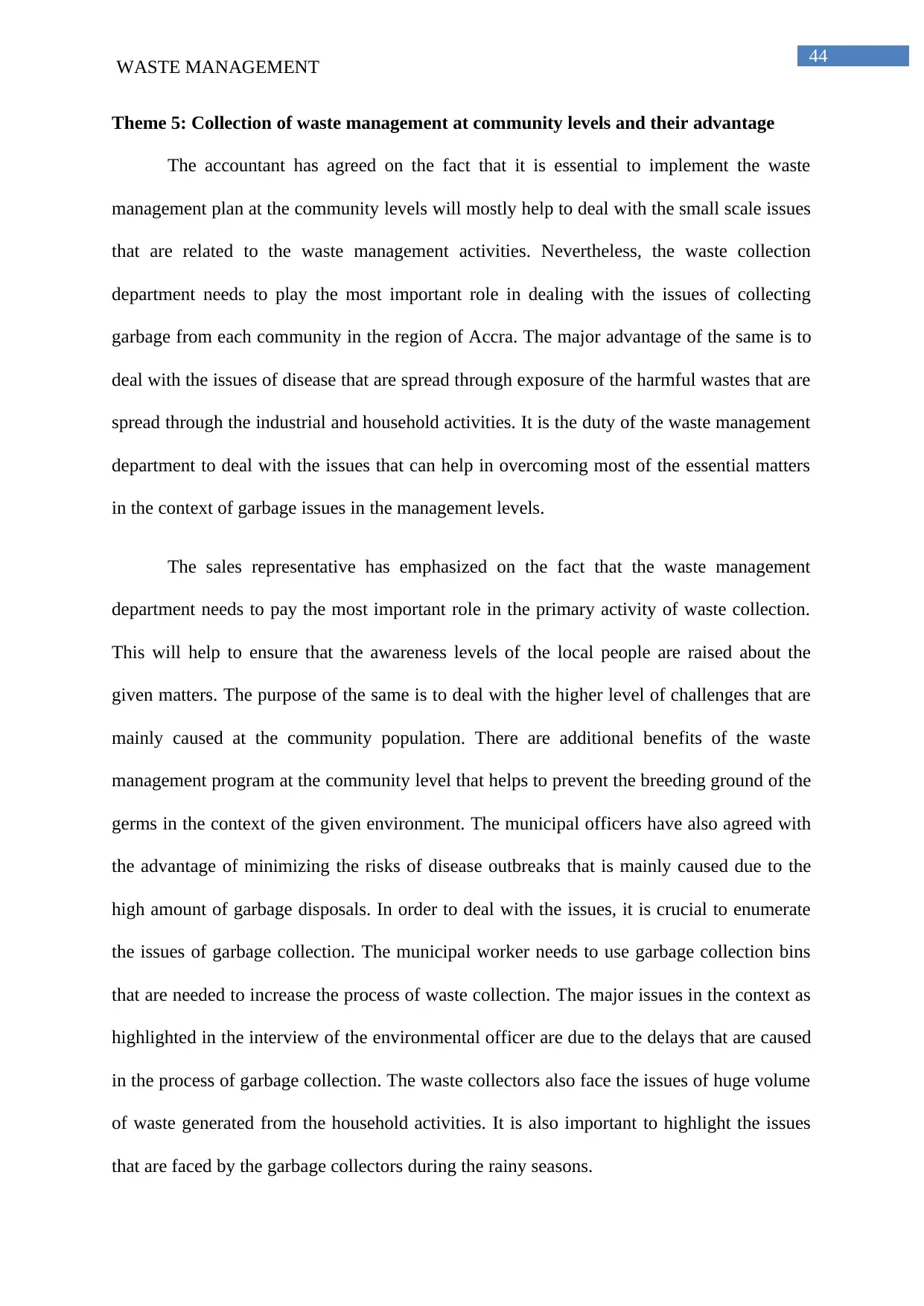
44
WASTE MANAGEMENT
Theme 5: Collection of waste management at community levels and their advantage
The accountant has agreed on the fact that it is essential to implement the waste
management plan at the community levels will mostly help to deal with the small scale issues
that are related to the waste management activities. Nevertheless, the waste collection
department needs to play the most important role in dealing with the issues of collecting
garbage from each community in the region of Accra. The major advantage of the same is to
deal with the issues of disease that are spread through exposure of the harmful wastes that are
spread through the industrial and household activities. It is the duty of the waste management
department to deal with the issues that can help in overcoming most of the essential matters
in the context of garbage issues in the management levels.
The sales representative has emphasized on the fact that the waste management
department needs to pay the most important role in the primary activity of waste collection.
This will help to ensure that the awareness levels of the local people are raised about the
given matters. The purpose of the same is to deal with the higher level of challenges that are
mainly caused at the community population. There are additional benefits of the waste
management program at the community level that helps to prevent the breeding ground of the
germs in the context of the given environment. The municipal officers have also agreed with
the advantage of minimizing the risks of disease outbreaks that is mainly caused due to the
high amount of garbage disposals. In order to deal with the issues, it is crucial to enumerate
the issues of garbage collection. The municipal worker needs to use garbage collection bins
that are needed to increase the process of waste collection. The major issues in the context as
highlighted in the interview of the environmental officer are due to the delays that are caused
in the process of garbage collection. The waste collectors also face the issues of huge volume
of waste generated from the household activities. It is also important to highlight the issues
that are faced by the garbage collectors during the rainy seasons.
WASTE MANAGEMENT
Theme 5: Collection of waste management at community levels and their advantage
The accountant has agreed on the fact that it is essential to implement the waste
management plan at the community levels will mostly help to deal with the small scale issues
that are related to the waste management activities. Nevertheless, the waste collection
department needs to play the most important role in dealing with the issues of collecting
garbage from each community in the region of Accra. The major advantage of the same is to
deal with the issues of disease that are spread through exposure of the harmful wastes that are
spread through the industrial and household activities. It is the duty of the waste management
department to deal with the issues that can help in overcoming most of the essential matters
in the context of garbage issues in the management levels.
The sales representative has emphasized on the fact that the waste management
department needs to pay the most important role in the primary activity of waste collection.
This will help to ensure that the awareness levels of the local people are raised about the
given matters. The purpose of the same is to deal with the higher level of challenges that are
mainly caused at the community population. There are additional benefits of the waste
management program at the community level that helps to prevent the breeding ground of the
germs in the context of the given environment. The municipal officers have also agreed with
the advantage of minimizing the risks of disease outbreaks that is mainly caused due to the
high amount of garbage disposals. In order to deal with the issues, it is crucial to enumerate
the issues of garbage collection. The municipal worker needs to use garbage collection bins
that are needed to increase the process of waste collection. The major issues in the context as
highlighted in the interview of the environmental officer are due to the delays that are caused
in the process of garbage collection. The waste collectors also face the issues of huge volume
of waste generated from the household activities. It is also important to highlight the issues
that are faced by the garbage collectors during the rainy seasons.
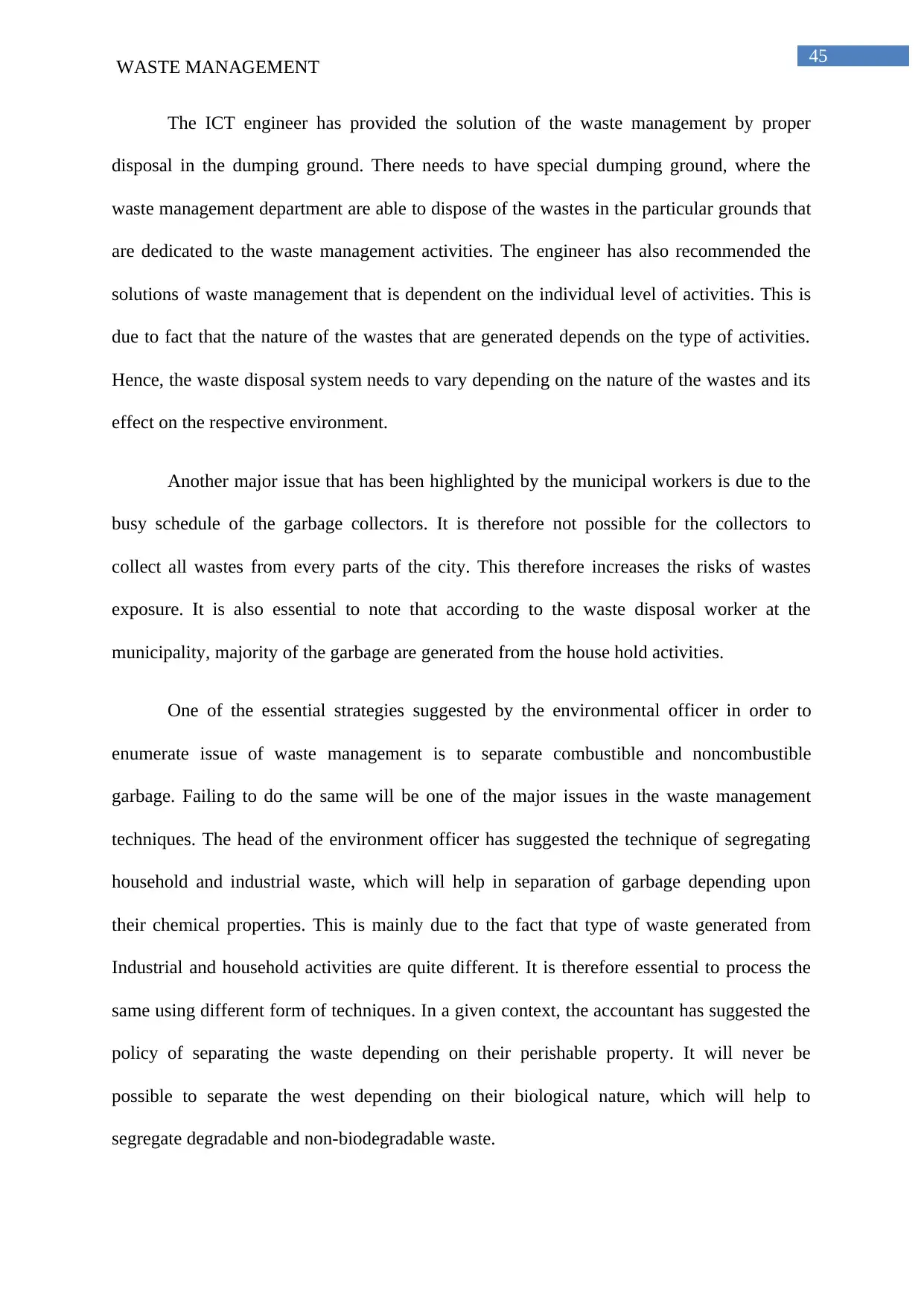
45
WASTE MANAGEMENT
The ICT engineer has provided the solution of the waste management by proper
disposal in the dumping ground. There needs to have special dumping ground, where the
waste management department are able to dispose of the wastes in the particular grounds that
are dedicated to the waste management activities. The engineer has also recommended the
solutions of waste management that is dependent on the individual level of activities. This is
due to fact that the nature of the wastes that are generated depends on the type of activities.
Hence, the waste disposal system needs to vary depending on the nature of the wastes and its
effect on the respective environment.
Another major issue that has been highlighted by the municipal workers is due to the
busy schedule of the garbage collectors. It is therefore not possible for the collectors to
collect all wastes from every parts of the city. This therefore increases the risks of wastes
exposure. It is also essential to note that according to the waste disposal worker at the
municipality, majority of the garbage are generated from the house hold activities.
One of the essential strategies suggested by the environmental officer in order to
enumerate issue of waste management is to separate combustible and noncombustible
garbage. Failing to do the same will be one of the major issues in the waste management
techniques. The head of the environment officer has suggested the technique of segregating
household and industrial waste, which will help in separation of garbage depending upon
their chemical properties. This is mainly due to the fact that type of waste generated from
Industrial and household activities are quite different. It is therefore essential to process the
same using different form of techniques. In a given context, the accountant has suggested the
policy of separating the waste depending on their perishable property. It will never be
possible to separate the west depending on their biological nature, which will help to
segregate degradable and non-biodegradable waste.
WASTE MANAGEMENT
The ICT engineer has provided the solution of the waste management by proper
disposal in the dumping ground. There needs to have special dumping ground, where the
waste management department are able to dispose of the wastes in the particular grounds that
are dedicated to the waste management activities. The engineer has also recommended the
solutions of waste management that is dependent on the individual level of activities. This is
due to fact that the nature of the wastes that are generated depends on the type of activities.
Hence, the waste disposal system needs to vary depending on the nature of the wastes and its
effect on the respective environment.
Another major issue that has been highlighted by the municipal workers is due to the
busy schedule of the garbage collectors. It is therefore not possible for the collectors to
collect all wastes from every parts of the city. This therefore increases the risks of wastes
exposure. It is also essential to note that according to the waste disposal worker at the
municipality, majority of the garbage are generated from the house hold activities.
One of the essential strategies suggested by the environmental officer in order to
enumerate issue of waste management is to separate combustible and noncombustible
garbage. Failing to do the same will be one of the major issues in the waste management
techniques. The head of the environment officer has suggested the technique of segregating
household and industrial waste, which will help in separation of garbage depending upon
their chemical properties. This is mainly due to the fact that type of waste generated from
Industrial and household activities are quite different. It is therefore essential to process the
same using different form of techniques. In a given context, the accountant has suggested the
policy of separating the waste depending on their perishable property. It will never be
possible to separate the west depending on their biological nature, which will help to
segregate degradable and non-biodegradable waste.
Secure Best Marks with AI Grader
Need help grading? Try our AI Grader for instant feedback on your assignments.
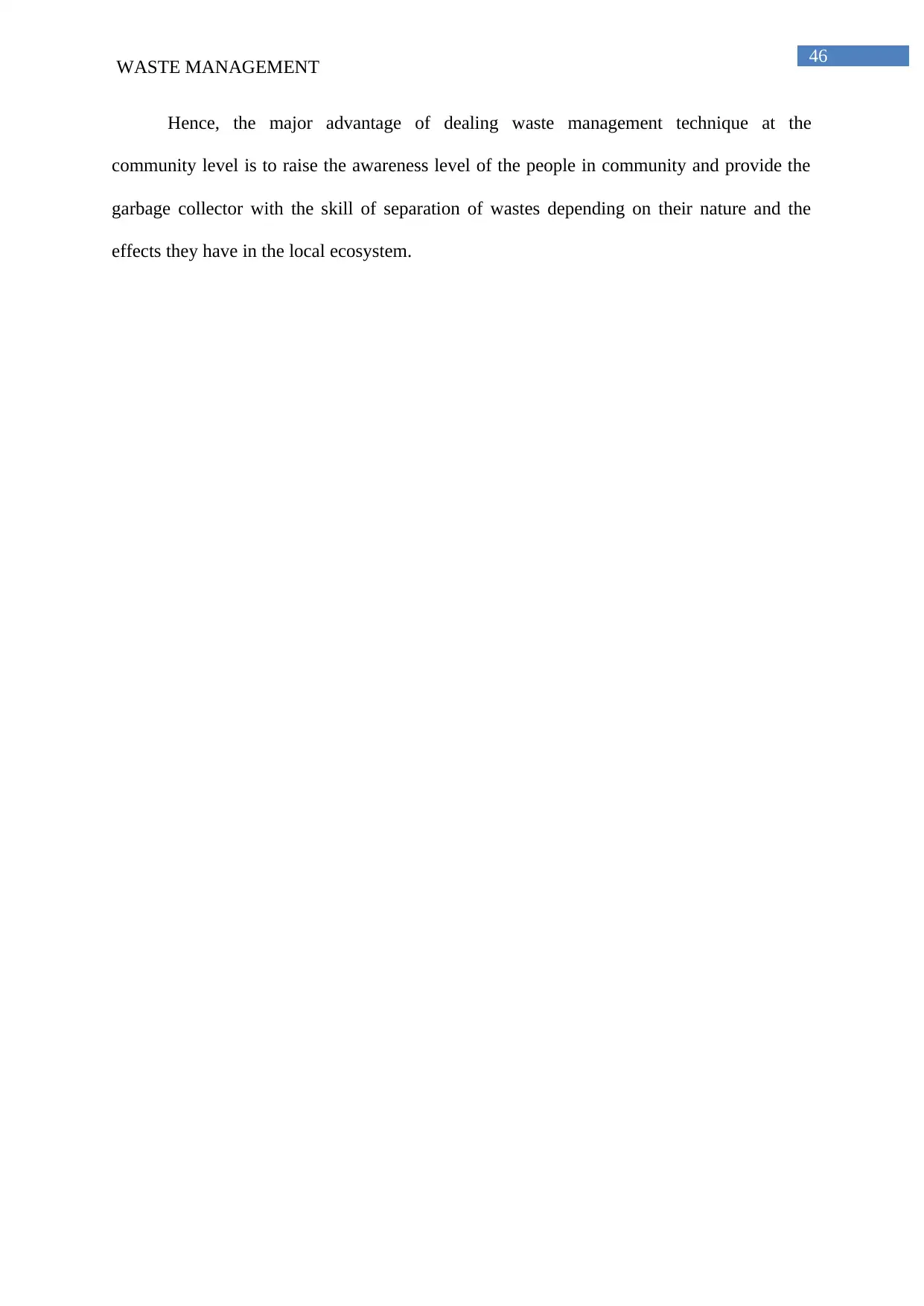
46
WASTE MANAGEMENT
Hence, the major advantage of dealing waste management technique at the
community level is to raise the awareness level of the people in community and provide the
garbage collector with the skill of separation of wastes depending on their nature and the
effects they have in the local ecosystem.
WASTE MANAGEMENT
Hence, the major advantage of dealing waste management technique at the
community level is to raise the awareness level of the people in community and provide the
garbage collector with the skill of separation of wastes depending on their nature and the
effects they have in the local ecosystem.
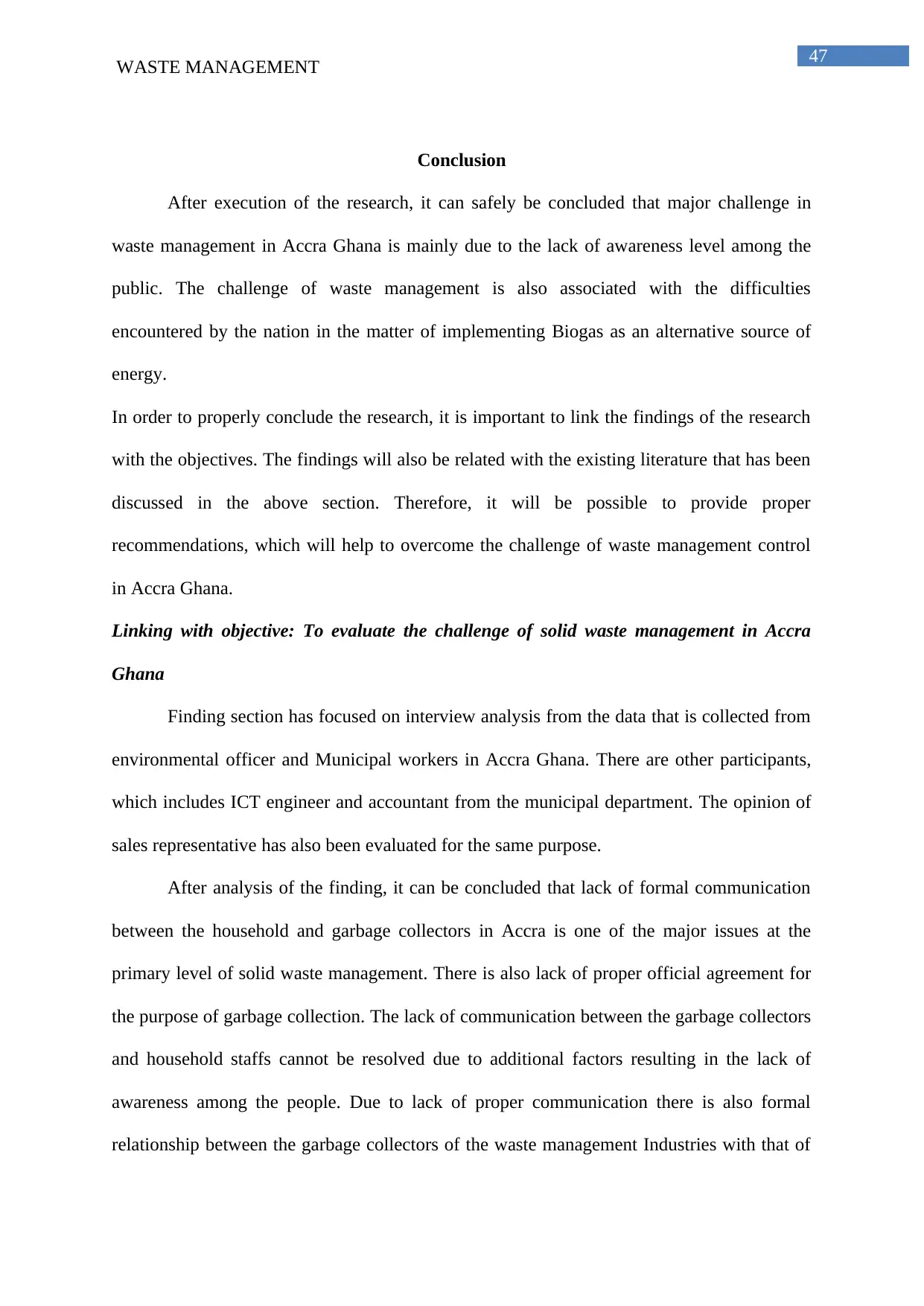
47
WASTE MANAGEMENT
Conclusion
After execution of the research, it can safely be concluded that major challenge in
waste management in Accra Ghana is mainly due to the lack of awareness level among the
public. The challenge of waste management is also associated with the difficulties
encountered by the nation in the matter of implementing Biogas as an alternative source of
energy.
In order to properly conclude the research, it is important to link the findings of the research
with the objectives. The findings will also be related with the existing literature that has been
discussed in the above section. Therefore, it will be possible to provide proper
recommendations, which will help to overcome the challenge of waste management control
in Accra Ghana.
Linking with objective: To evaluate the challenge of solid waste management in Accra
Ghana
Finding section has focused on interview analysis from the data that is collected from
environmental officer and Municipal workers in Accra Ghana. There are other participants,
which includes ICT engineer and accountant from the municipal department. The opinion of
sales representative has also been evaluated for the same purpose.
After analysis of the finding, it can be concluded that lack of formal communication
between the household and garbage collectors in Accra is one of the major issues at the
primary level of solid waste management. There is also lack of proper official agreement for
the purpose of garbage collection. The lack of communication between the garbage collectors
and household staffs cannot be resolved due to additional factors resulting in the lack of
awareness among the people. Due to lack of proper communication there is also formal
relationship between the garbage collectors of the waste management Industries with that of
WASTE MANAGEMENT
Conclusion
After execution of the research, it can safely be concluded that major challenge in
waste management in Accra Ghana is mainly due to the lack of awareness level among the
public. The challenge of waste management is also associated with the difficulties
encountered by the nation in the matter of implementing Biogas as an alternative source of
energy.
In order to properly conclude the research, it is important to link the findings of the research
with the objectives. The findings will also be related with the existing literature that has been
discussed in the above section. Therefore, it will be possible to provide proper
recommendations, which will help to overcome the challenge of waste management control
in Accra Ghana.
Linking with objective: To evaluate the challenge of solid waste management in Accra
Ghana
Finding section has focused on interview analysis from the data that is collected from
environmental officer and Municipal workers in Accra Ghana. There are other participants,
which includes ICT engineer and accountant from the municipal department. The opinion of
sales representative has also been evaluated for the same purpose.
After analysis of the finding, it can be concluded that lack of formal communication
between the household and garbage collectors in Accra is one of the major issues at the
primary level of solid waste management. There is also lack of proper official agreement for
the purpose of garbage collection. The lack of communication between the garbage collectors
and household staffs cannot be resolved due to additional factors resulting in the lack of
awareness among the people. Due to lack of proper communication there is also formal
relationship between the garbage collectors of the waste management Industries with that of
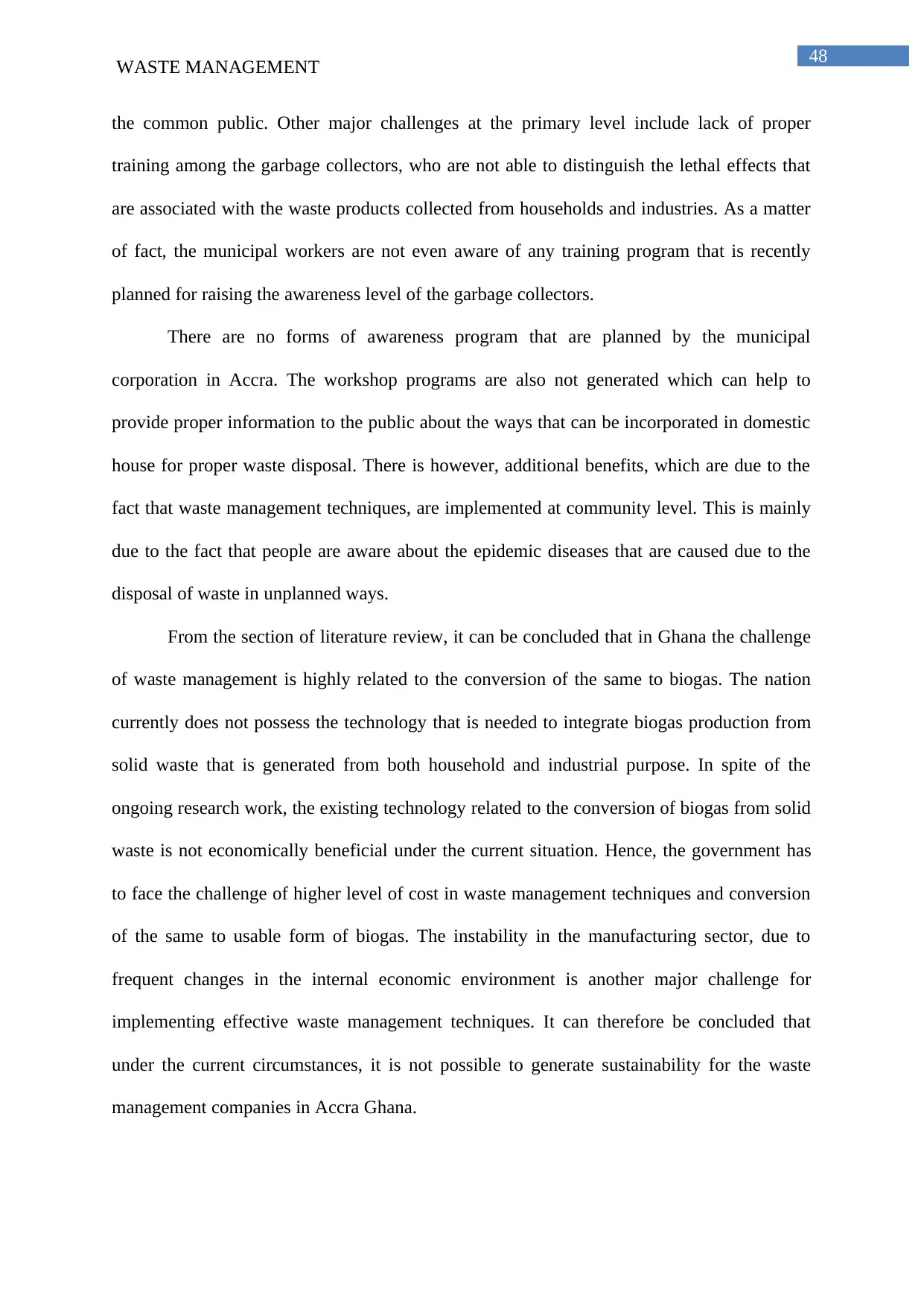
48
WASTE MANAGEMENT
the common public. Other major challenges at the primary level include lack of proper
training among the garbage collectors, who are not able to distinguish the lethal effects that
are associated with the waste products collected from households and industries. As a matter
of fact, the municipal workers are not even aware of any training program that is recently
planned for raising the awareness level of the garbage collectors.
There are no forms of awareness program that are planned by the municipal
corporation in Accra. The workshop programs are also not generated which can help to
provide proper information to the public about the ways that can be incorporated in domestic
house for proper waste disposal. There is however, additional benefits, which are due to the
fact that waste management techniques, are implemented at community level. This is mainly
due to the fact that people are aware about the epidemic diseases that are caused due to the
disposal of waste in unplanned ways.
From the section of literature review, it can be concluded that in Ghana the challenge
of waste management is highly related to the conversion of the same to biogas. The nation
currently does not possess the technology that is needed to integrate biogas production from
solid waste that is generated from both household and industrial purpose. In spite of the
ongoing research work, the existing technology related to the conversion of biogas from solid
waste is not economically beneficial under the current situation. Hence, the government has
to face the challenge of higher level of cost in waste management techniques and conversion
of the same to usable form of biogas. The instability in the manufacturing sector, due to
frequent changes in the internal economic environment is another major challenge for
implementing effective waste management techniques. It can therefore be concluded that
under the current circumstances, it is not possible to generate sustainability for the waste
management companies in Accra Ghana.
WASTE MANAGEMENT
the common public. Other major challenges at the primary level include lack of proper
training among the garbage collectors, who are not able to distinguish the lethal effects that
are associated with the waste products collected from households and industries. As a matter
of fact, the municipal workers are not even aware of any training program that is recently
planned for raising the awareness level of the garbage collectors.
There are no forms of awareness program that are planned by the municipal
corporation in Accra. The workshop programs are also not generated which can help to
provide proper information to the public about the ways that can be incorporated in domestic
house for proper waste disposal. There is however, additional benefits, which are due to the
fact that waste management techniques, are implemented at community level. This is mainly
due to the fact that people are aware about the epidemic diseases that are caused due to the
disposal of waste in unplanned ways.
From the section of literature review, it can be concluded that in Ghana the challenge
of waste management is highly related to the conversion of the same to biogas. The nation
currently does not possess the technology that is needed to integrate biogas production from
solid waste that is generated from both household and industrial purpose. In spite of the
ongoing research work, the existing technology related to the conversion of biogas from solid
waste is not economically beneficial under the current situation. Hence, the government has
to face the challenge of higher level of cost in waste management techniques and conversion
of the same to usable form of biogas. The instability in the manufacturing sector, due to
frequent changes in the internal economic environment is another major challenge for
implementing effective waste management techniques. It can therefore be concluded that
under the current circumstances, it is not possible to generate sustainability for the waste
management companies in Accra Ghana.
Paraphrase This Document
Need a fresh take? Get an instant paraphrase of this document with our AI Paraphraser
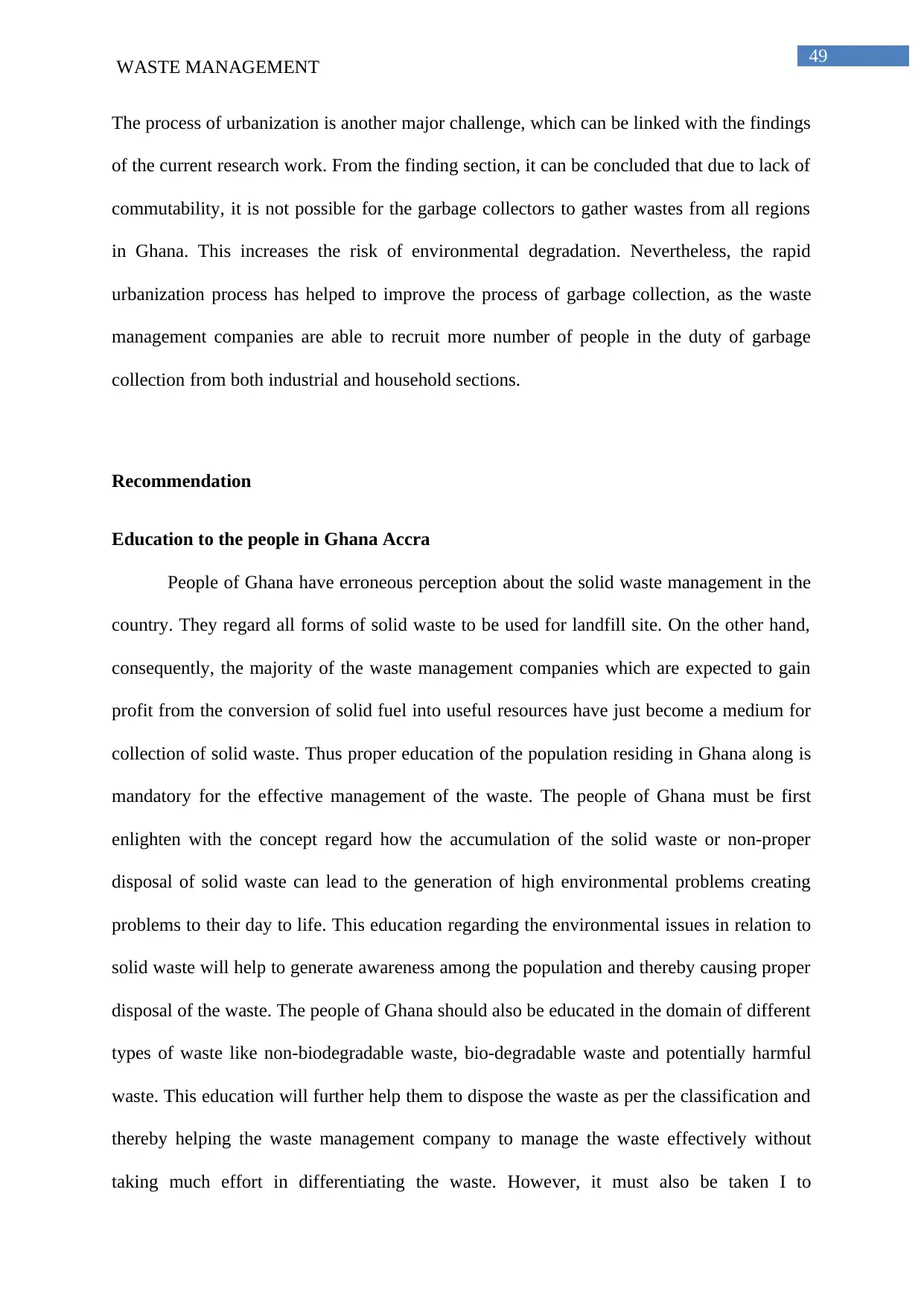
49
WASTE MANAGEMENT
The process of urbanization is another major challenge, which can be linked with the findings
of the current research work. From the finding section, it can be concluded that due to lack of
commutability, it is not possible for the garbage collectors to gather wastes from all regions
in Ghana. This increases the risk of environmental degradation. Nevertheless, the rapid
urbanization process has helped to improve the process of garbage collection, as the waste
management companies are able to recruit more number of people in the duty of garbage
collection from both industrial and household sections.
Recommendation
Education to the people in Ghana Accra
People of Ghana have erroneous perception about the solid waste management in the
country. They regard all forms of solid waste to be used for landfill site. On the other hand,
consequently, the majority of the waste management companies which are expected to gain
profit from the conversion of solid fuel into useful resources have just become a medium for
collection of solid waste. Thus proper education of the population residing in Ghana along is
mandatory for the effective management of the waste. The people of Ghana must be first
enlighten with the concept regard how the accumulation of the solid waste or non-proper
disposal of solid waste can lead to the generation of high environmental problems creating
problems to their day to life. This education regarding the environmental issues in relation to
solid waste will help to generate awareness among the population and thereby causing proper
disposal of the waste. The people of Ghana should also be educated in the domain of different
types of waste like non-biodegradable waste, bio-degradable waste and potentially harmful
waste. This education will further help them to dispose the waste as per the classification and
thereby helping the waste management company to manage the waste effectively without
taking much effort in differentiating the waste. However, it must also be taken I to
WASTE MANAGEMENT
The process of urbanization is another major challenge, which can be linked with the findings
of the current research work. From the finding section, it can be concluded that due to lack of
commutability, it is not possible for the garbage collectors to gather wastes from all regions
in Ghana. This increases the risk of environmental degradation. Nevertheless, the rapid
urbanization process has helped to improve the process of garbage collection, as the waste
management companies are able to recruit more number of people in the duty of garbage
collection from both industrial and household sections.
Recommendation
Education to the people in Ghana Accra
People of Ghana have erroneous perception about the solid waste management in the
country. They regard all forms of solid waste to be used for landfill site. On the other hand,
consequently, the majority of the waste management companies which are expected to gain
profit from the conversion of solid fuel into useful resources have just become a medium for
collection of solid waste. Thus proper education of the population residing in Ghana along is
mandatory for the effective management of the waste. The people of Ghana must be first
enlighten with the concept regard how the accumulation of the solid waste or non-proper
disposal of solid waste can lead to the generation of high environmental problems creating
problems to their day to life. This education regarding the environmental issues in relation to
solid waste will help to generate awareness among the population and thereby causing proper
disposal of the waste. The people of Ghana should also be educated in the domain of different
types of waste like non-biodegradable waste, bio-degradable waste and potentially harmful
waste. This education will further help them to dispose the waste as per the classification and
thereby helping the waste management company to manage the waste effectively without
taking much effort in differentiating the waste. However, it must also be taken I to
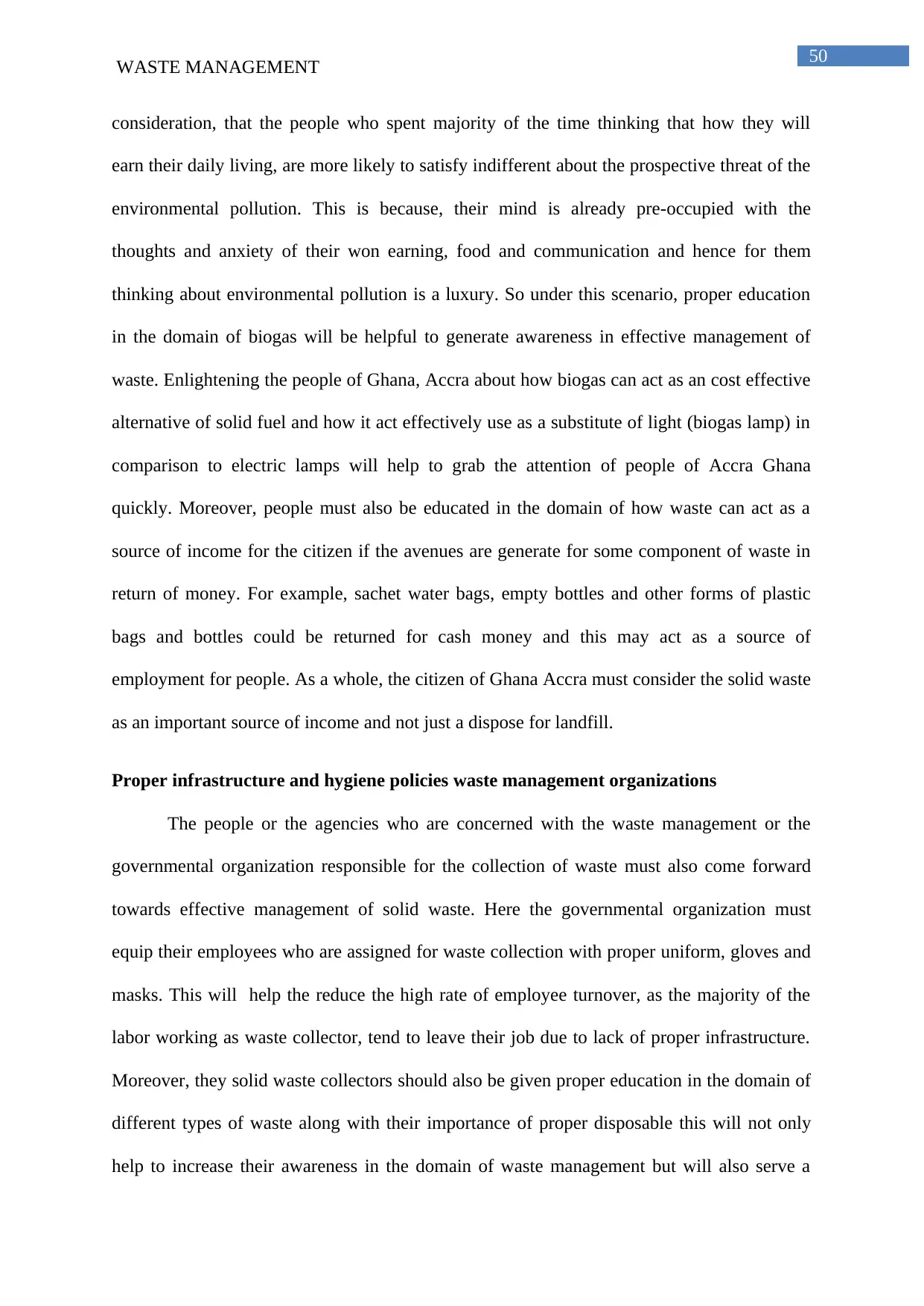
50
WASTE MANAGEMENT
consideration, that the people who spent majority of the time thinking that how they will
earn their daily living, are more likely to satisfy indifferent about the prospective threat of the
environmental pollution. This is because, their mind is already pre-occupied with the
thoughts and anxiety of their won earning, food and communication and hence for them
thinking about environmental pollution is a luxury. So under this scenario, proper education
in the domain of biogas will be helpful to generate awareness in effective management of
waste. Enlightening the people of Ghana, Accra about how biogas can act as an cost effective
alternative of solid fuel and how it act effectively use as a substitute of light (biogas lamp) in
comparison to electric lamps will help to grab the attention of people of Accra Ghana
quickly. Moreover, people must also be educated in the domain of how waste can act as a
source of income for the citizen if the avenues are generate for some component of waste in
return of money. For example, sachet water bags, empty bottles and other forms of plastic
bags and bottles could be returned for cash money and this may act as a source of
employment for people. As a whole, the citizen of Ghana Accra must consider the solid waste
as an important source of income and not just a dispose for landfill.
Proper infrastructure and hygiene policies waste management organizations
The people or the agencies who are concerned with the waste management or the
governmental organization responsible for the collection of waste must also come forward
towards effective management of solid waste. Here the governmental organization must
equip their employees who are assigned for waste collection with proper uniform, gloves and
masks. This will help the reduce the high rate of employee turnover, as the majority of the
labor working as waste collector, tend to leave their job due to lack of proper infrastructure.
Moreover, they solid waste collectors should also be given proper education in the domain of
different types of waste along with their importance of proper disposable this will not only
help to increase their awareness in the domain of waste management but will also serve a
WASTE MANAGEMENT
consideration, that the people who spent majority of the time thinking that how they will
earn their daily living, are more likely to satisfy indifferent about the prospective threat of the
environmental pollution. This is because, their mind is already pre-occupied with the
thoughts and anxiety of their won earning, food and communication and hence for them
thinking about environmental pollution is a luxury. So under this scenario, proper education
in the domain of biogas will be helpful to generate awareness in effective management of
waste. Enlightening the people of Ghana, Accra about how biogas can act as an cost effective
alternative of solid fuel and how it act effectively use as a substitute of light (biogas lamp) in
comparison to electric lamps will help to grab the attention of people of Accra Ghana
quickly. Moreover, people must also be educated in the domain of how waste can act as a
source of income for the citizen if the avenues are generate for some component of waste in
return of money. For example, sachet water bags, empty bottles and other forms of plastic
bags and bottles could be returned for cash money and this may act as a source of
employment for people. As a whole, the citizen of Ghana Accra must consider the solid waste
as an important source of income and not just a dispose for landfill.
Proper infrastructure and hygiene policies waste management organizations
The people or the agencies who are concerned with the waste management or the
governmental organization responsible for the collection of waste must also come forward
towards effective management of solid waste. Here the governmental organization must
equip their employees who are assigned for waste collection with proper uniform, gloves and
masks. This will help the reduce the high rate of employee turnover, as the majority of the
labor working as waste collector, tend to leave their job due to lack of proper infrastructure.
Moreover, they solid waste collectors should also be given proper education in the domain of
different types of waste along with their importance of proper disposable this will not only
help to increase their awareness in the domain of waste management but will also serve a
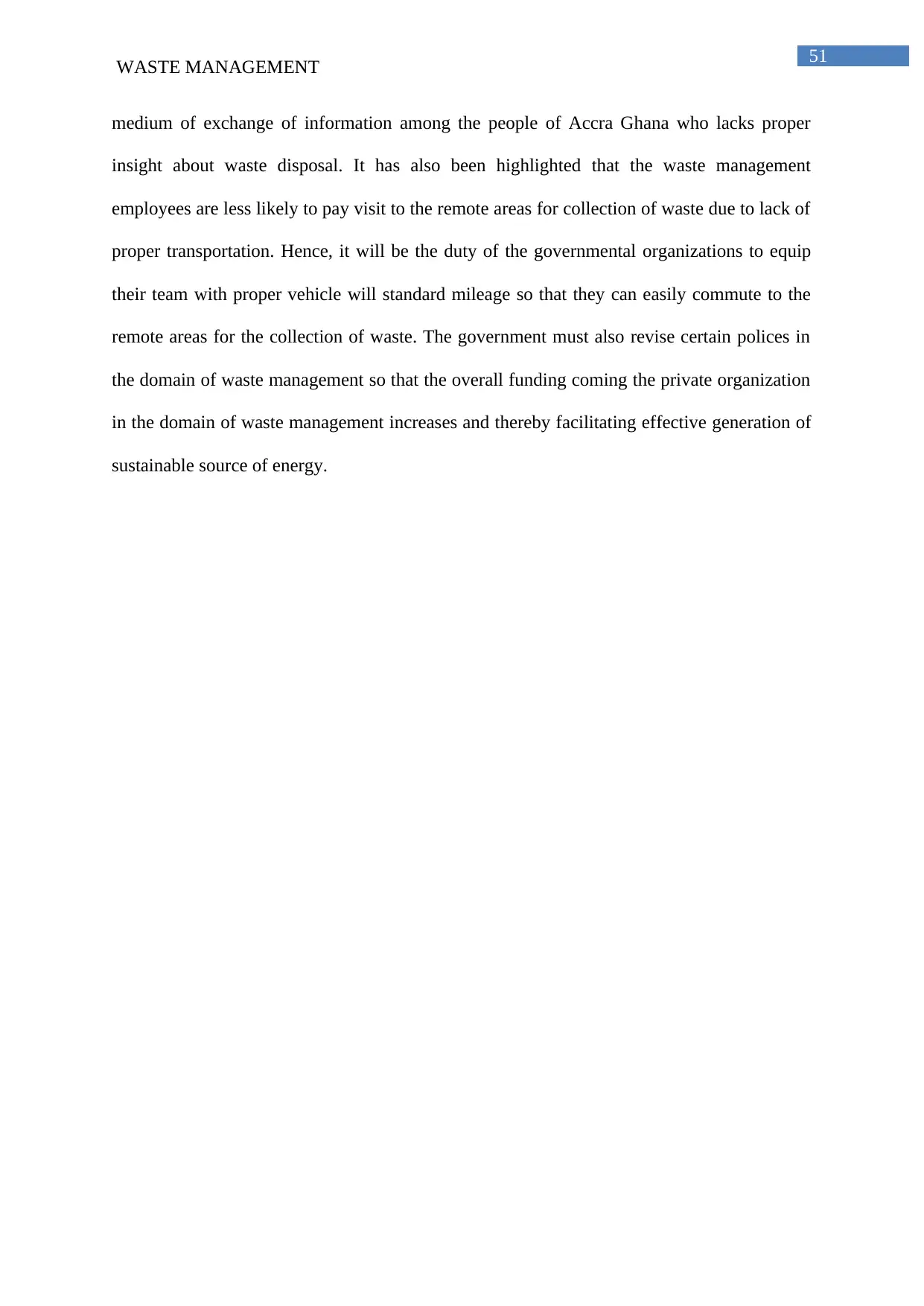
51
WASTE MANAGEMENT
medium of exchange of information among the people of Accra Ghana who lacks proper
insight about waste disposal. It has also been highlighted that the waste management
employees are less likely to pay visit to the remote areas for collection of waste due to lack of
proper transportation. Hence, it will be the duty of the governmental organizations to equip
their team with proper vehicle will standard mileage so that they can easily commute to the
remote areas for the collection of waste. The government must also revise certain polices in
the domain of waste management so that the overall funding coming the private organization
in the domain of waste management increases and thereby facilitating effective generation of
sustainable source of energy.
WASTE MANAGEMENT
medium of exchange of information among the people of Accra Ghana who lacks proper
insight about waste disposal. It has also been highlighted that the waste management
employees are less likely to pay visit to the remote areas for collection of waste due to lack of
proper transportation. Hence, it will be the duty of the governmental organizations to equip
their team with proper vehicle will standard mileage so that they can easily commute to the
remote areas for the collection of waste. The government must also revise certain polices in
the domain of waste management so that the overall funding coming the private organization
in the domain of waste management increases and thereby facilitating effective generation of
sustainable source of energy.
Secure Best Marks with AI Grader
Need help grading? Try our AI Grader for instant feedback on your assignments.
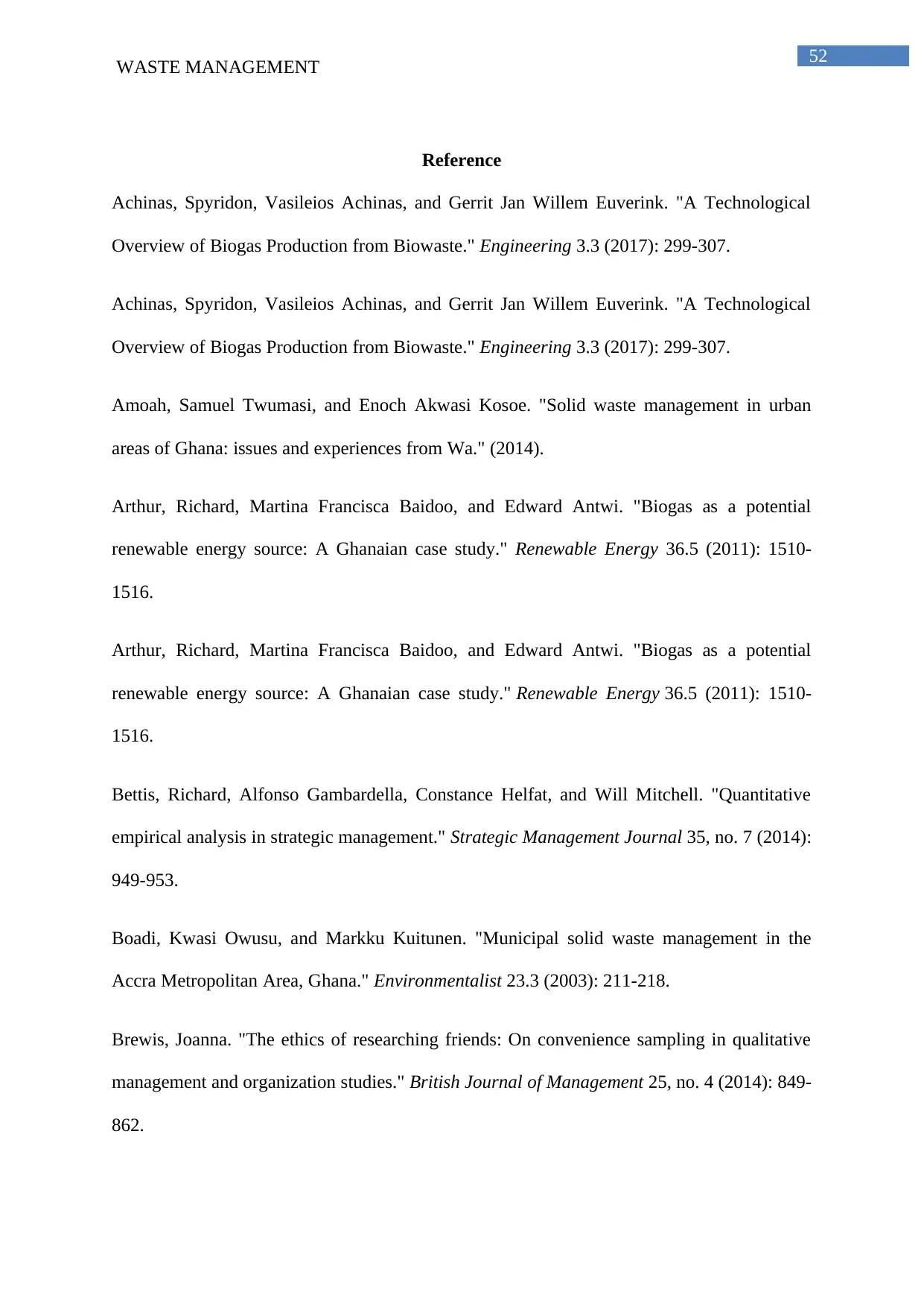
52
WASTE MANAGEMENT
Reference
Achinas, Spyridon, Vasileios Achinas, and Gerrit Jan Willem Euverink. "A Technological
Overview of Biogas Production from Biowaste." Engineering 3.3 (2017): 299-307.
Achinas, Spyridon, Vasileios Achinas, and Gerrit Jan Willem Euverink. "A Technological
Overview of Biogas Production from Biowaste." Engineering 3.3 (2017): 299-307.
Amoah, Samuel Twumasi, and Enoch Akwasi Kosoe. "Solid waste management in urban
areas of Ghana: issues and experiences from Wa." (2014).
Arthur, Richard, Martina Francisca Baidoo, and Edward Antwi. "Biogas as a potential
renewable energy source: A Ghanaian case study." Renewable Energy 36.5 (2011): 1510-
1516.
Arthur, Richard, Martina Francisca Baidoo, and Edward Antwi. "Biogas as a potential
renewable energy source: A Ghanaian case study." Renewable Energy 36.5 (2011): 1510-
1516.
Bettis, Richard, Alfonso Gambardella, Constance Helfat, and Will Mitchell. "Quantitative
empirical analysis in strategic management." Strategic Management Journal 35, no. 7 (2014):
949-953.
Boadi, Kwasi Owusu, and Markku Kuitunen. "Municipal solid waste management in the
Accra Metropolitan Area, Ghana." Environmentalist 23.3 (2003): 211-218.
Brewis, Joanna. "The ethics of researching friends: On convenience sampling in qualitative
management and organization studies." British Journal of Management 25, no. 4 (2014): 849-
862.
WASTE MANAGEMENT
Reference
Achinas, Spyridon, Vasileios Achinas, and Gerrit Jan Willem Euverink. "A Technological
Overview of Biogas Production from Biowaste." Engineering 3.3 (2017): 299-307.
Achinas, Spyridon, Vasileios Achinas, and Gerrit Jan Willem Euverink. "A Technological
Overview of Biogas Production from Biowaste." Engineering 3.3 (2017): 299-307.
Amoah, Samuel Twumasi, and Enoch Akwasi Kosoe. "Solid waste management in urban
areas of Ghana: issues and experiences from Wa." (2014).
Arthur, Richard, Martina Francisca Baidoo, and Edward Antwi. "Biogas as a potential
renewable energy source: A Ghanaian case study." Renewable Energy 36.5 (2011): 1510-
1516.
Arthur, Richard, Martina Francisca Baidoo, and Edward Antwi. "Biogas as a potential
renewable energy source: A Ghanaian case study." Renewable Energy 36.5 (2011): 1510-
1516.
Bettis, Richard, Alfonso Gambardella, Constance Helfat, and Will Mitchell. "Quantitative
empirical analysis in strategic management." Strategic Management Journal 35, no. 7 (2014):
949-953.
Boadi, Kwasi Owusu, and Markku Kuitunen. "Municipal solid waste management in the
Accra Metropolitan Area, Ghana." Environmentalist 23.3 (2003): 211-218.
Brewis, Joanna. "The ethics of researching friends: On convenience sampling in qualitative
management and organization studies." British Journal of Management 25, no. 4 (2014): 849-
862.
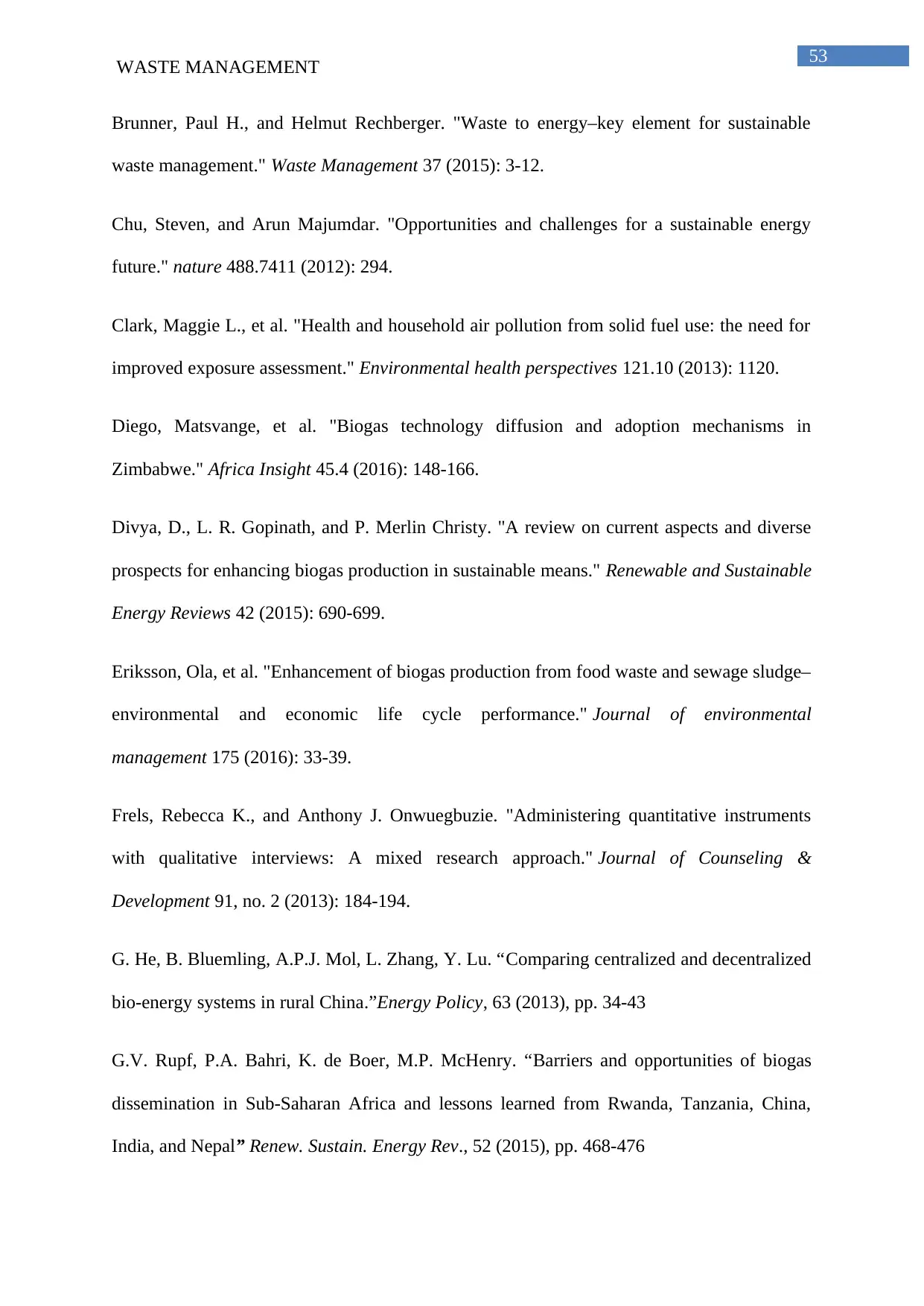
53
WASTE MANAGEMENT
Brunner, Paul H., and Helmut Rechberger. "Waste to energy–key element for sustainable
waste management." Waste Management 37 (2015): 3-12.
Chu, Steven, and Arun Majumdar. "Opportunities and challenges for a sustainable energy
future." nature 488.7411 (2012): 294.
Clark, Maggie L., et al. "Health and household air pollution from solid fuel use: the need for
improved exposure assessment." Environmental health perspectives 121.10 (2013): 1120.
Diego, Matsvange, et al. "Biogas technology diffusion and adoption mechanisms in
Zimbabwe." Africa Insight 45.4 (2016): 148-166.
Divya, D., L. R. Gopinath, and P. Merlin Christy. "A review on current aspects and diverse
prospects for enhancing biogas production in sustainable means." Renewable and Sustainable
Energy Reviews 42 (2015): 690-699.
Eriksson, Ola, et al. "Enhancement of biogas production from food waste and sewage sludge–
environmental and economic life cycle performance." Journal of environmental
management 175 (2016): 33-39.
Frels, Rebecca K., and Anthony J. Onwuegbuzie. "Administering quantitative instruments
with qualitative interviews: A mixed research approach." Journal of Counseling &
Development 91, no. 2 (2013): 184-194.
G. He, B. Bluemling, A.P.J. Mol, L. Zhang, Y. Lu. “Comparing centralized and decentralized
bio-energy systems in rural China.”Energy Policy, 63 (2013), pp. 34-43
G.V. Rupf, P.A. Bahri, K. de Boer, M.P. McHenry. “Barriers and opportunities of biogas
dissemination in Sub-Saharan Africa and lessons learned from Rwanda, Tanzania, China,
India, and Nepal” Renew. Sustain. Energy Rev., 52 (2015), pp. 468-476
WASTE MANAGEMENT
Brunner, Paul H., and Helmut Rechberger. "Waste to energy–key element for sustainable
waste management." Waste Management 37 (2015): 3-12.
Chu, Steven, and Arun Majumdar. "Opportunities and challenges for a sustainable energy
future." nature 488.7411 (2012): 294.
Clark, Maggie L., et al. "Health and household air pollution from solid fuel use: the need for
improved exposure assessment." Environmental health perspectives 121.10 (2013): 1120.
Diego, Matsvange, et al. "Biogas technology diffusion and adoption mechanisms in
Zimbabwe." Africa Insight 45.4 (2016): 148-166.
Divya, D., L. R. Gopinath, and P. Merlin Christy. "A review on current aspects and diverse
prospects for enhancing biogas production in sustainable means." Renewable and Sustainable
Energy Reviews 42 (2015): 690-699.
Eriksson, Ola, et al. "Enhancement of biogas production from food waste and sewage sludge–
environmental and economic life cycle performance." Journal of environmental
management 175 (2016): 33-39.
Frels, Rebecca K., and Anthony J. Onwuegbuzie. "Administering quantitative instruments
with qualitative interviews: A mixed research approach." Journal of Counseling &
Development 91, no. 2 (2013): 184-194.
G. He, B. Bluemling, A.P.J. Mol, L. Zhang, Y. Lu. “Comparing centralized and decentralized
bio-energy systems in rural China.”Energy Policy, 63 (2013), pp. 34-43
G.V. Rupf, P.A. Bahri, K. de Boer, M.P. McHenry. “Barriers and opportunities of biogas
dissemination in Sub-Saharan Africa and lessons learned from Rwanda, Tanzania, China,
India, and Nepal” Renew. Sustain. Energy Rev., 52 (2015), pp. 468-476
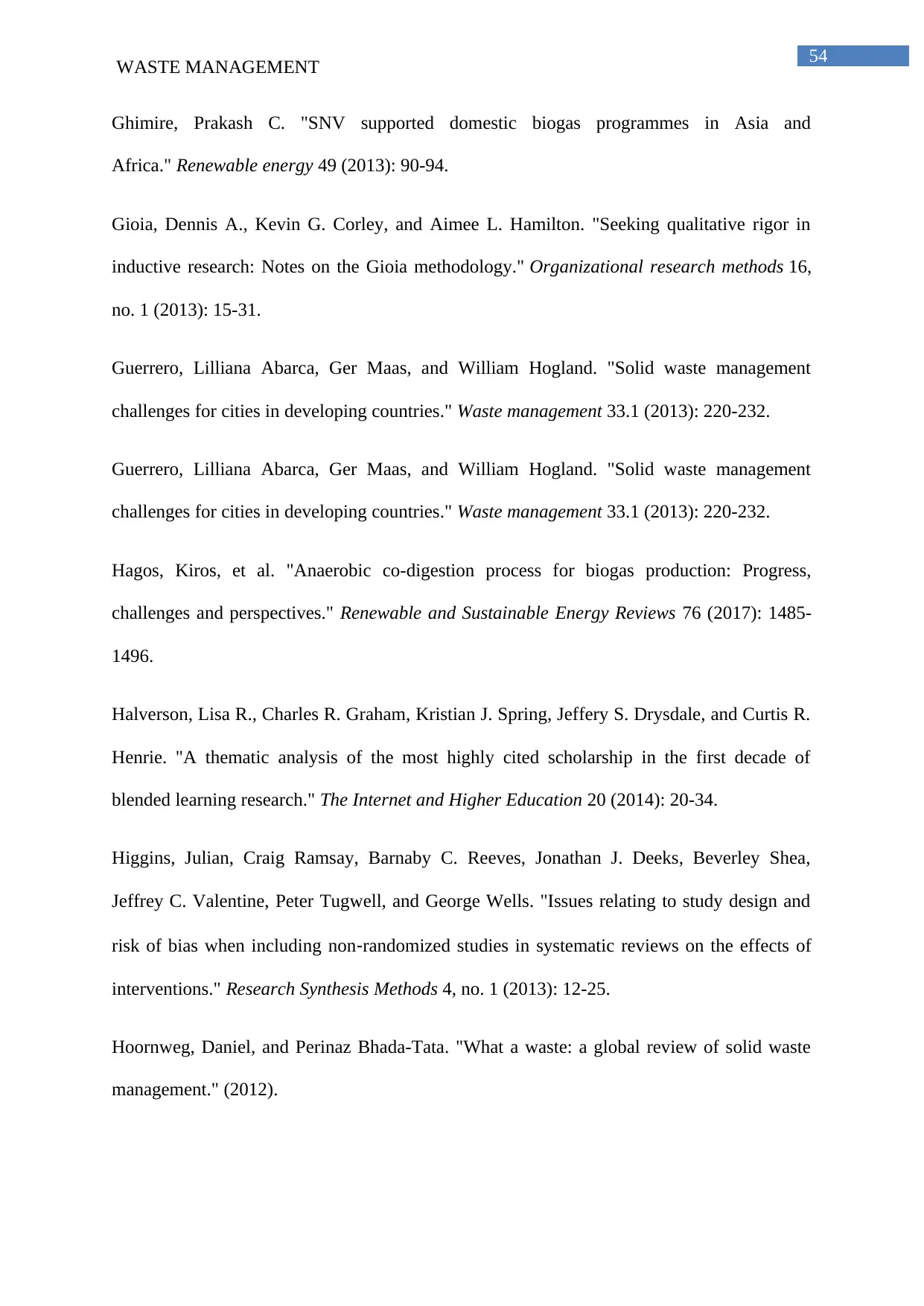
54
WASTE MANAGEMENT
Ghimire, Prakash C. "SNV supported domestic biogas programmes in Asia and
Africa." Renewable energy 49 (2013): 90-94.
Gioia, Dennis A., Kevin G. Corley, and Aimee L. Hamilton. "Seeking qualitative rigor in
inductive research: Notes on the Gioia methodology." Organizational research methods 16,
no. 1 (2013): 15-31.
Guerrero, Lilliana Abarca, Ger Maas, and William Hogland. "Solid waste management
challenges for cities in developing countries." Waste management 33.1 (2013): 220-232.
Guerrero, Lilliana Abarca, Ger Maas, and William Hogland. "Solid waste management
challenges for cities in developing countries." Waste management 33.1 (2013): 220-232.
Hagos, Kiros, et al. "Anaerobic co-digestion process for biogas production: Progress,
challenges and perspectives." Renewable and Sustainable Energy Reviews 76 (2017): 1485-
1496.
Halverson, Lisa R., Charles R. Graham, Kristian J. Spring, Jeffery S. Drysdale, and Curtis R.
Henrie. "A thematic analysis of the most highly cited scholarship in the first decade of
blended learning research." The Internet and Higher Education 20 (2014): 20-34.
Higgins, Julian, Craig Ramsay, Barnaby C. Reeves, Jonathan J. Deeks, Beverley Shea,
Jeffrey C. Valentine, Peter Tugwell, and George Wells. "Issues relating to study design and
risk of bias when including non‐randomized studies in systematic reviews on the effects of
interventions." Research Synthesis Methods 4, no. 1 (2013): 12-25.
Hoornweg, Daniel, and Perinaz Bhada-Tata. "What a waste: a global review of solid waste
management." (2012).
WASTE MANAGEMENT
Ghimire, Prakash C. "SNV supported domestic biogas programmes in Asia and
Africa." Renewable energy 49 (2013): 90-94.
Gioia, Dennis A., Kevin G. Corley, and Aimee L. Hamilton. "Seeking qualitative rigor in
inductive research: Notes on the Gioia methodology." Organizational research methods 16,
no. 1 (2013): 15-31.
Guerrero, Lilliana Abarca, Ger Maas, and William Hogland. "Solid waste management
challenges for cities in developing countries." Waste management 33.1 (2013): 220-232.
Guerrero, Lilliana Abarca, Ger Maas, and William Hogland. "Solid waste management
challenges for cities in developing countries." Waste management 33.1 (2013): 220-232.
Hagos, Kiros, et al. "Anaerobic co-digestion process for biogas production: Progress,
challenges and perspectives." Renewable and Sustainable Energy Reviews 76 (2017): 1485-
1496.
Halverson, Lisa R., Charles R. Graham, Kristian J. Spring, Jeffery S. Drysdale, and Curtis R.
Henrie. "A thematic analysis of the most highly cited scholarship in the first decade of
blended learning research." The Internet and Higher Education 20 (2014): 20-34.
Higgins, Julian, Craig Ramsay, Barnaby C. Reeves, Jonathan J. Deeks, Beverley Shea,
Jeffrey C. Valentine, Peter Tugwell, and George Wells. "Issues relating to study design and
risk of bias when including non‐randomized studies in systematic reviews on the effects of
interventions." Research Synthesis Methods 4, no. 1 (2013): 12-25.
Hoornweg, Daniel, and Perinaz Bhada-Tata. "What a waste: a global review of solid waste
management." (2012).
Paraphrase This Document
Need a fresh take? Get an instant paraphrase of this document with our AI Paraphraser
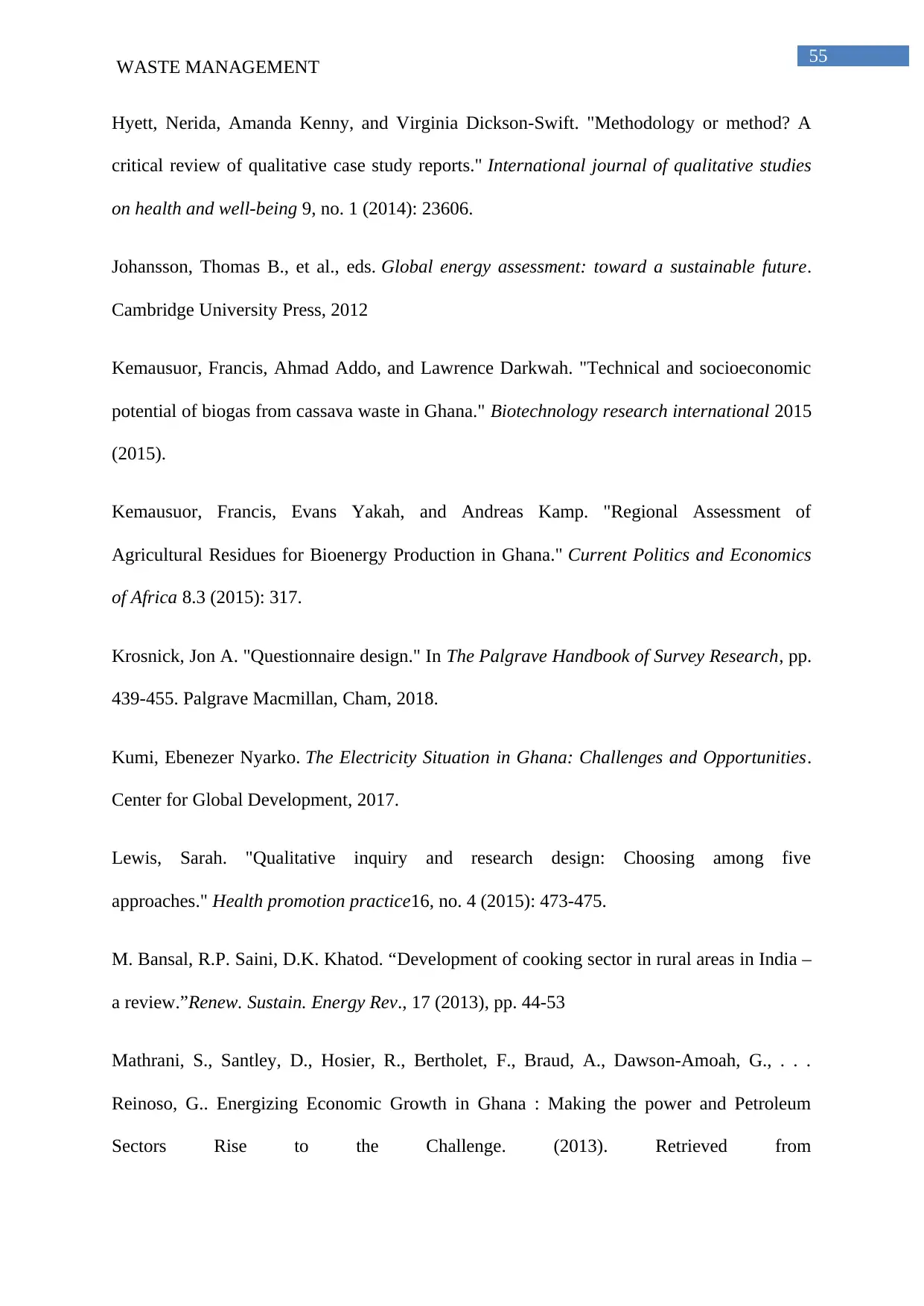
55
WASTE MANAGEMENT
Hyett, Nerida, Amanda Kenny, and Virginia Dickson-Swift. "Methodology or method? A
critical review of qualitative case study reports." International journal of qualitative studies
on health and well-being 9, no. 1 (2014): 23606.
Johansson, Thomas B., et al., eds. Global energy assessment: toward a sustainable future.
Cambridge University Press, 2012
Kemausuor, Francis, Ahmad Addo, and Lawrence Darkwah. "Technical and socioeconomic
potential of biogas from cassava waste in Ghana." Biotechnology research international 2015
(2015).
Kemausuor, Francis, Evans Yakah, and Andreas Kamp. "Regional Assessment of
Agricultural Residues for Bioenergy Production in Ghana." Current Politics and Economics
of Africa 8.3 (2015): 317.
Krosnick, Jon A. "Questionnaire design." In The Palgrave Handbook of Survey Research, pp.
439-455. Palgrave Macmillan, Cham, 2018.
Kumi, Ebenezer Nyarko. The Electricity Situation in Ghana: Challenges and Opportunities.
Center for Global Development, 2017.
Lewis, Sarah. "Qualitative inquiry and research design: Choosing among five
approaches." Health promotion practice16, no. 4 (2015): 473-475.
M. Bansal, R.P. Saini, D.K. Khatod. “Development of cooking sector in rural areas in India –
a review.”Renew. Sustain. Energy Rev., 17 (2013), pp. 44-53
Mathrani, S., Santley, D., Hosier, R., Bertholet, F., Braud, A., Dawson-Amoah, G., . . .
Reinoso, G.. Energizing Economic Growth in Ghana : Making the power and Petroleum
Sectors Rise to the Challenge. (2013). Retrieved from
WASTE MANAGEMENT
Hyett, Nerida, Amanda Kenny, and Virginia Dickson-Swift. "Methodology or method? A
critical review of qualitative case study reports." International journal of qualitative studies
on health and well-being 9, no. 1 (2014): 23606.
Johansson, Thomas B., et al., eds. Global energy assessment: toward a sustainable future.
Cambridge University Press, 2012
Kemausuor, Francis, Ahmad Addo, and Lawrence Darkwah. "Technical and socioeconomic
potential of biogas from cassava waste in Ghana." Biotechnology research international 2015
(2015).
Kemausuor, Francis, Evans Yakah, and Andreas Kamp. "Regional Assessment of
Agricultural Residues for Bioenergy Production in Ghana." Current Politics and Economics
of Africa 8.3 (2015): 317.
Krosnick, Jon A. "Questionnaire design." In The Palgrave Handbook of Survey Research, pp.
439-455. Palgrave Macmillan, Cham, 2018.
Kumi, Ebenezer Nyarko. The Electricity Situation in Ghana: Challenges and Opportunities.
Center for Global Development, 2017.
Lewis, Sarah. "Qualitative inquiry and research design: Choosing among five
approaches." Health promotion practice16, no. 4 (2015): 473-475.
M. Bansal, R.P. Saini, D.K. Khatod. “Development of cooking sector in rural areas in India –
a review.”Renew. Sustain. Energy Rev., 17 (2013), pp. 44-53
Mathrani, S., Santley, D., Hosier, R., Bertholet, F., Braud, A., Dawson-Amoah, G., . . .
Reinoso, G.. Energizing Economic Growth in Ghana : Making the power and Petroleum
Sectors Rise to the Challenge. (2013). Retrieved from
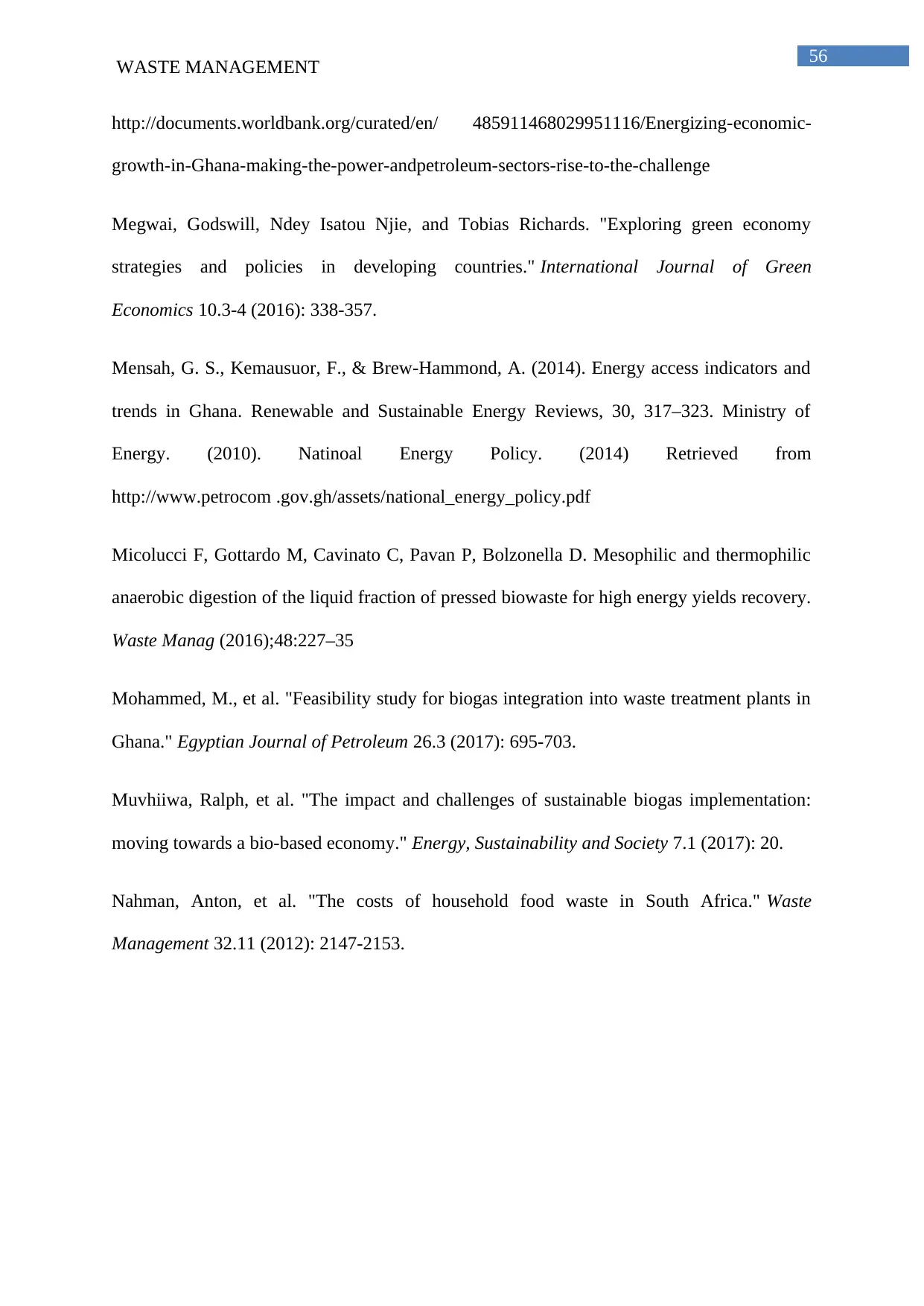
56
WASTE MANAGEMENT
http://documents.worldbank.org/curated/en/ 485911468029951116/Energizing-economic-
growth-in-Ghana-making-the-power-andpetroleum-sectors-rise-to-the-challenge
Megwai, Godswill, Ndey Isatou Njie, and Tobias Richards. "Exploring green economy
strategies and policies in developing countries." International Journal of Green
Economics 10.3-4 (2016): 338-357.
Mensah, G. S., Kemausuor, F., & Brew-Hammond, A. (2014). Energy access indicators and
trends in Ghana. Renewable and Sustainable Energy Reviews, 30, 317–323. Ministry of
Energy. (2010). Natinoal Energy Policy. (2014) Retrieved from
http://www.petrocom .gov.gh/assets/national_energy_policy.pdf
Micolucci F, Gottardo M, Cavinato C, Pavan P, Bolzonella D. Mesophilic and thermophilic
anaerobic digestion of the liquid fraction of pressed biowaste for high energy yields recovery.
Waste Manag (2016);48:227–35
Mohammed, M., et al. "Feasibility study for biogas integration into waste treatment plants in
Ghana." Egyptian Journal of Petroleum 26.3 (2017): 695-703.
Muvhiiwa, Ralph, et al. "The impact and challenges of sustainable biogas implementation:
moving towards a bio-based economy." Energy, Sustainability and Society 7.1 (2017): 20.
Nahman, Anton, et al. "The costs of household food waste in South Africa." Waste
Management 32.11 (2012): 2147-2153.
WASTE MANAGEMENT
http://documents.worldbank.org/curated/en/ 485911468029951116/Energizing-economic-
growth-in-Ghana-making-the-power-andpetroleum-sectors-rise-to-the-challenge
Megwai, Godswill, Ndey Isatou Njie, and Tobias Richards. "Exploring green economy
strategies and policies in developing countries." International Journal of Green
Economics 10.3-4 (2016): 338-357.
Mensah, G. S., Kemausuor, F., & Brew-Hammond, A. (2014). Energy access indicators and
trends in Ghana. Renewable and Sustainable Energy Reviews, 30, 317–323. Ministry of
Energy. (2010). Natinoal Energy Policy. (2014) Retrieved from
http://www.petrocom .gov.gh/assets/national_energy_policy.pdf
Micolucci F, Gottardo M, Cavinato C, Pavan P, Bolzonella D. Mesophilic and thermophilic
anaerobic digestion of the liquid fraction of pressed biowaste for high energy yields recovery.
Waste Manag (2016);48:227–35
Mohammed, M., et al. "Feasibility study for biogas integration into waste treatment plants in
Ghana." Egyptian Journal of Petroleum 26.3 (2017): 695-703.
Muvhiiwa, Ralph, et al. "The impact and challenges of sustainable biogas implementation:
moving towards a bio-based economy." Energy, Sustainability and Society 7.1 (2017): 20.
Nahman, Anton, et al. "The costs of household food waste in South Africa." Waste
Management 32.11 (2012): 2147-2153.
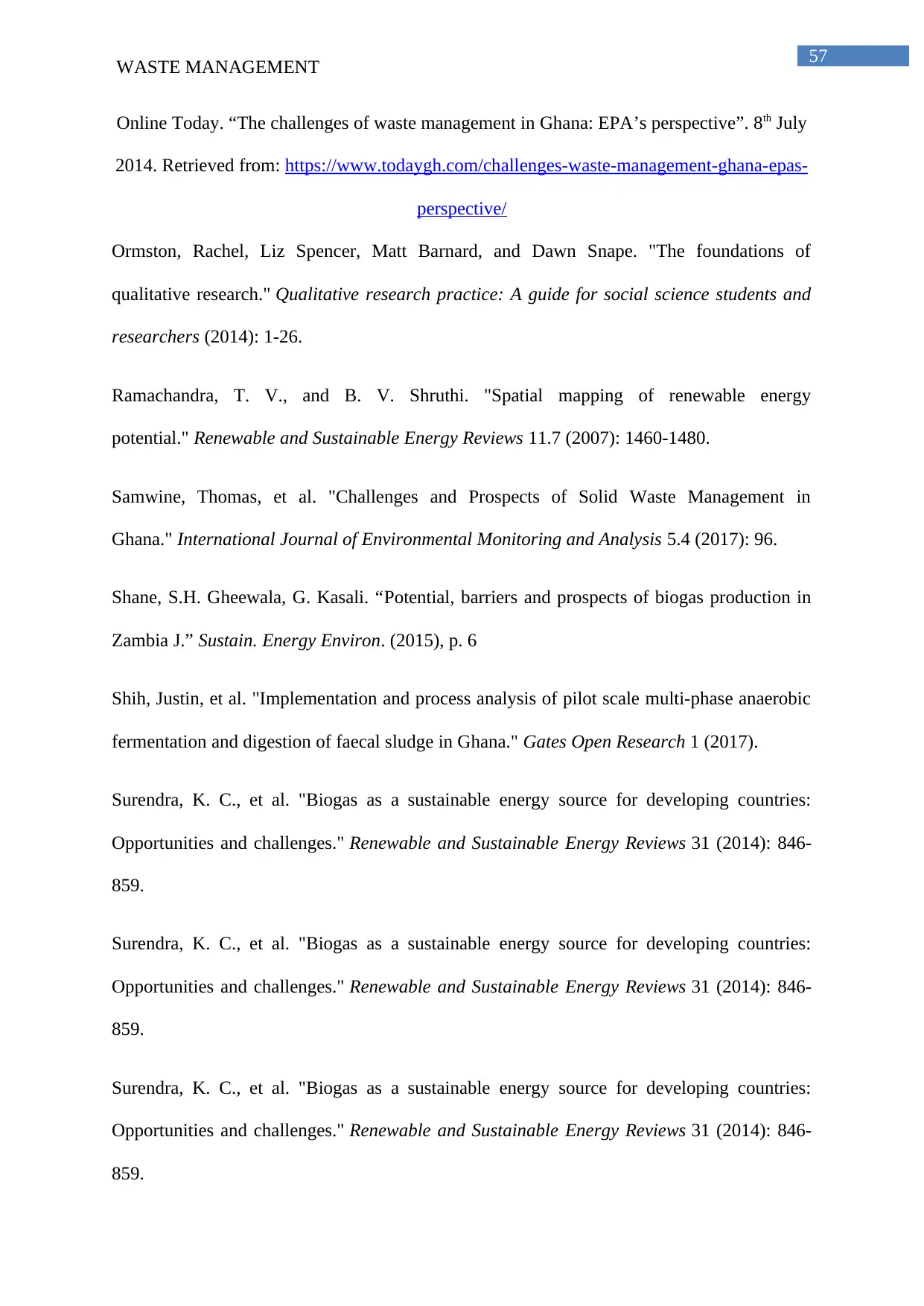
57
WASTE MANAGEMENT
Online Today. “The challenges of waste management in Ghana: EPA’s perspective”. 8th July
2014. Retrieved from: https://www.todaygh.com/challenges-waste-management-ghana-epas-
perspective/
Ormston, Rachel, Liz Spencer, Matt Barnard, and Dawn Snape. "The foundations of
qualitative research." Qualitative research practice: A guide for social science students and
researchers (2014): 1-26.
Ramachandra, T. V., and B. V. Shruthi. "Spatial mapping of renewable energy
potential." Renewable and Sustainable Energy Reviews 11.7 (2007): 1460-1480.
Samwine, Thomas, et al. "Challenges and Prospects of Solid Waste Management in
Ghana." International Journal of Environmental Monitoring and Analysis 5.4 (2017): 96.
Shane, S.H. Gheewala, G. Kasali. “Potential, barriers and prospects of biogas production in
Zambia J.” Sustain. Energy Environ. (2015), p. 6
Shih, Justin, et al. "Implementation and process analysis of pilot scale multi-phase anaerobic
fermentation and digestion of faecal sludge in Ghana." Gates Open Research 1 (2017).
Surendra, K. C., et al. "Biogas as a sustainable energy source for developing countries:
Opportunities and challenges." Renewable and Sustainable Energy Reviews 31 (2014): 846-
859.
Surendra, K. C., et al. "Biogas as a sustainable energy source for developing countries:
Opportunities and challenges." Renewable and Sustainable Energy Reviews 31 (2014): 846-
859.
Surendra, K. C., et al. "Biogas as a sustainable energy source for developing countries:
Opportunities and challenges." Renewable and Sustainable Energy Reviews 31 (2014): 846-
859.
WASTE MANAGEMENT
Online Today. “The challenges of waste management in Ghana: EPA’s perspective”. 8th July
2014. Retrieved from: https://www.todaygh.com/challenges-waste-management-ghana-epas-
perspective/
Ormston, Rachel, Liz Spencer, Matt Barnard, and Dawn Snape. "The foundations of
qualitative research." Qualitative research practice: A guide for social science students and
researchers (2014): 1-26.
Ramachandra, T. V., and B. V. Shruthi. "Spatial mapping of renewable energy
potential." Renewable and Sustainable Energy Reviews 11.7 (2007): 1460-1480.
Samwine, Thomas, et al. "Challenges and Prospects of Solid Waste Management in
Ghana." International Journal of Environmental Monitoring and Analysis 5.4 (2017): 96.
Shane, S.H. Gheewala, G. Kasali. “Potential, barriers and prospects of biogas production in
Zambia J.” Sustain. Energy Environ. (2015), p. 6
Shih, Justin, et al. "Implementation and process analysis of pilot scale multi-phase anaerobic
fermentation and digestion of faecal sludge in Ghana." Gates Open Research 1 (2017).
Surendra, K. C., et al. "Biogas as a sustainable energy source for developing countries:
Opportunities and challenges." Renewable and Sustainable Energy Reviews 31 (2014): 846-
859.
Surendra, K. C., et al. "Biogas as a sustainable energy source for developing countries:
Opportunities and challenges." Renewable and Sustainable Energy Reviews 31 (2014): 846-
859.
Surendra, K. C., et al. "Biogas as a sustainable energy source for developing countries:
Opportunities and challenges." Renewable and Sustainable Energy Reviews 31 (2014): 846-
859.
Secure Best Marks with AI Grader
Need help grading? Try our AI Grader for instant feedback on your assignments.
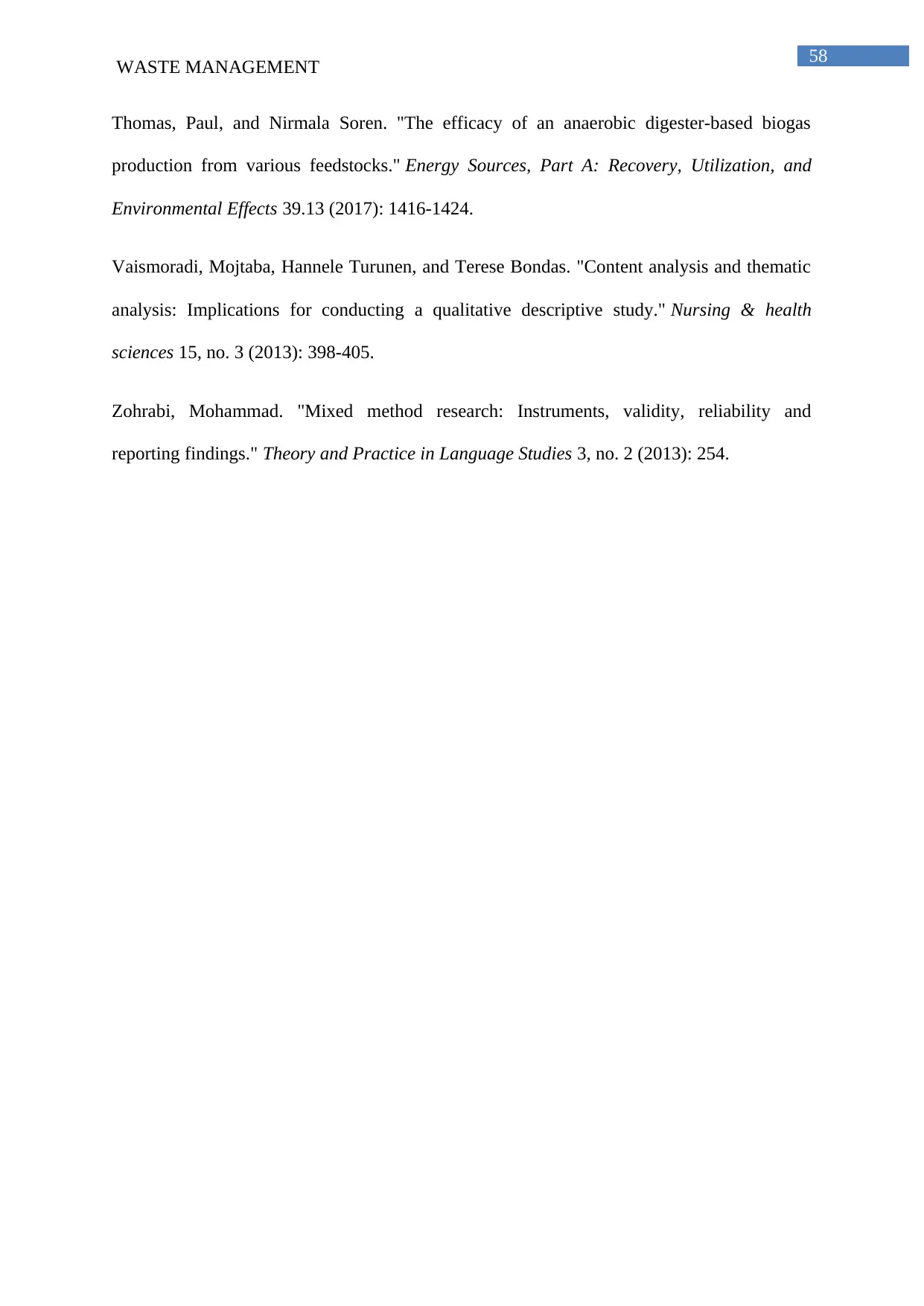
58
WASTE MANAGEMENT
Thomas, Paul, and Nirmala Soren. "The efficacy of an anaerobic digester-based biogas
production from various feedstocks." Energy Sources, Part A: Recovery, Utilization, and
Environmental Effects 39.13 (2017): 1416-1424.
Vaismoradi, Mojtaba, Hannele Turunen, and Terese Bondas. "Content analysis and thematic
analysis: Implications for conducting a qualitative descriptive study." Nursing & health
sciences 15, no. 3 (2013): 398-405.
Zohrabi, Mohammad. "Mixed method research: Instruments, validity, reliability and
reporting findings." Theory and Practice in Language Studies 3, no. 2 (2013): 254.
WASTE MANAGEMENT
Thomas, Paul, and Nirmala Soren. "The efficacy of an anaerobic digester-based biogas
production from various feedstocks." Energy Sources, Part A: Recovery, Utilization, and
Environmental Effects 39.13 (2017): 1416-1424.
Vaismoradi, Mojtaba, Hannele Turunen, and Terese Bondas. "Content analysis and thematic
analysis: Implications for conducting a qualitative descriptive study." Nursing & health
sciences 15, no. 3 (2013): 398-405.
Zohrabi, Mohammad. "Mixed method research: Instruments, validity, reliability and
reporting findings." Theory and Practice in Language Studies 3, no. 2 (2013): 254.

59
WASTE MANAGEMENT
WASTE MANAGEMENT

60
WASTE MANAGEMENT
WASTE MANAGEMENT
1 out of 61
Related Documents
Your All-in-One AI-Powered Toolkit for Academic Success.
+13062052269
info@desklib.com
Available 24*7 on WhatsApp / Email
![[object Object]](/_next/static/media/star-bottom.7253800d.svg)
Unlock your academic potential
© 2024 | Zucol Services PVT LTD | All rights reserved.



